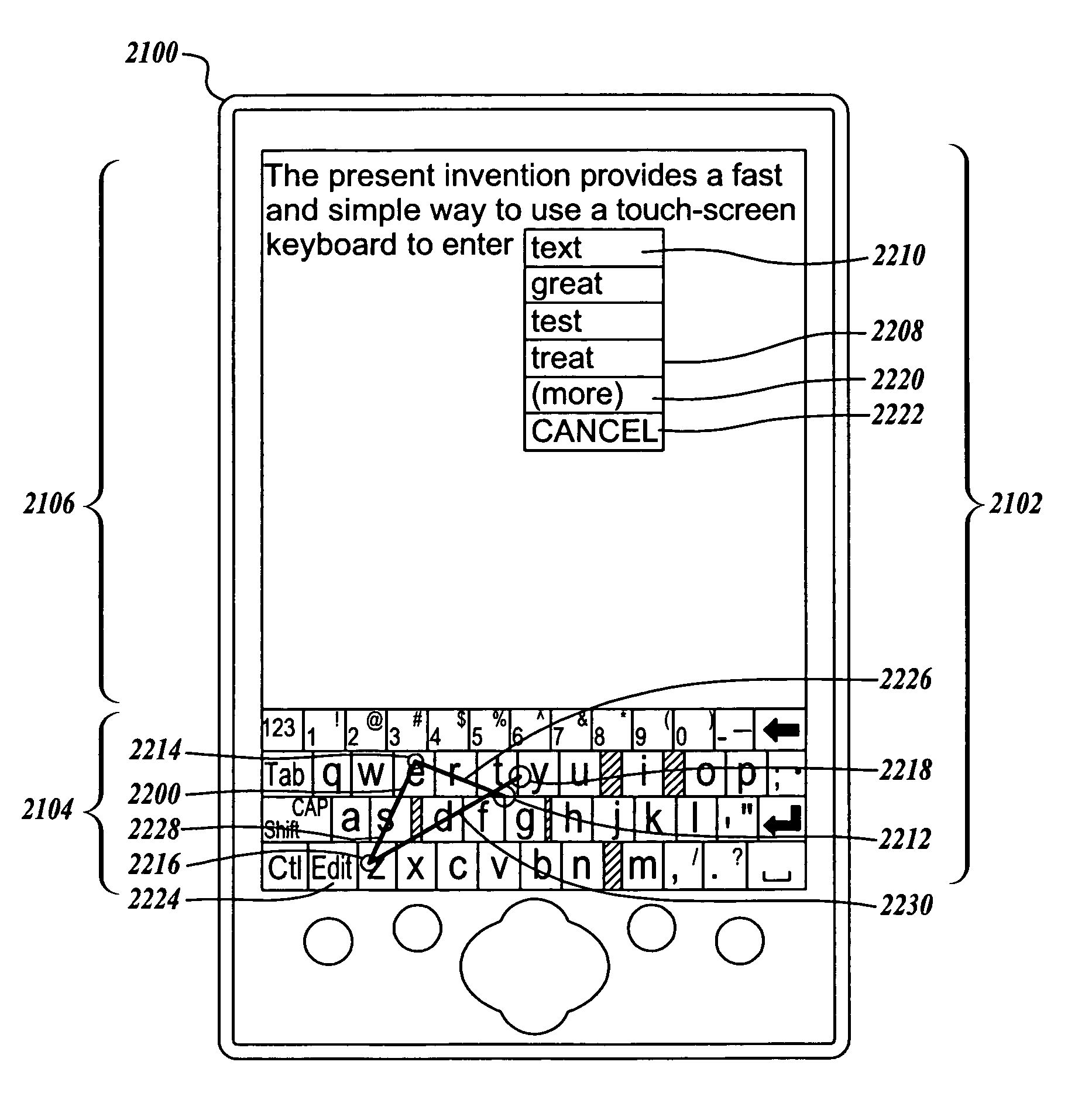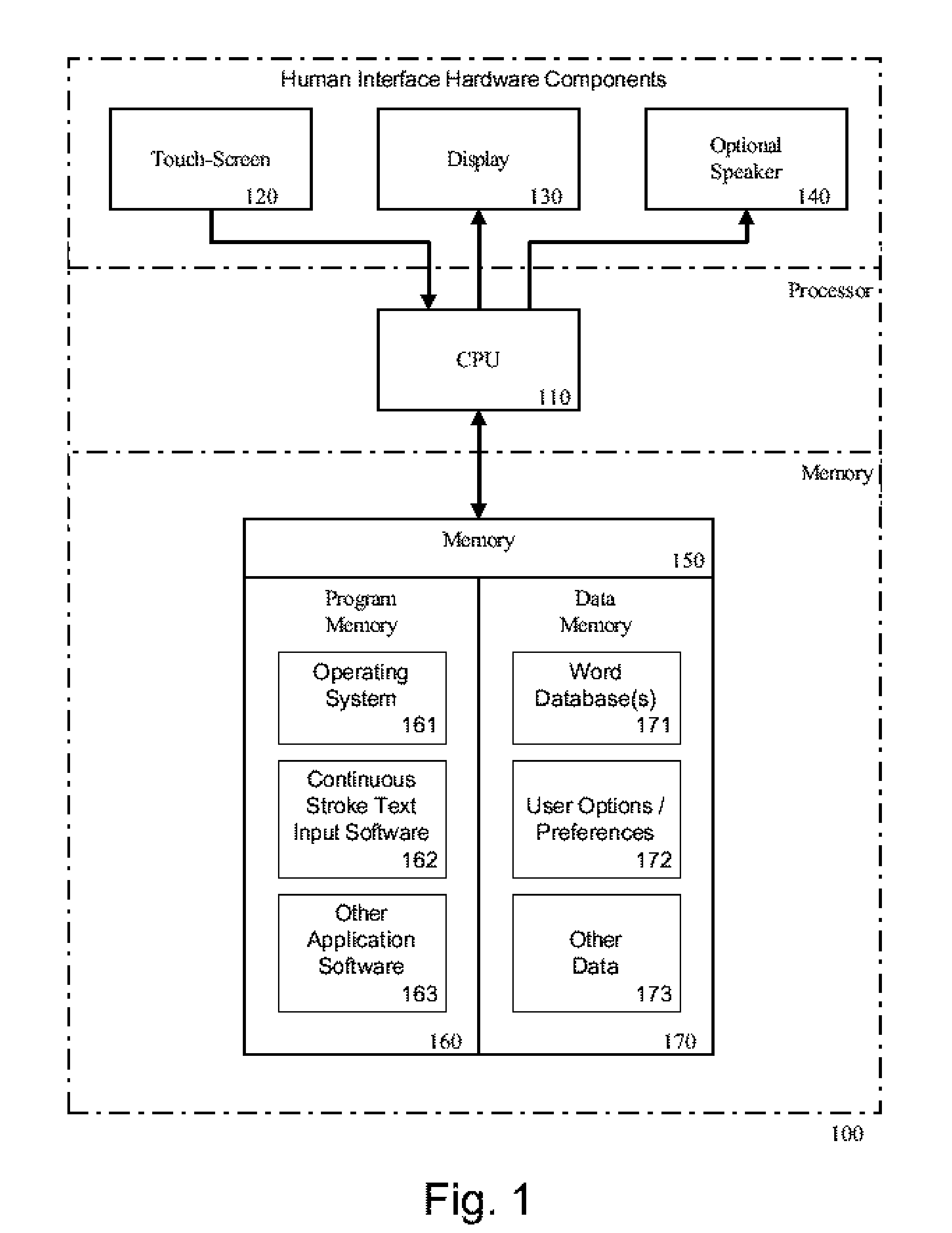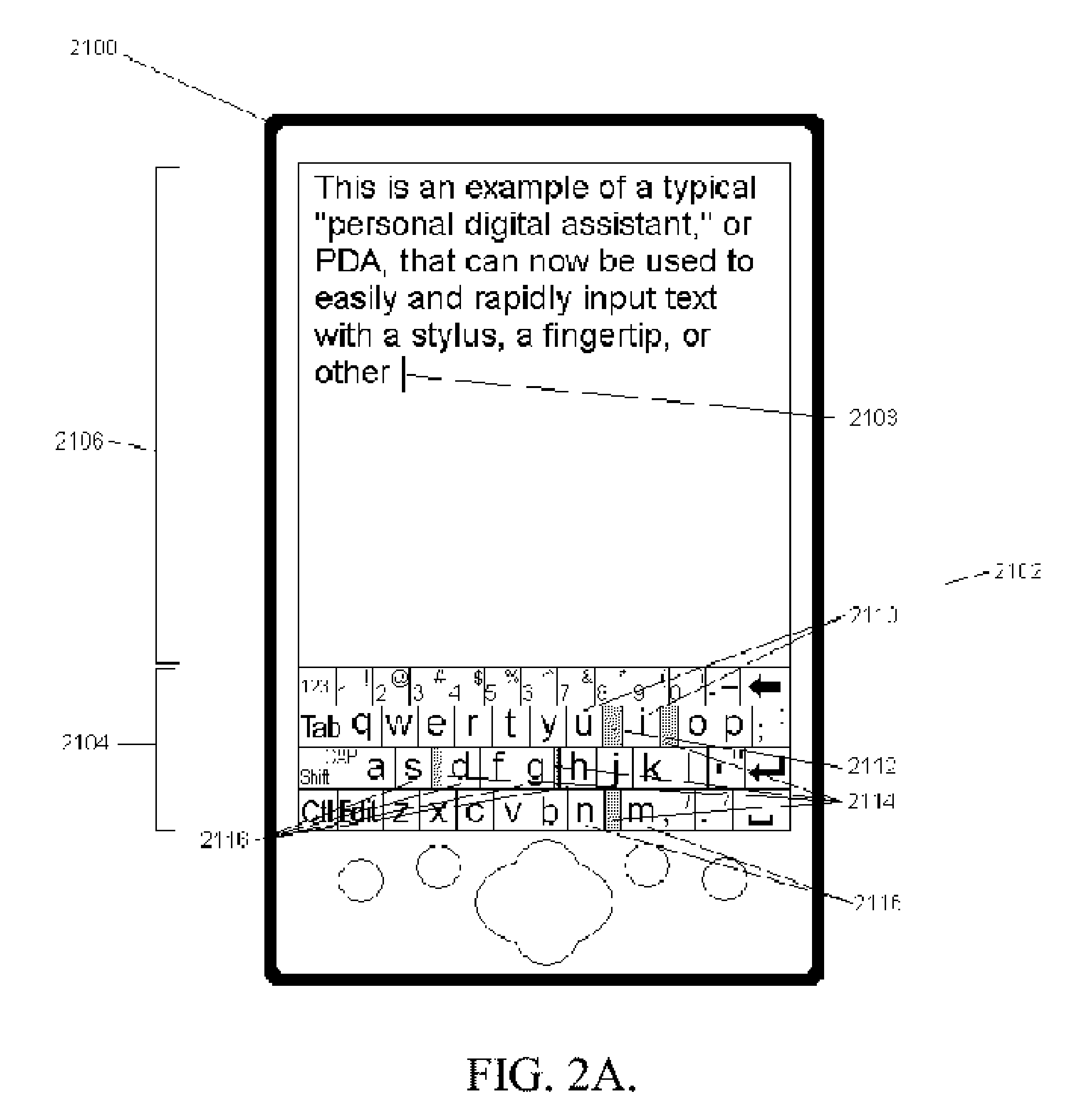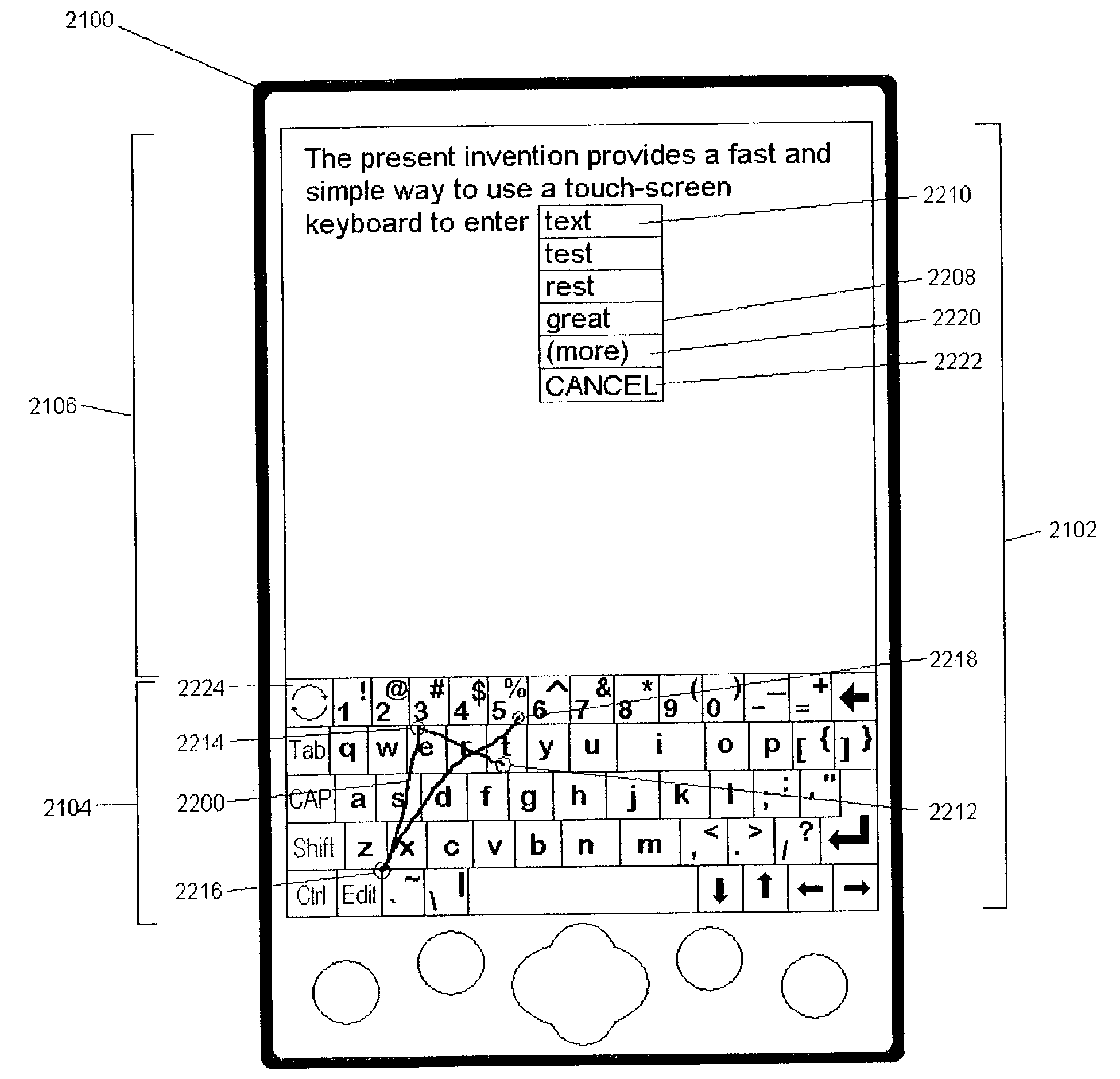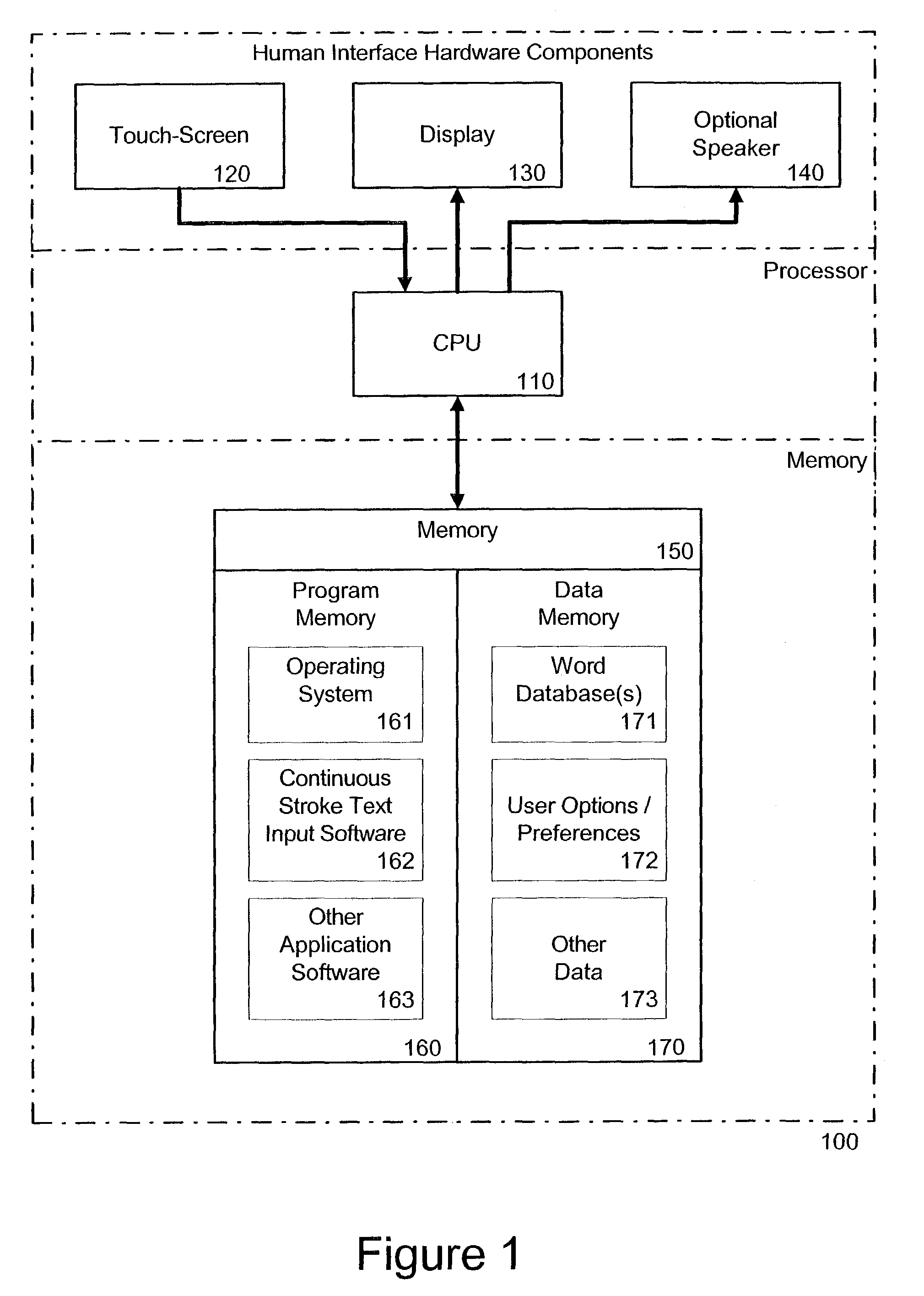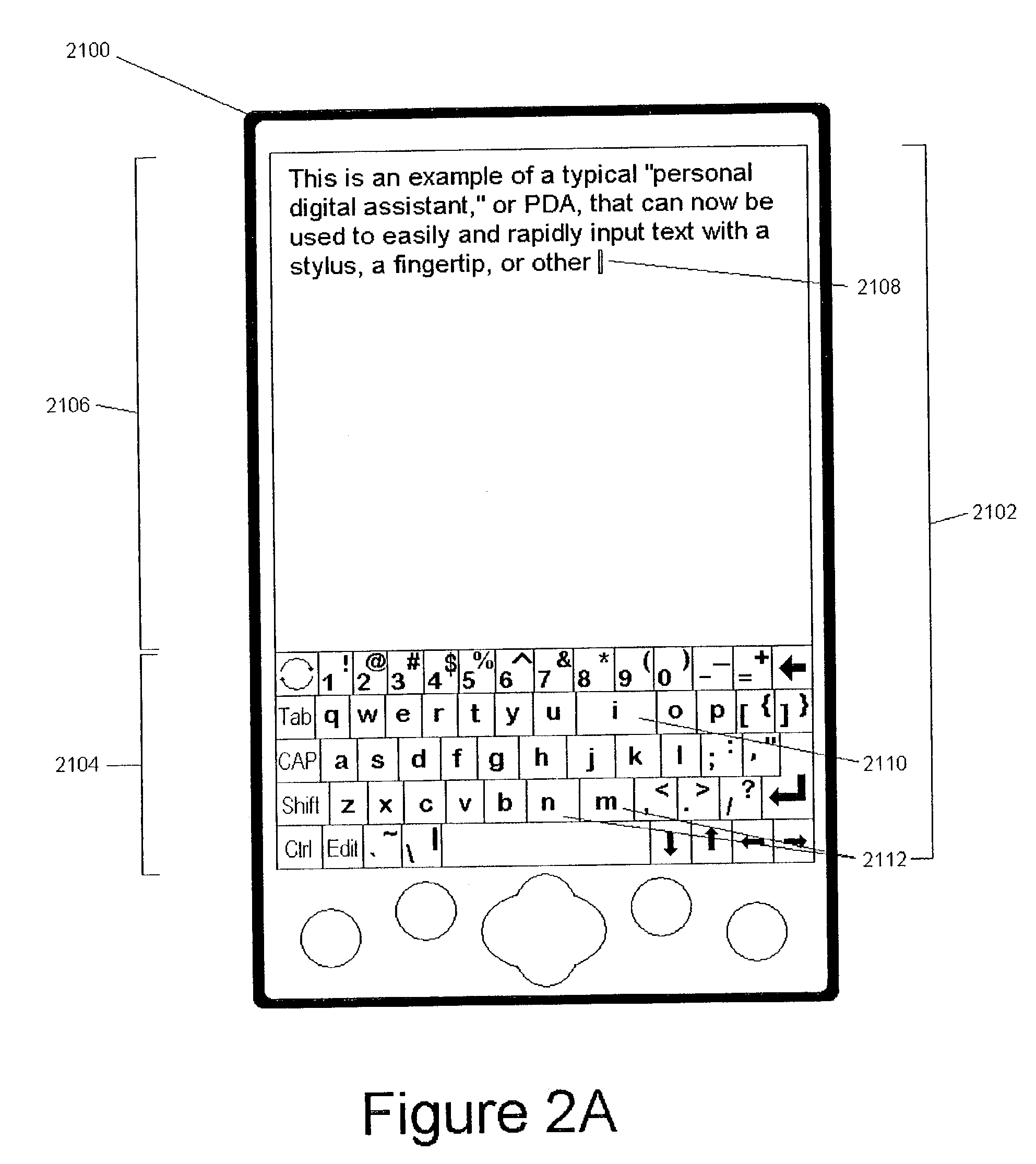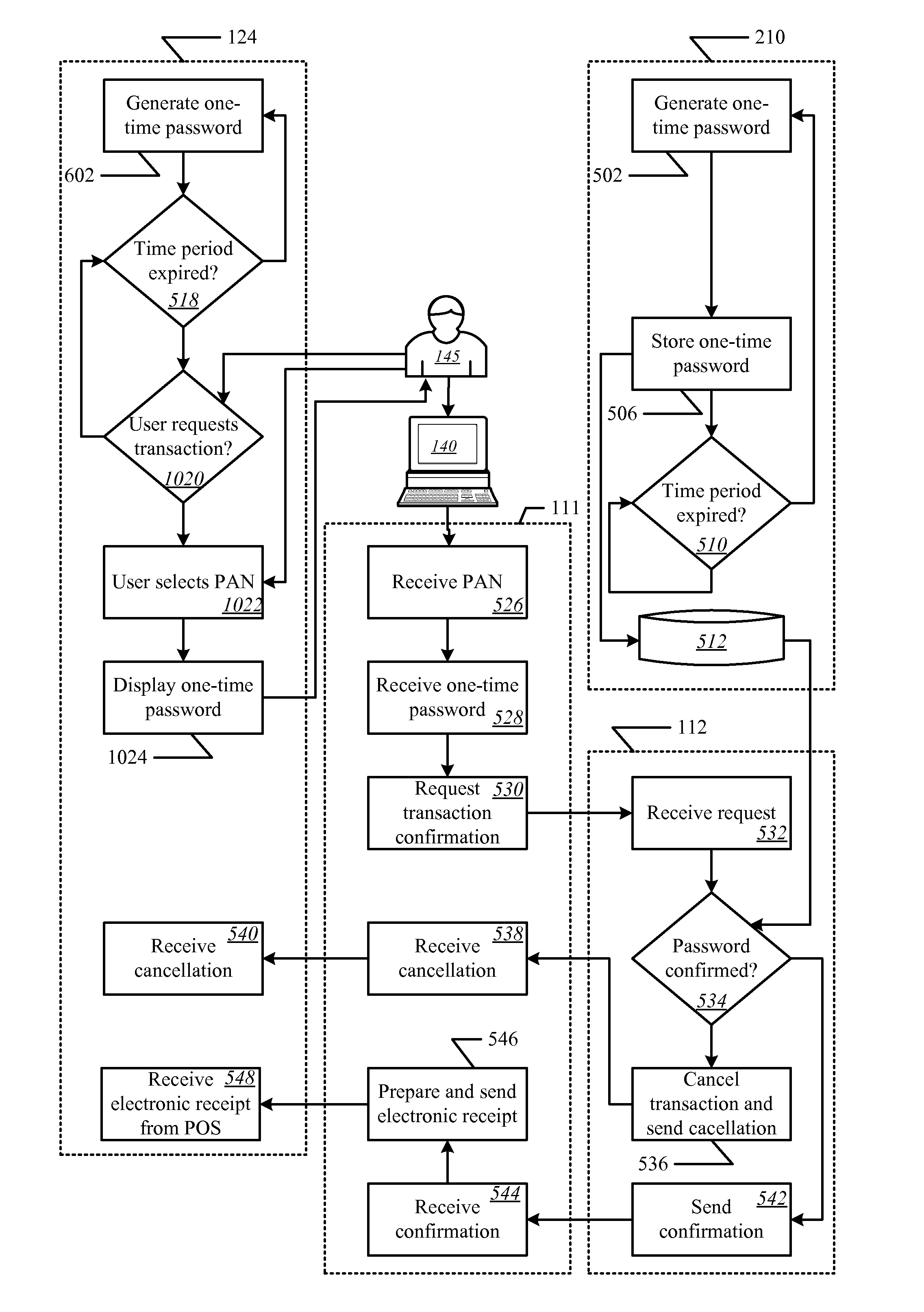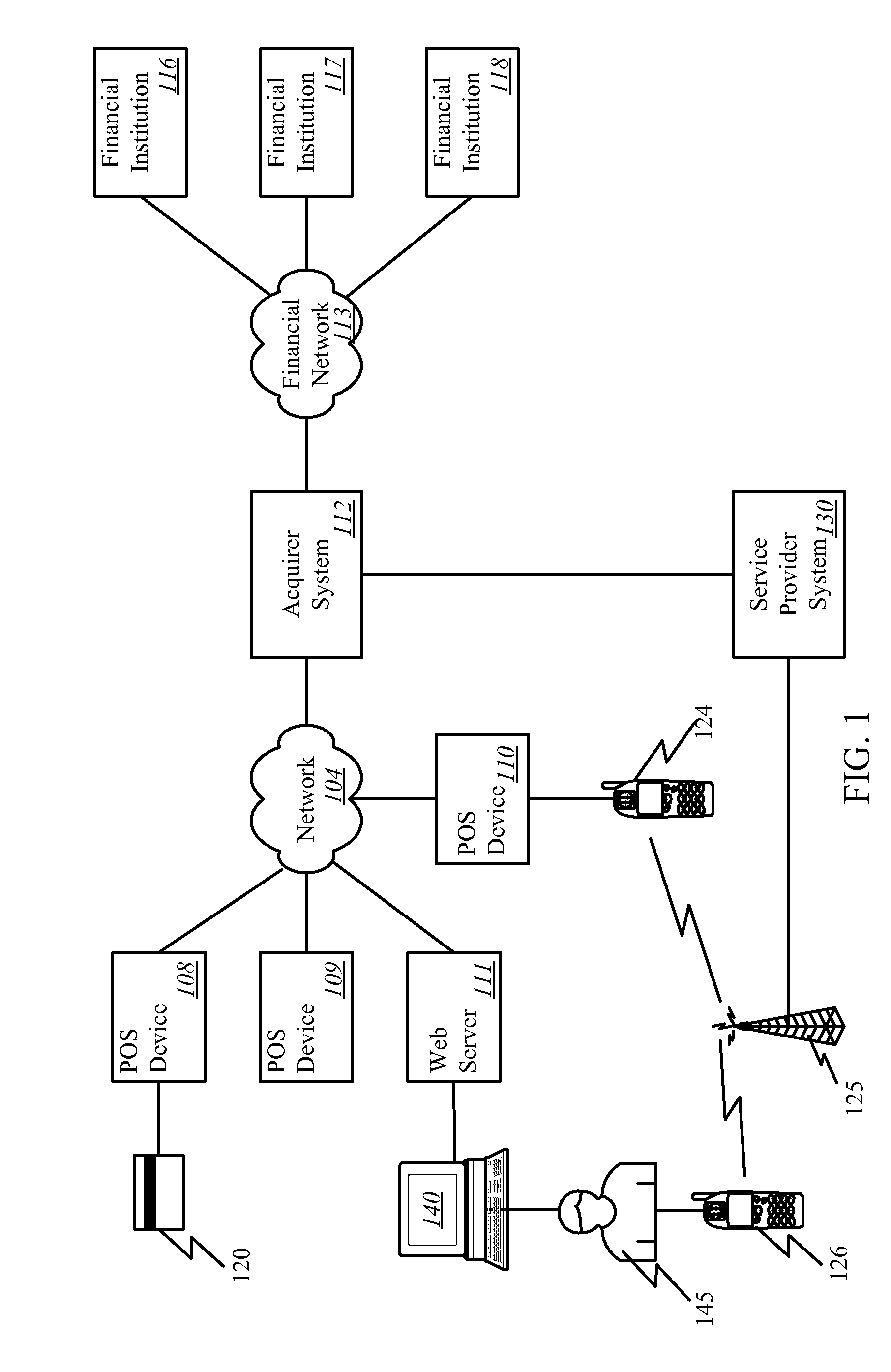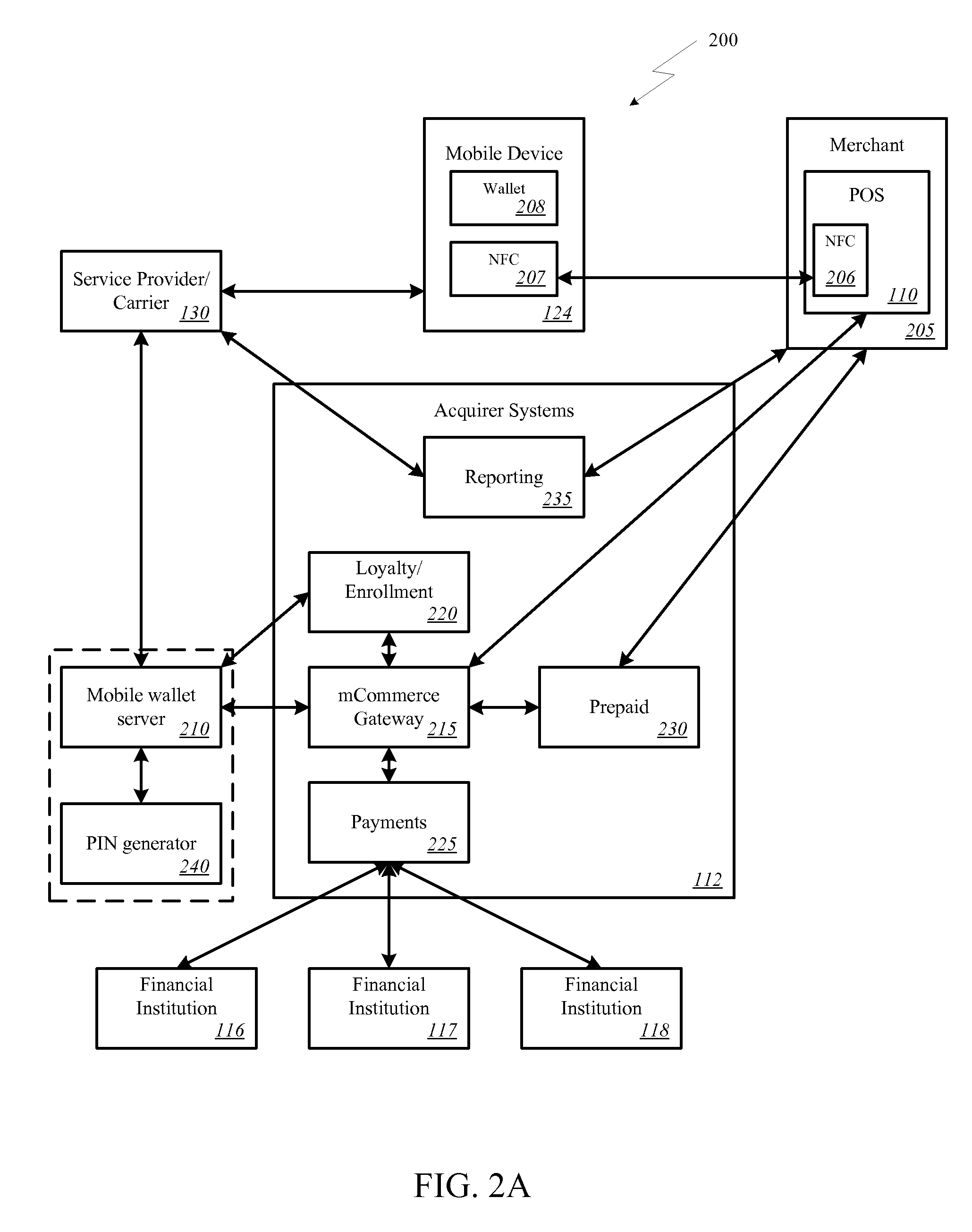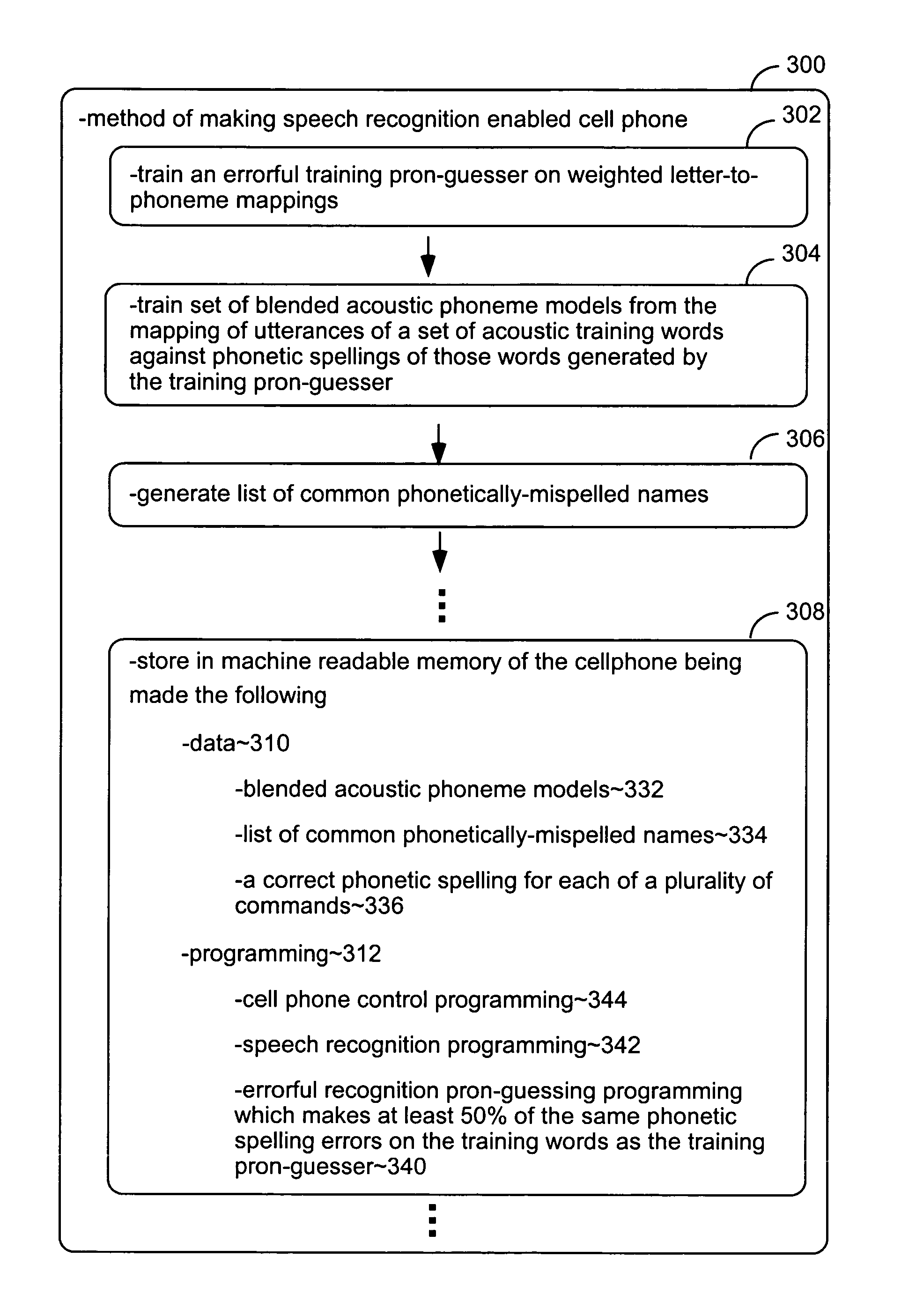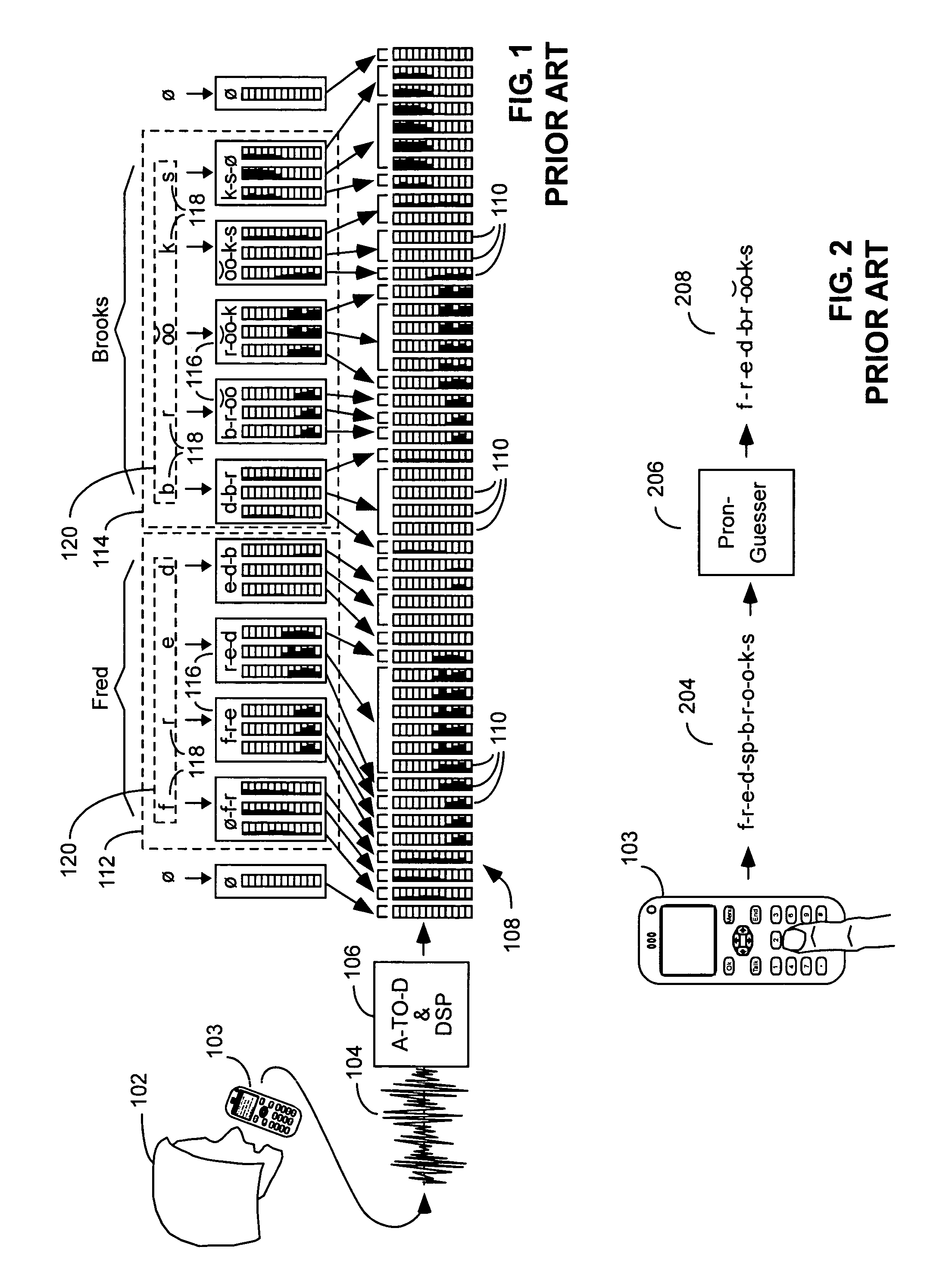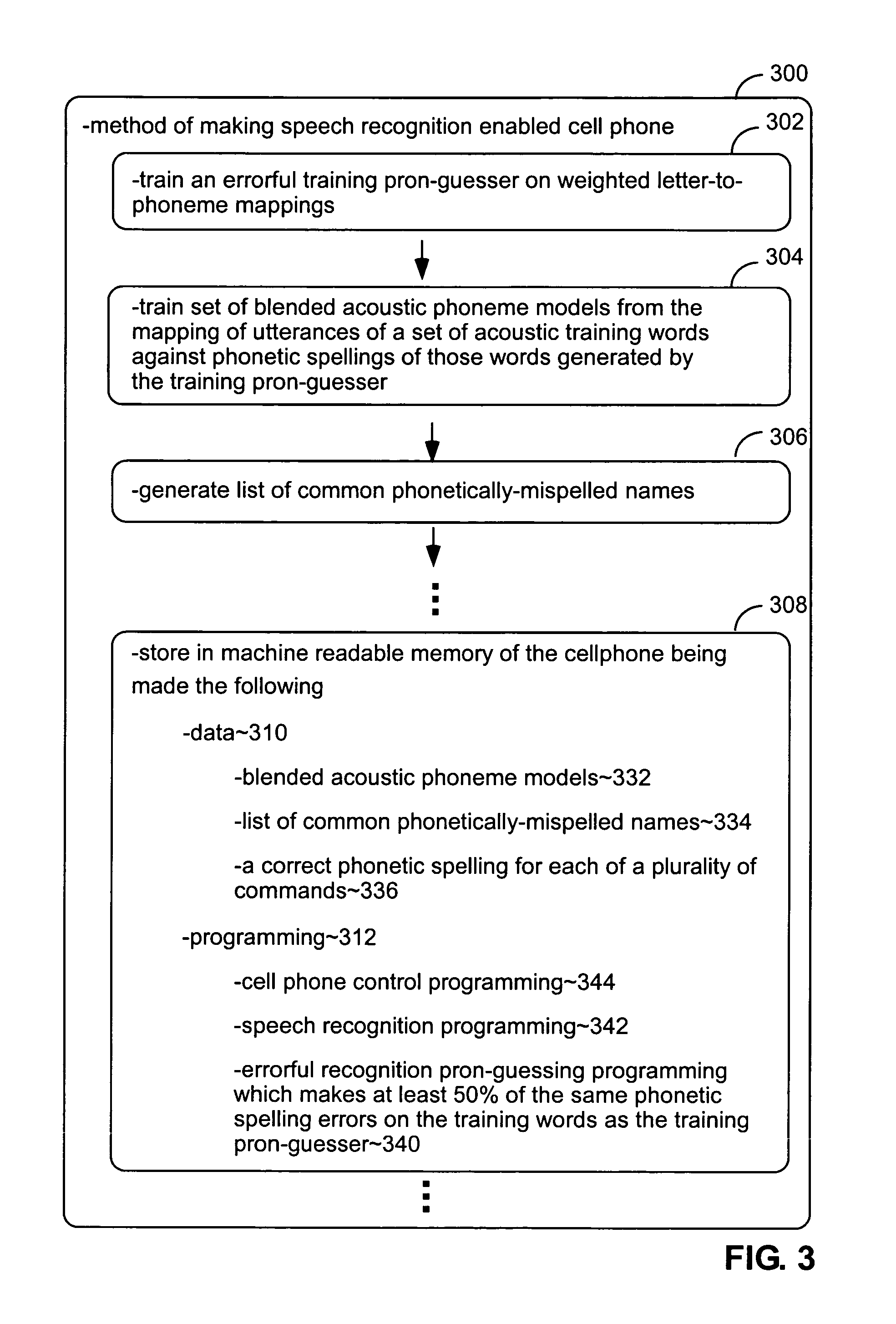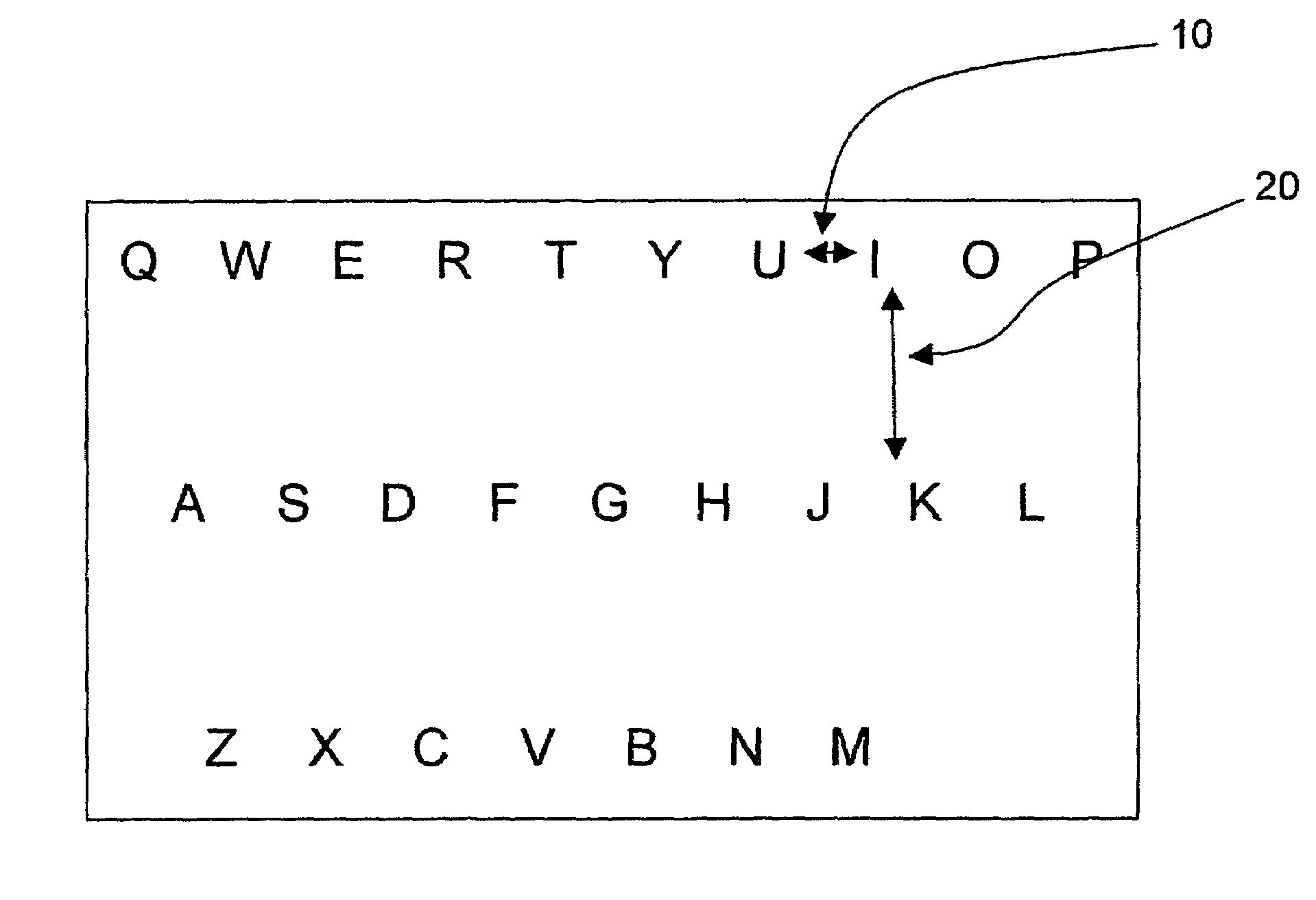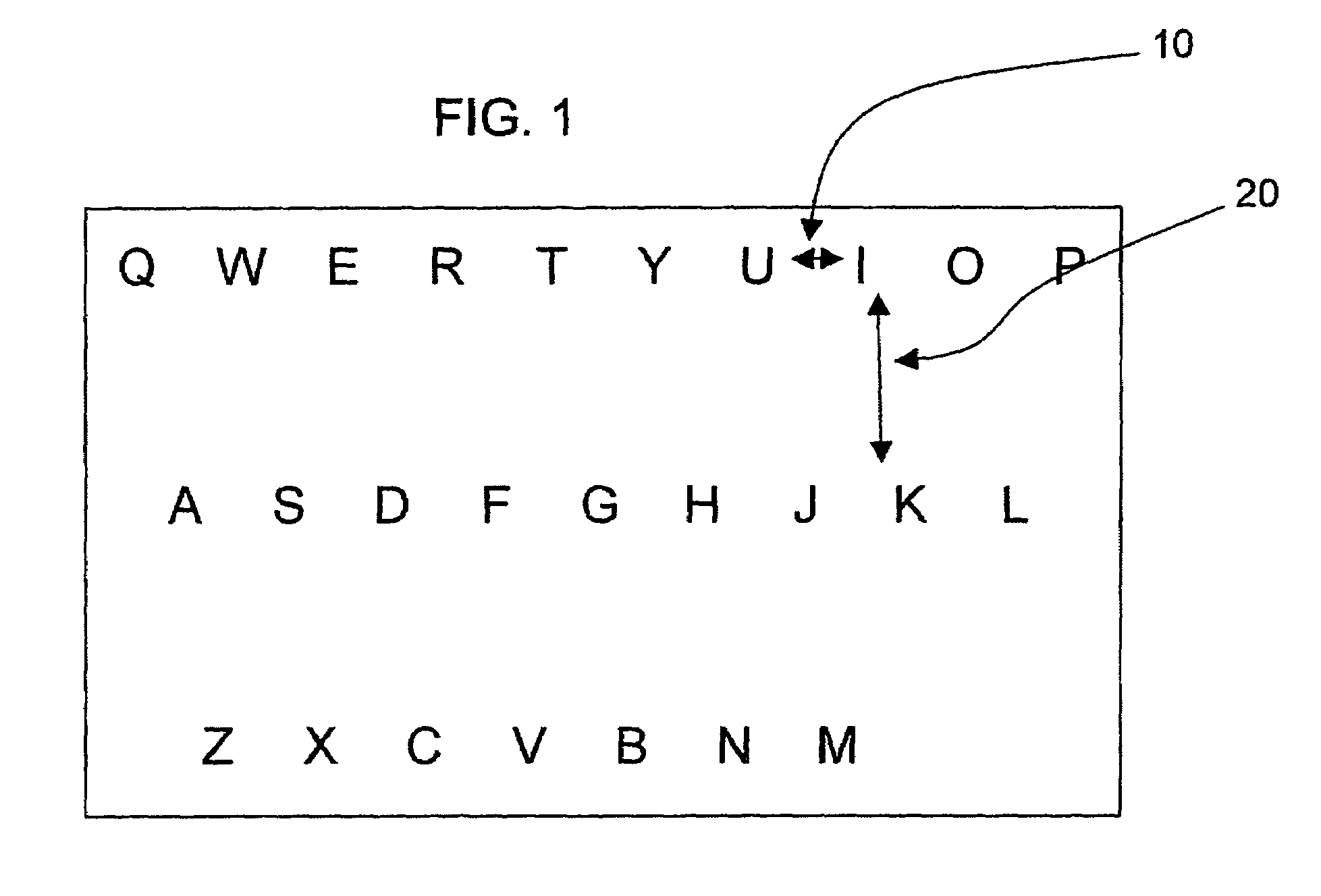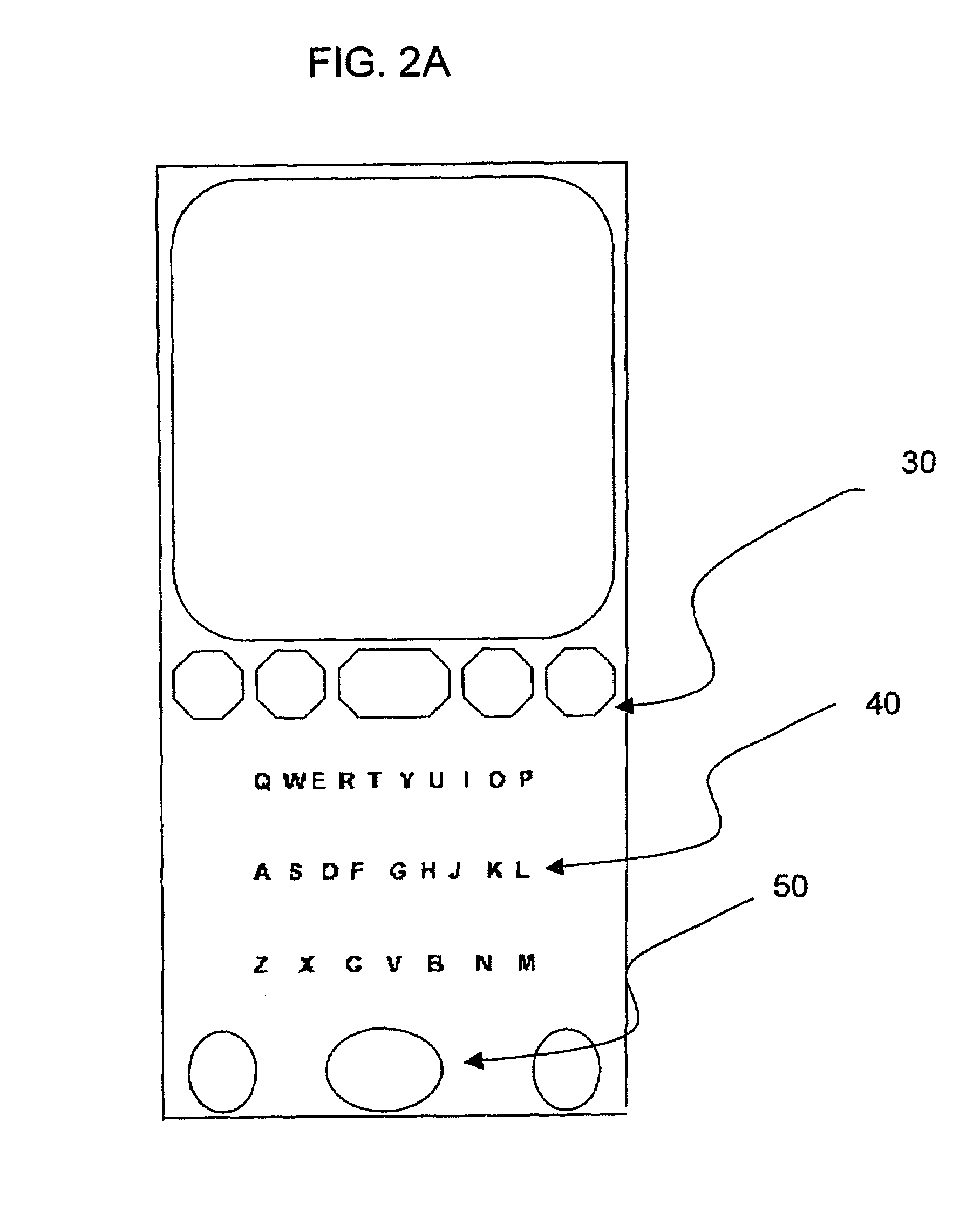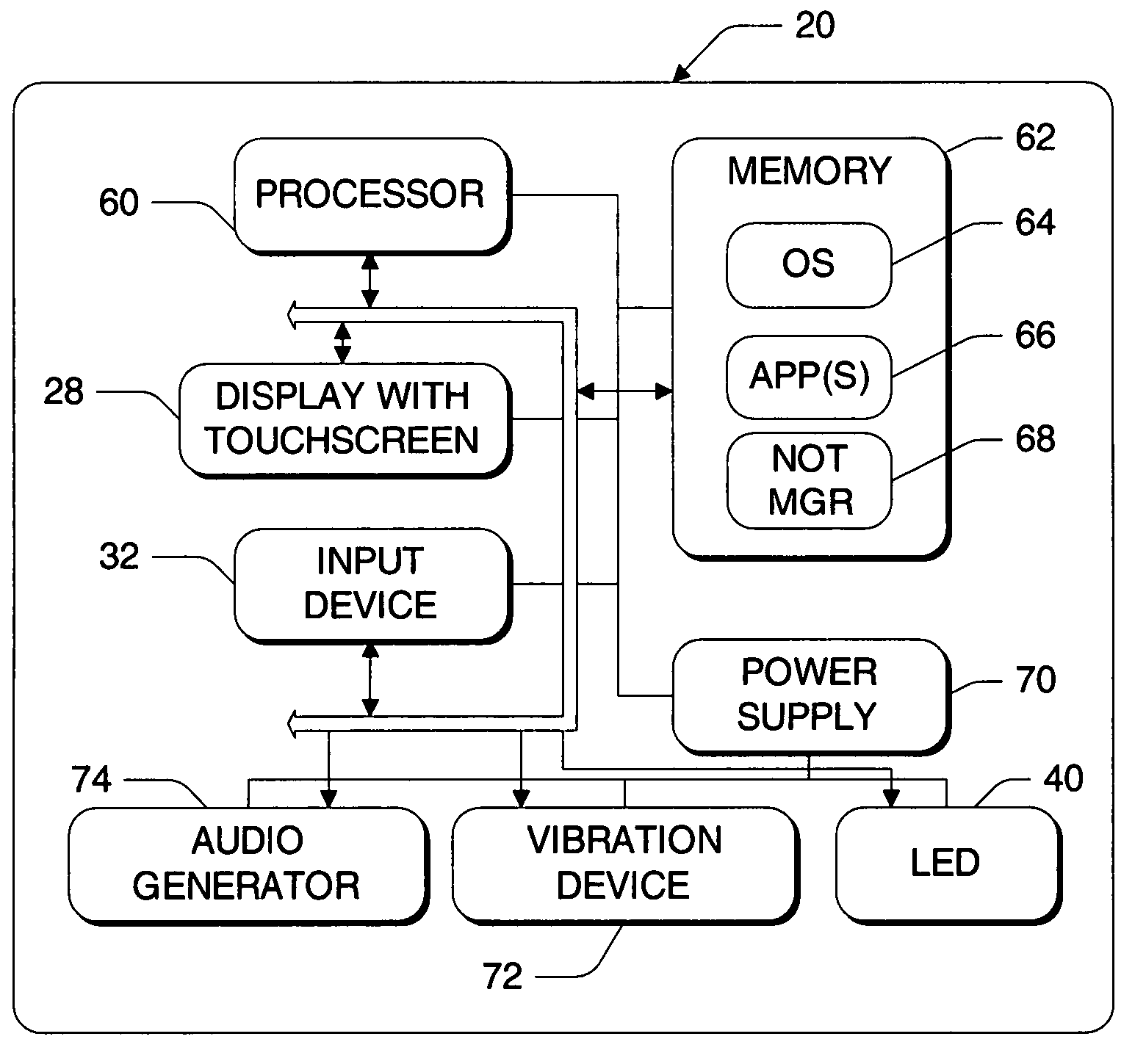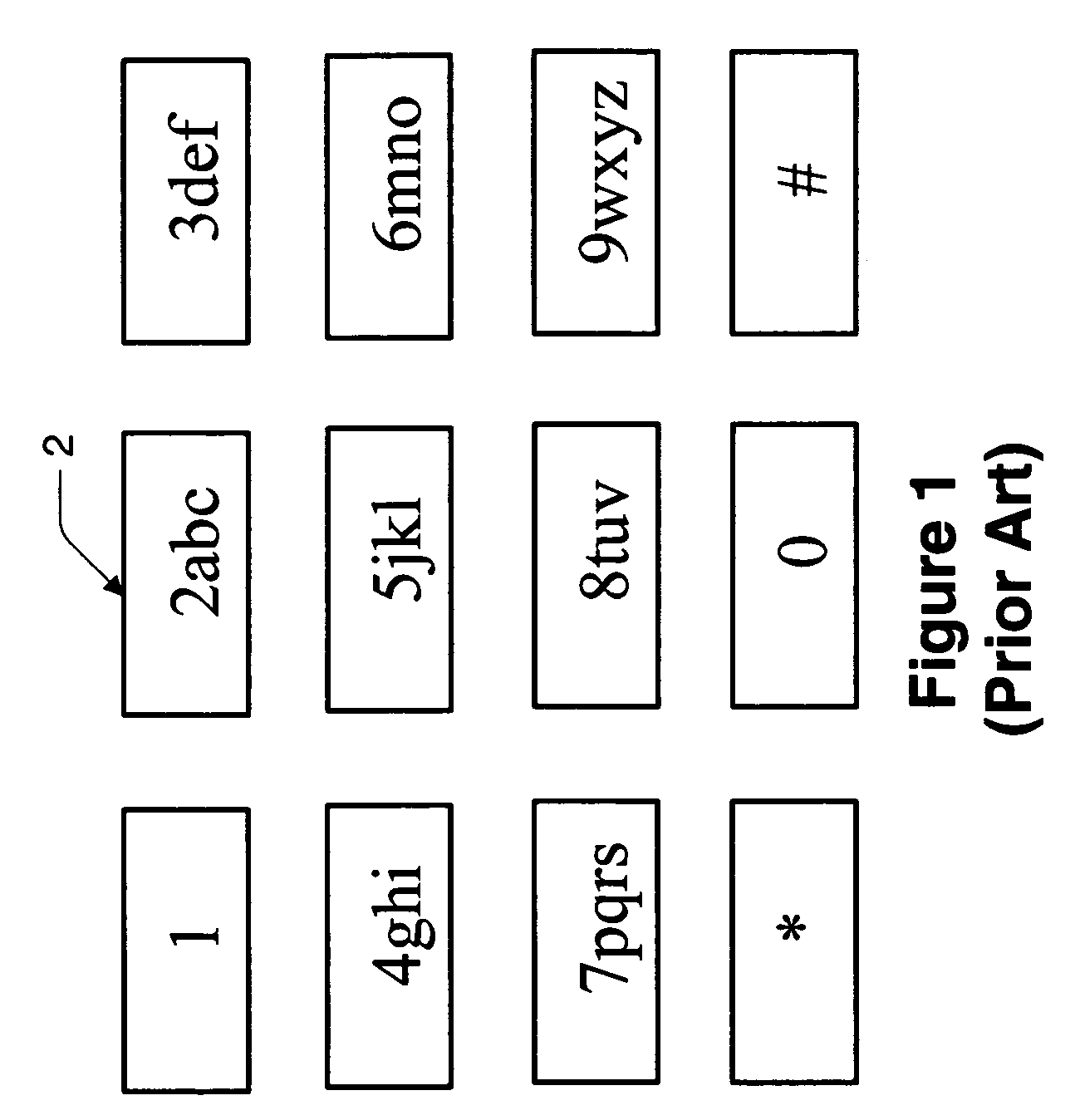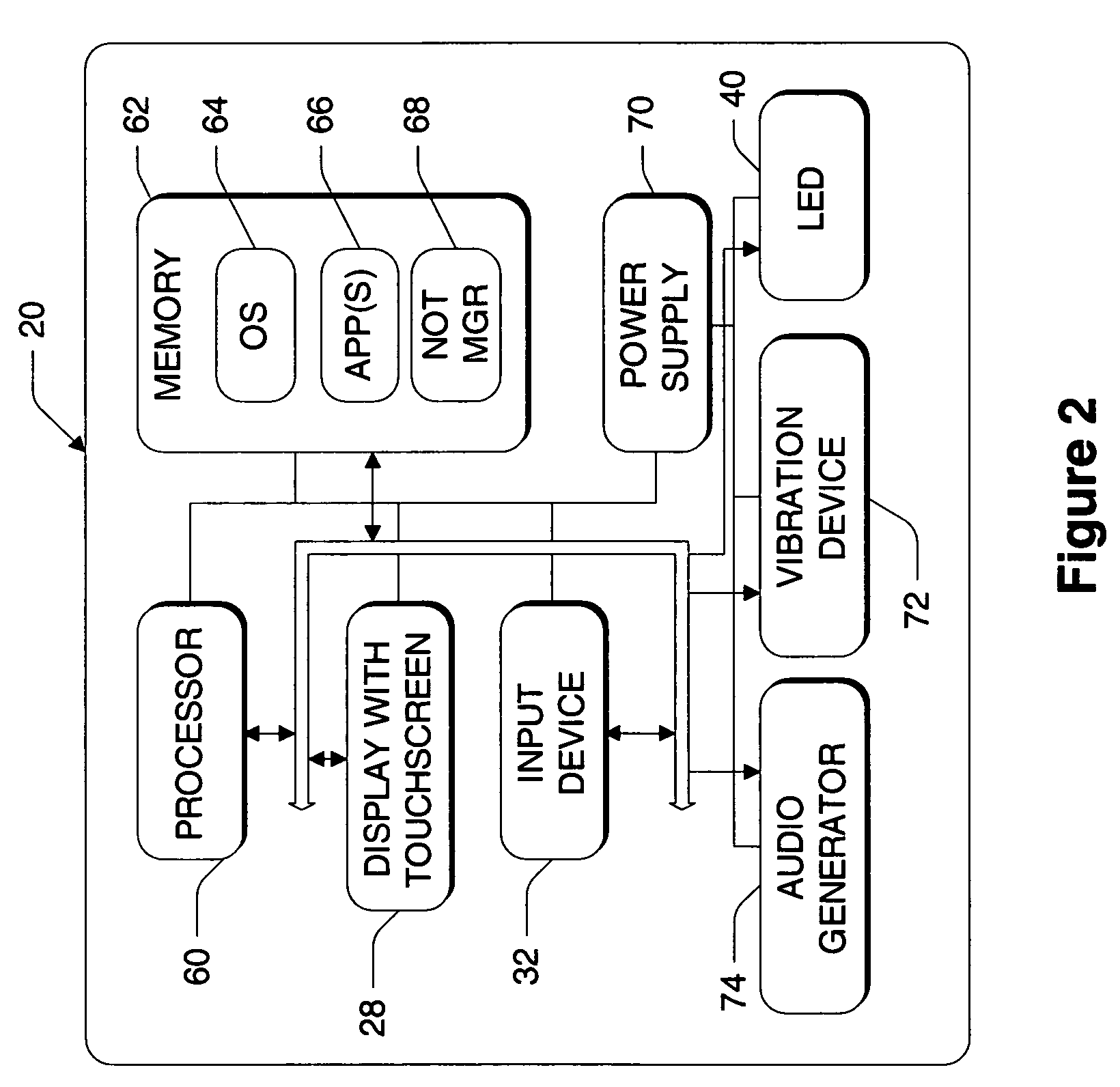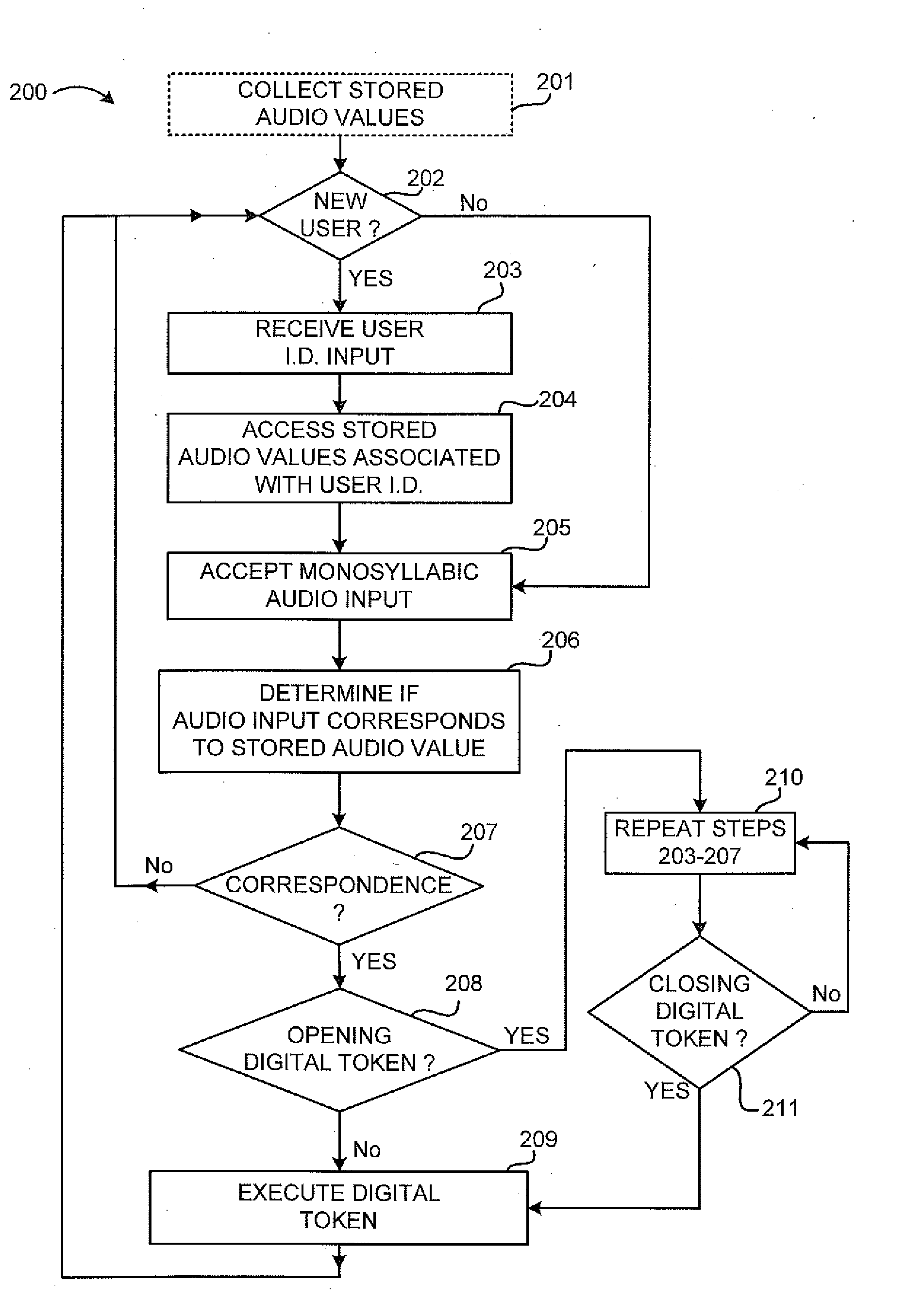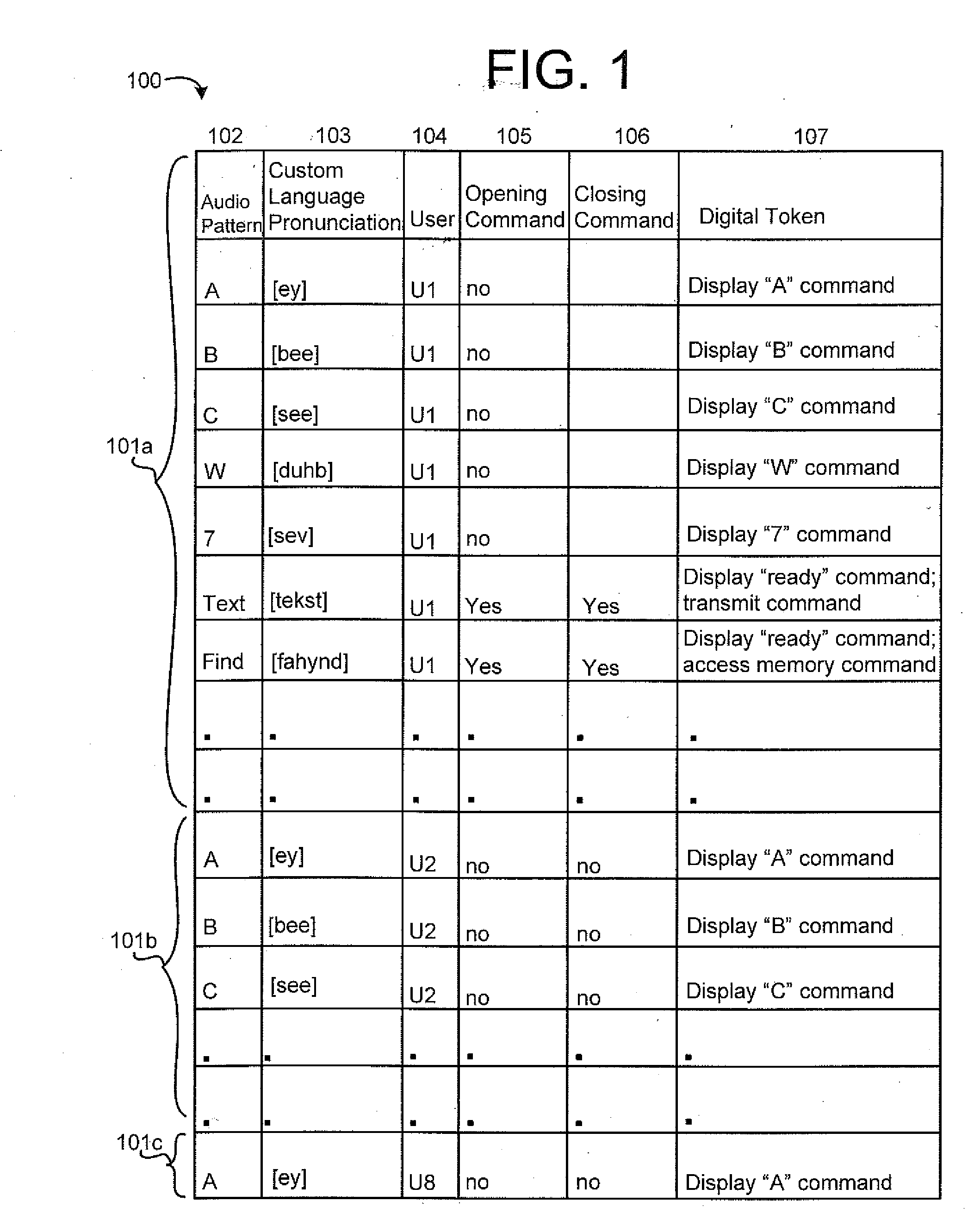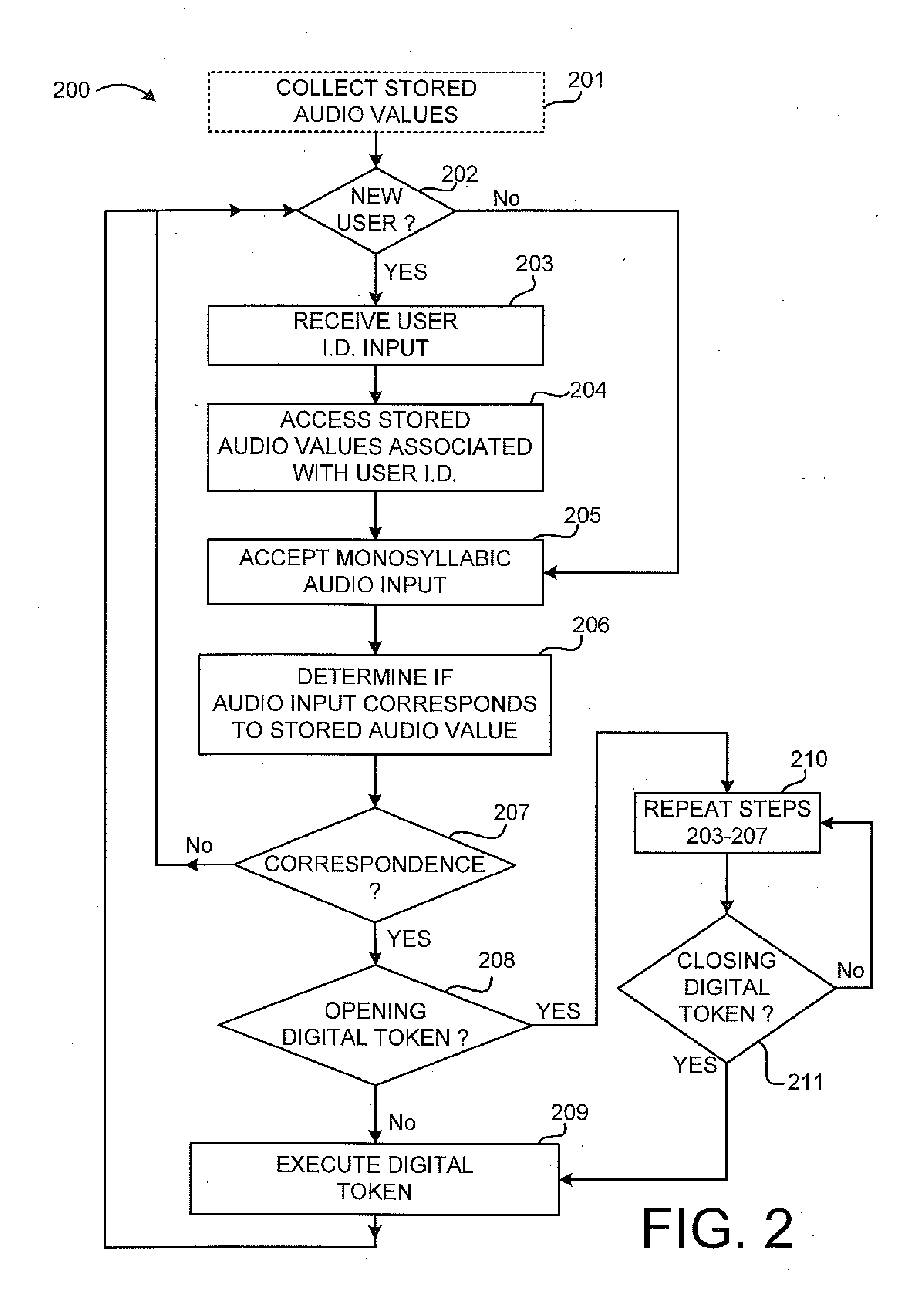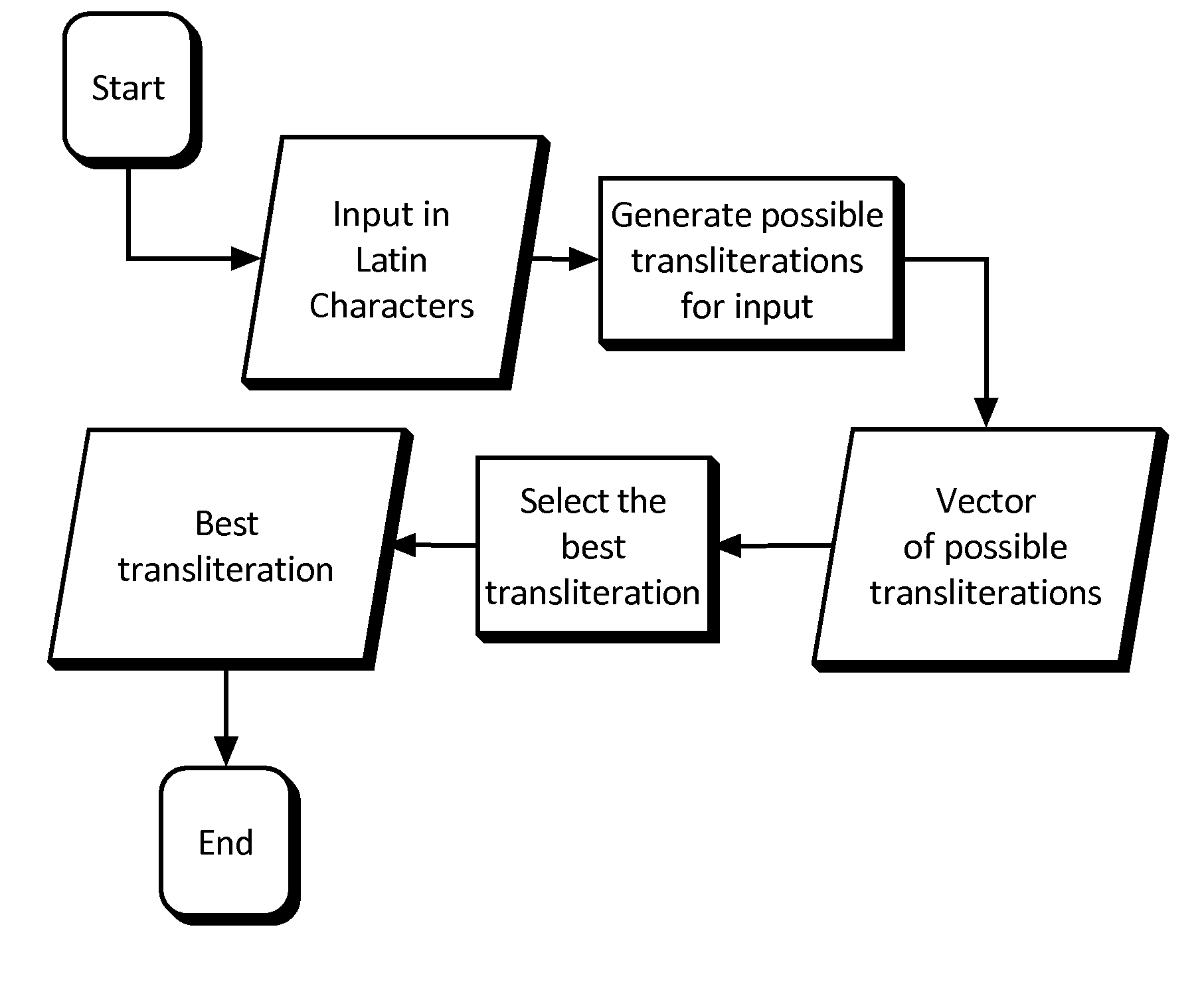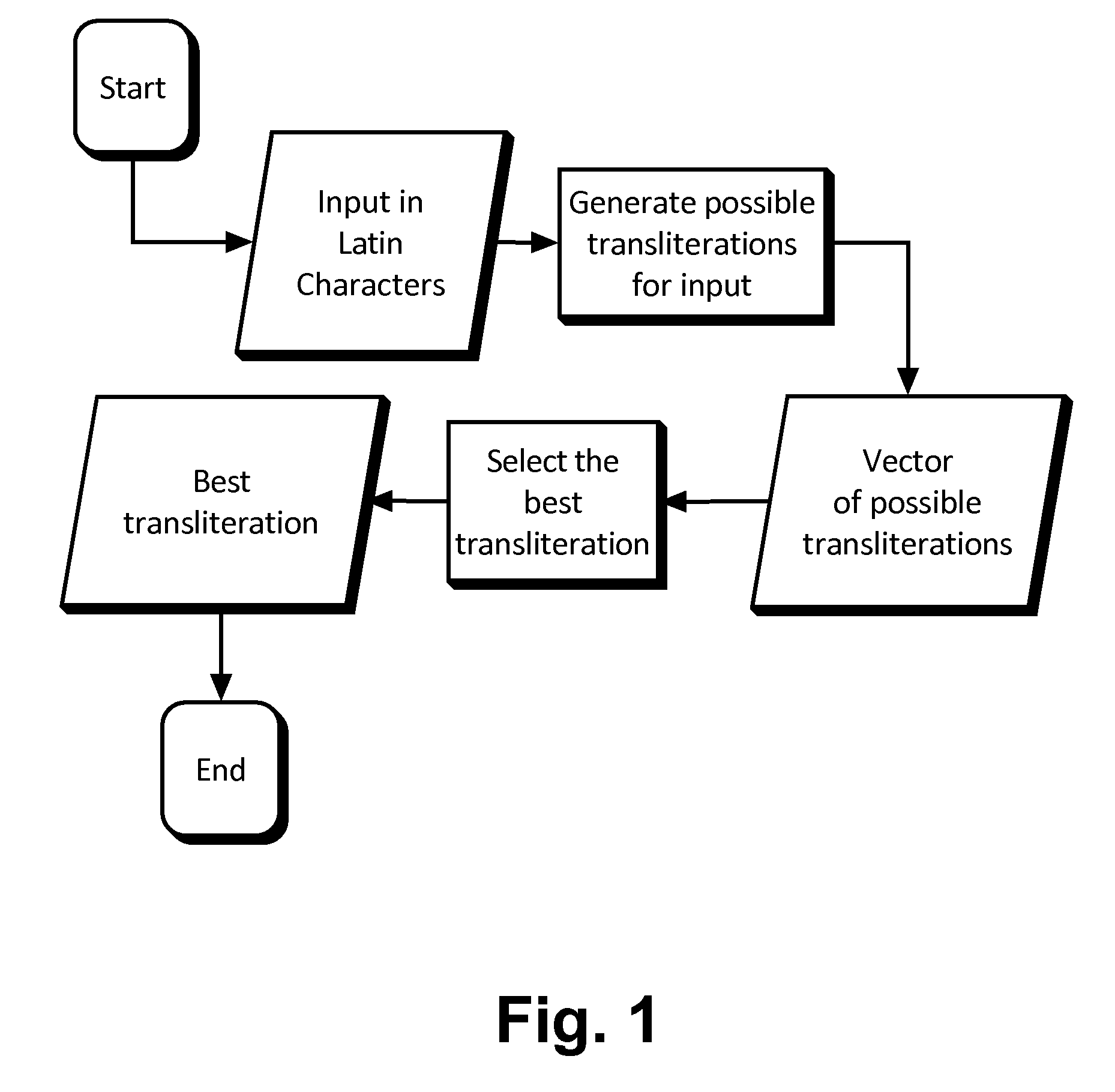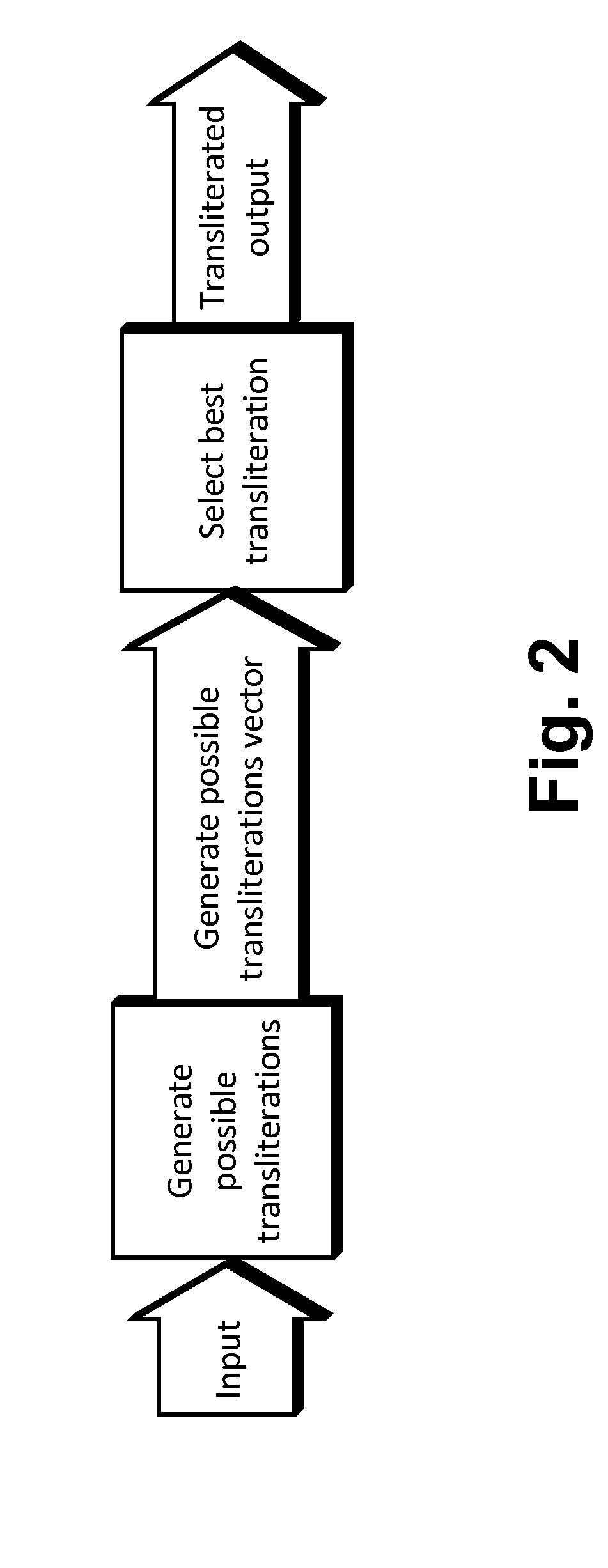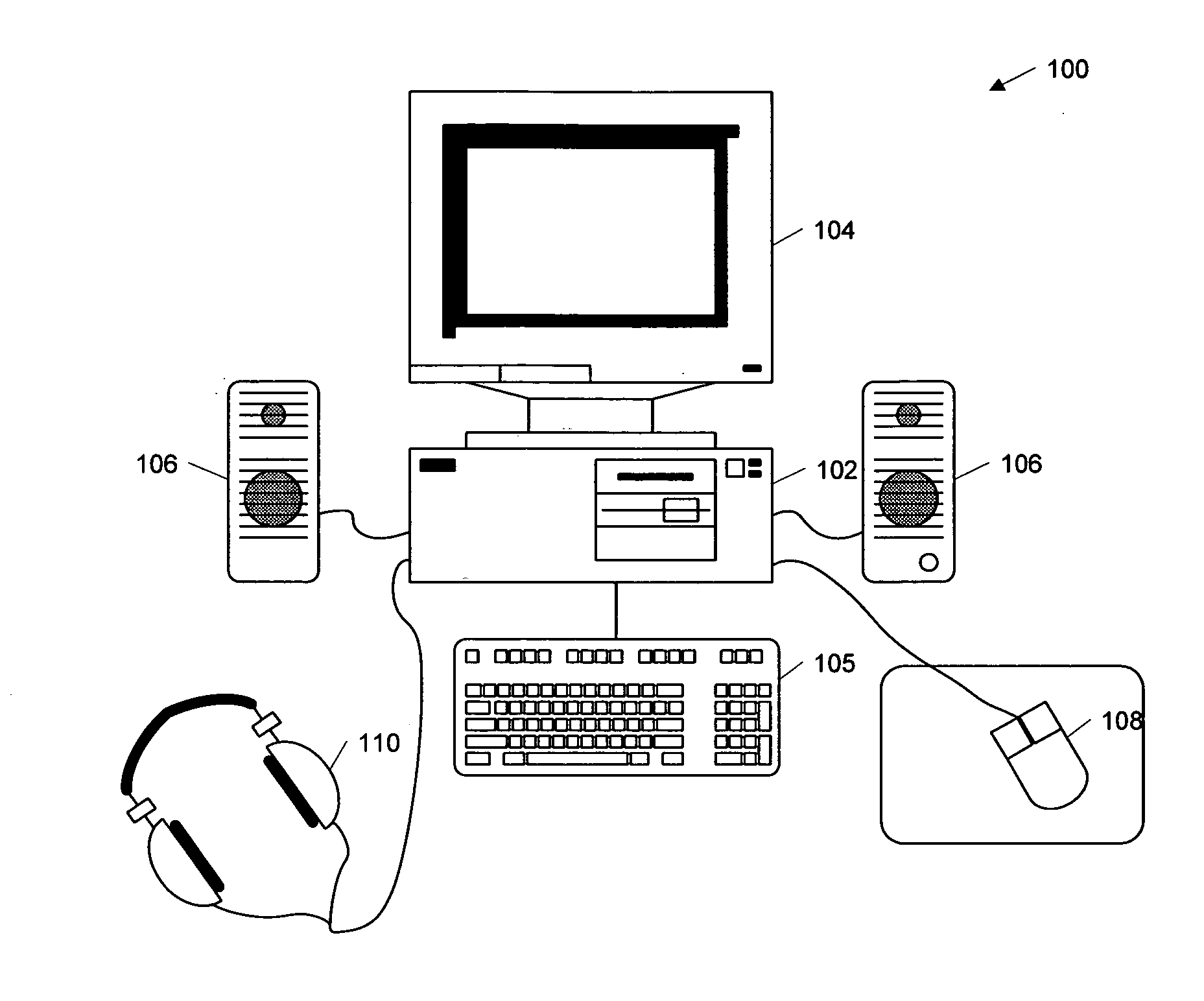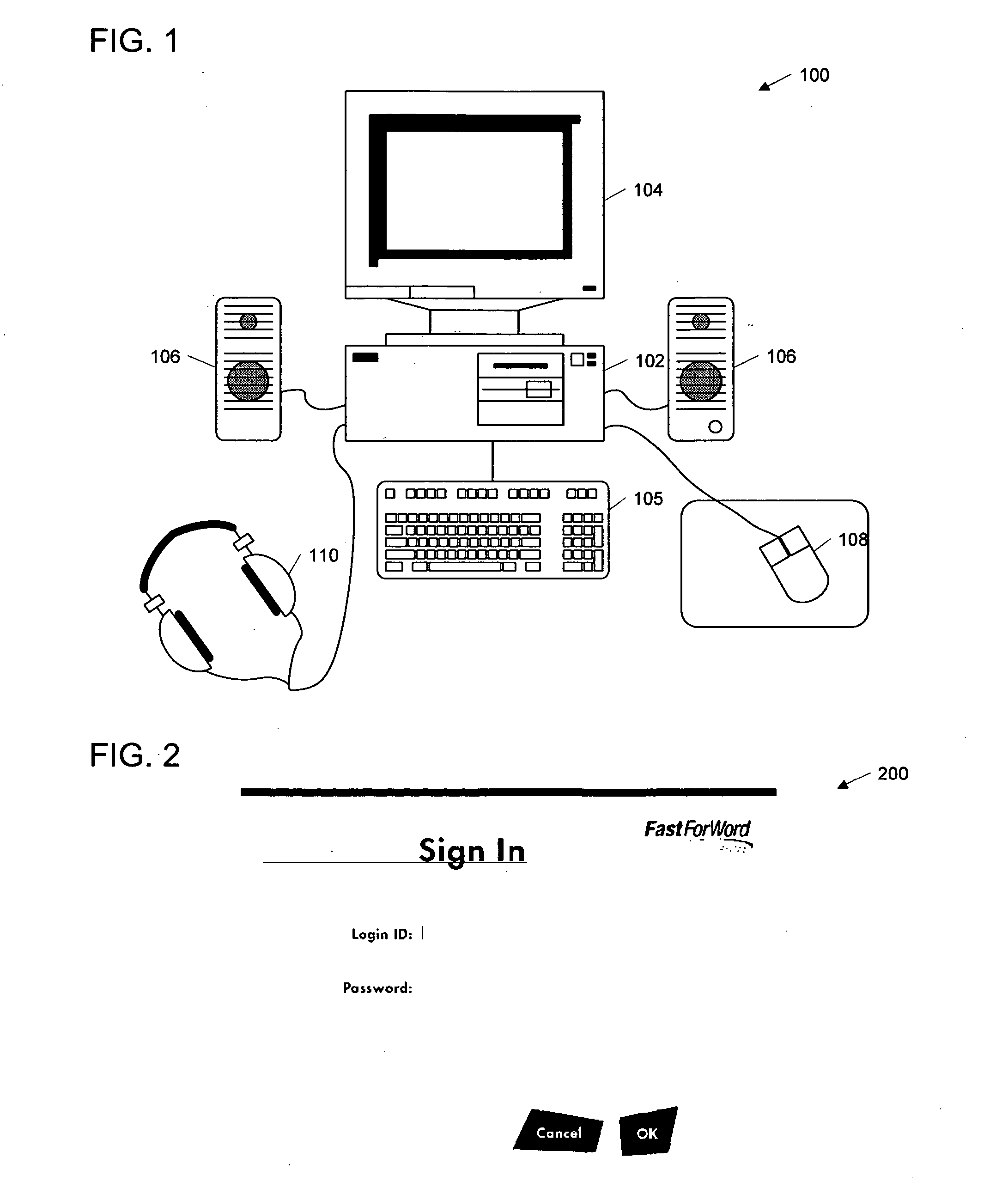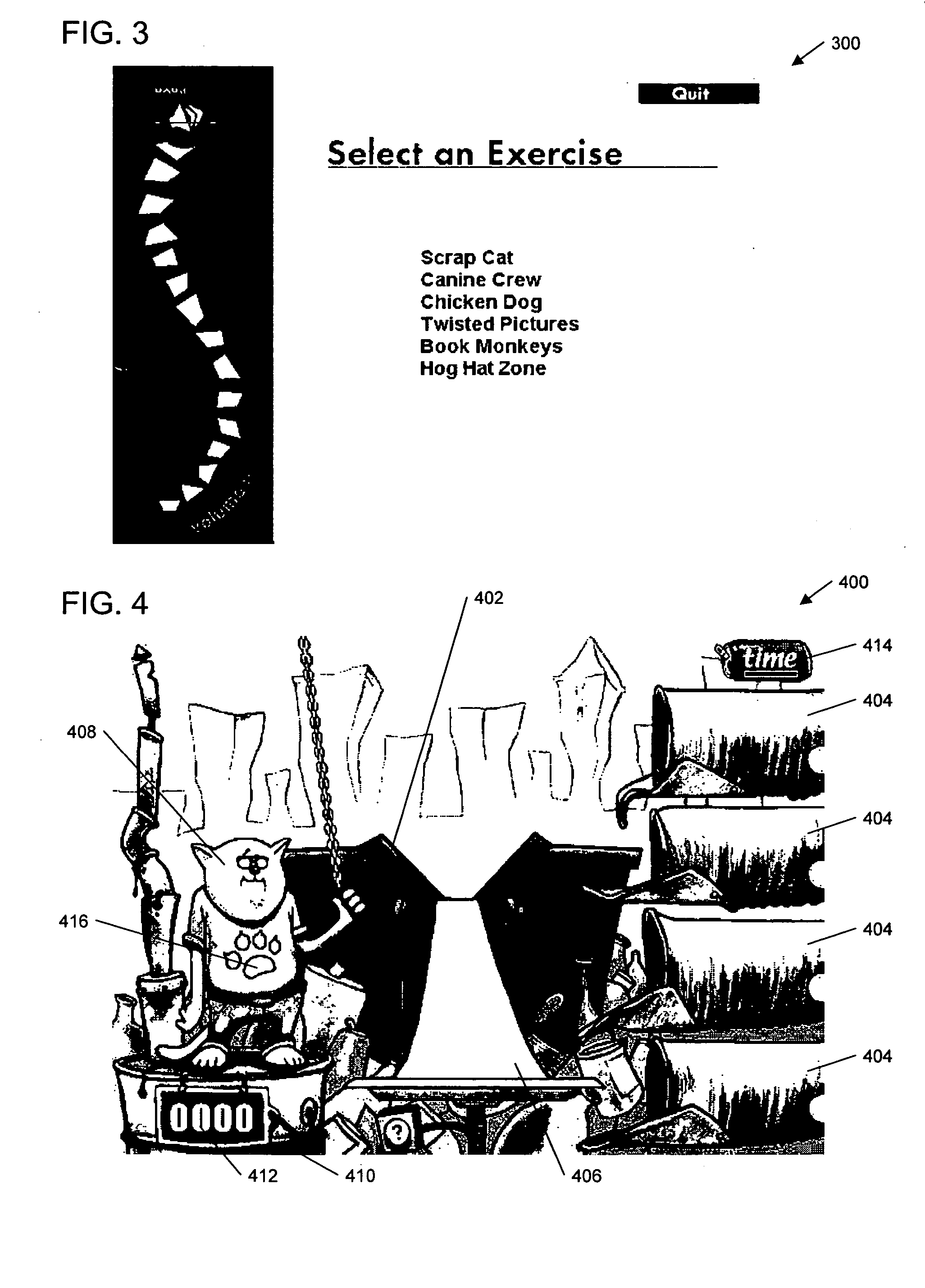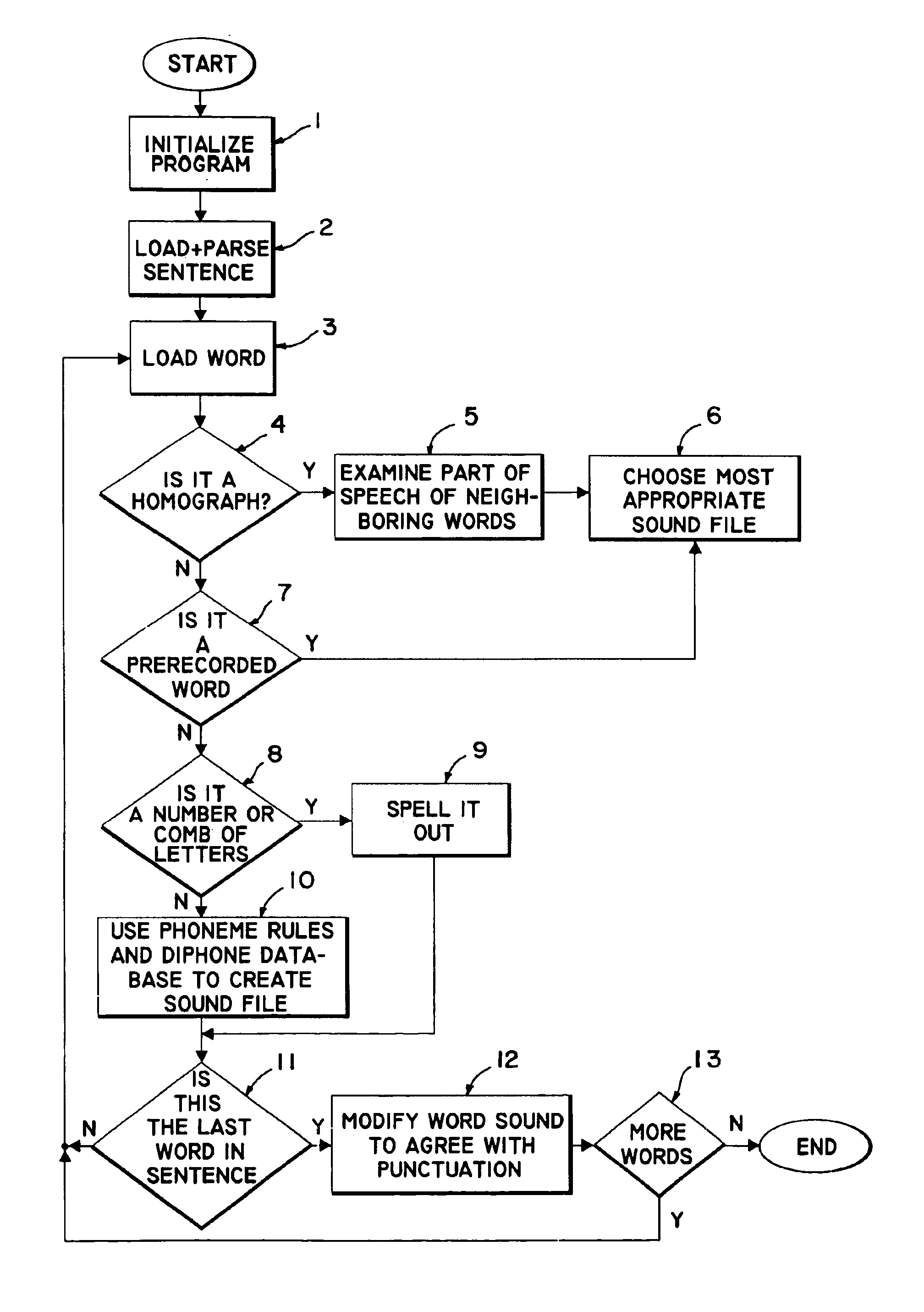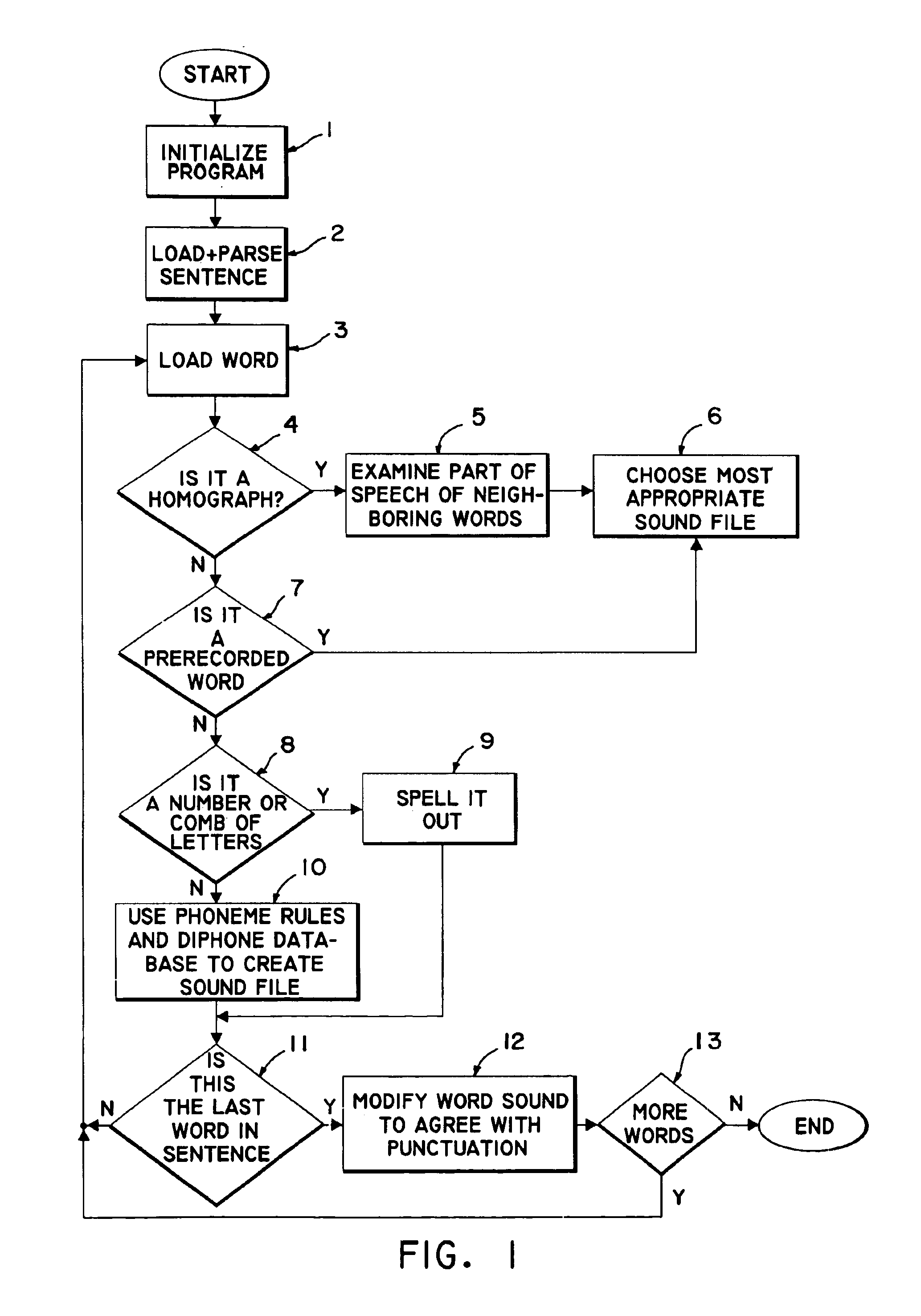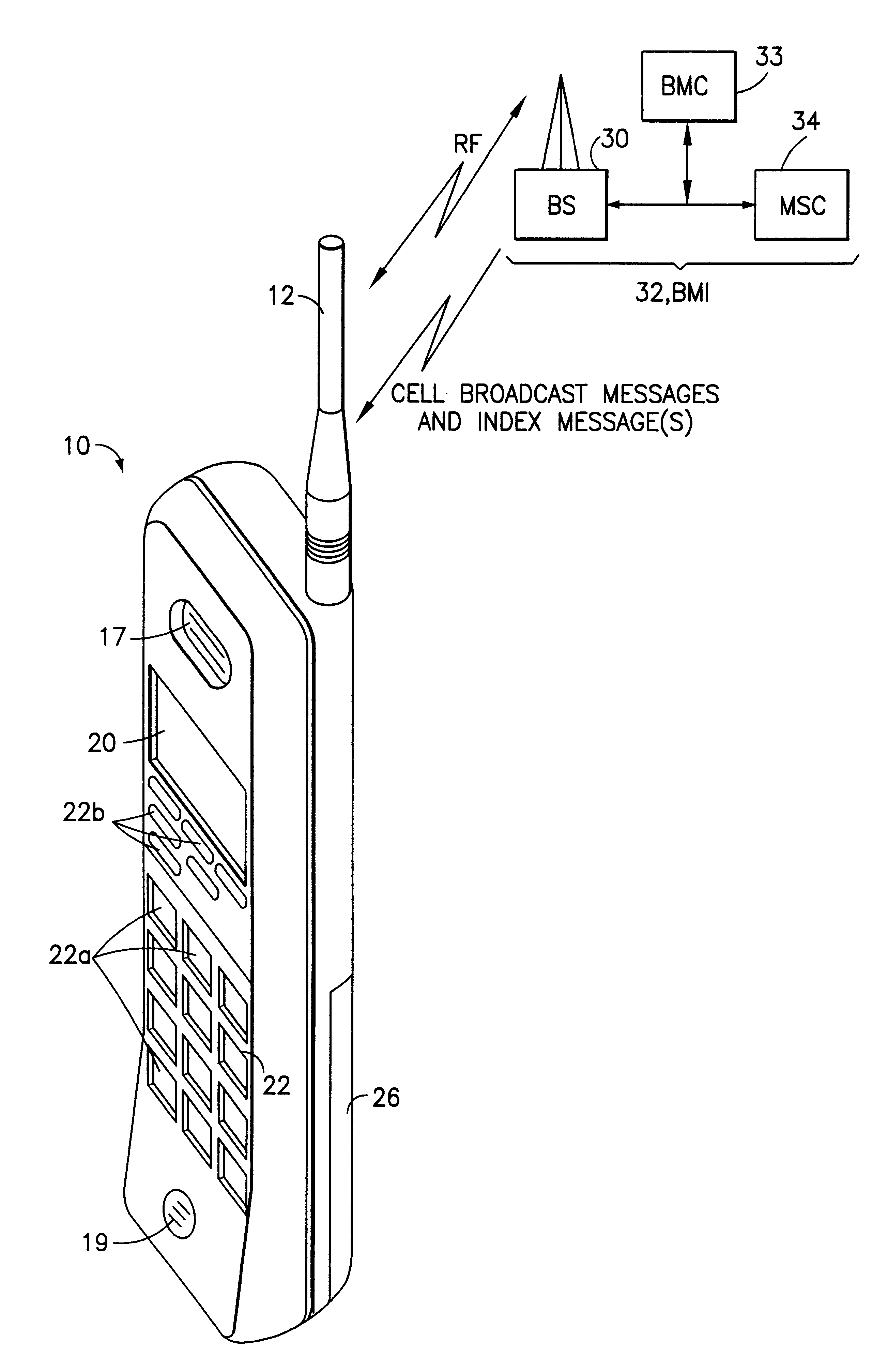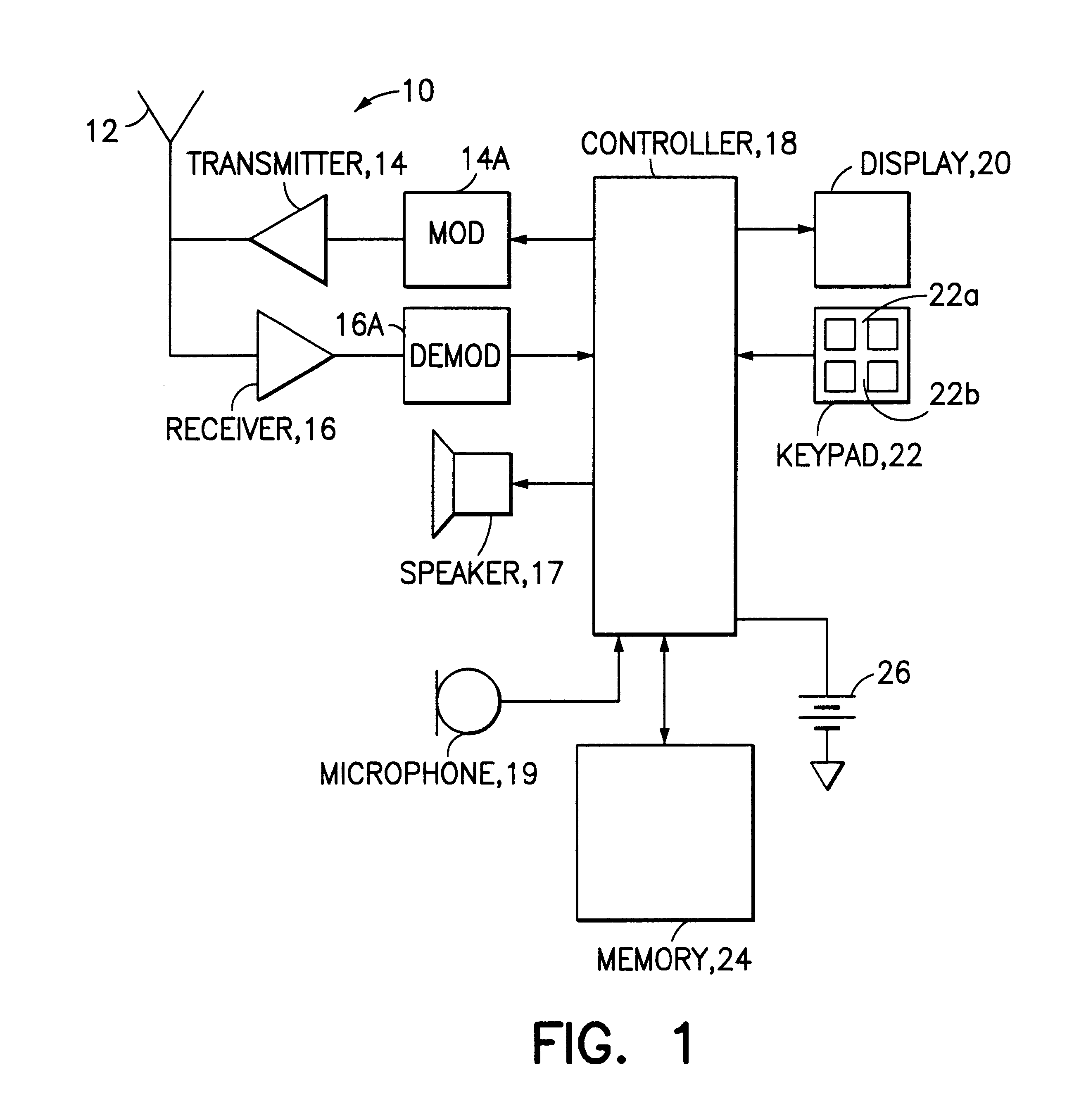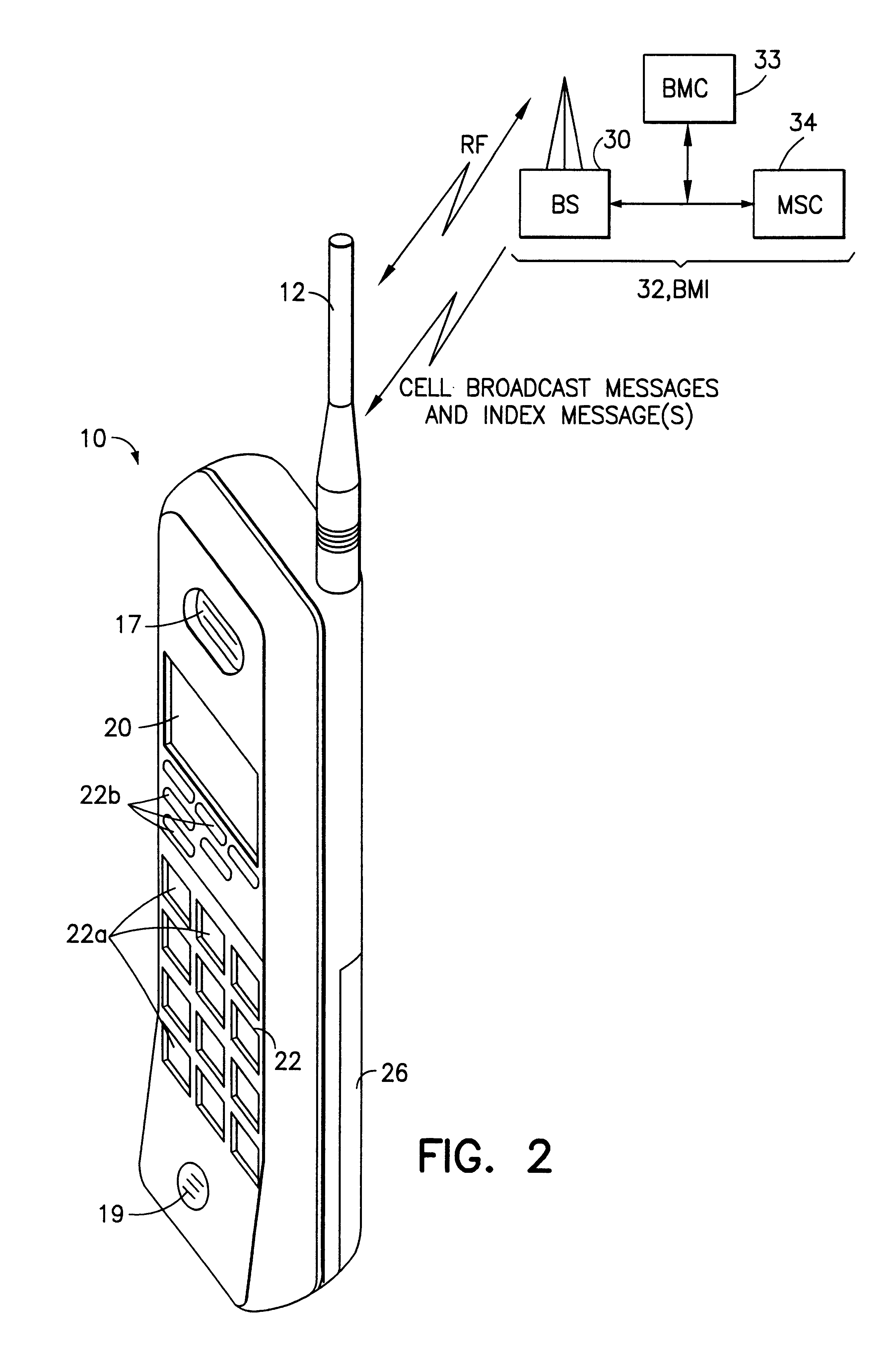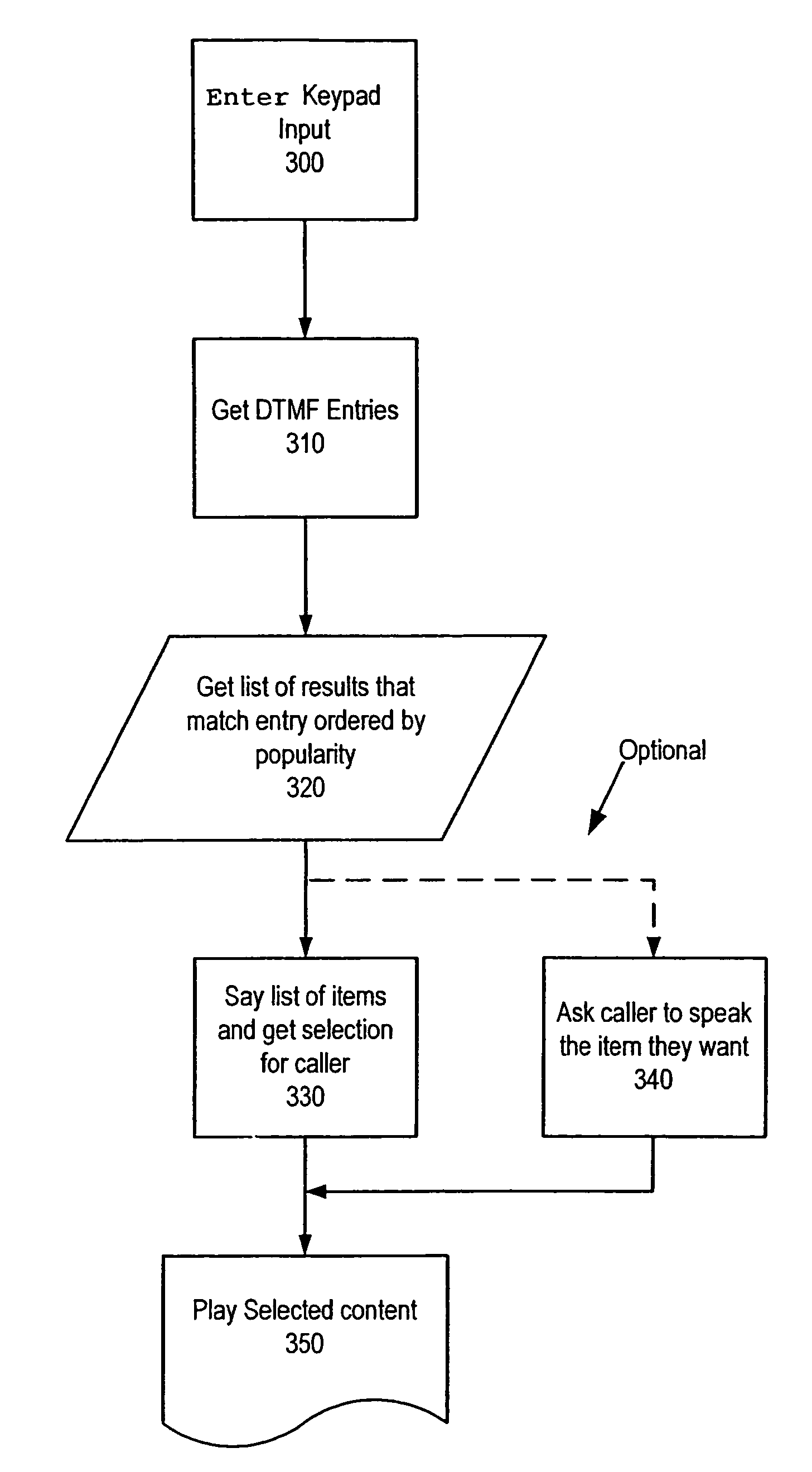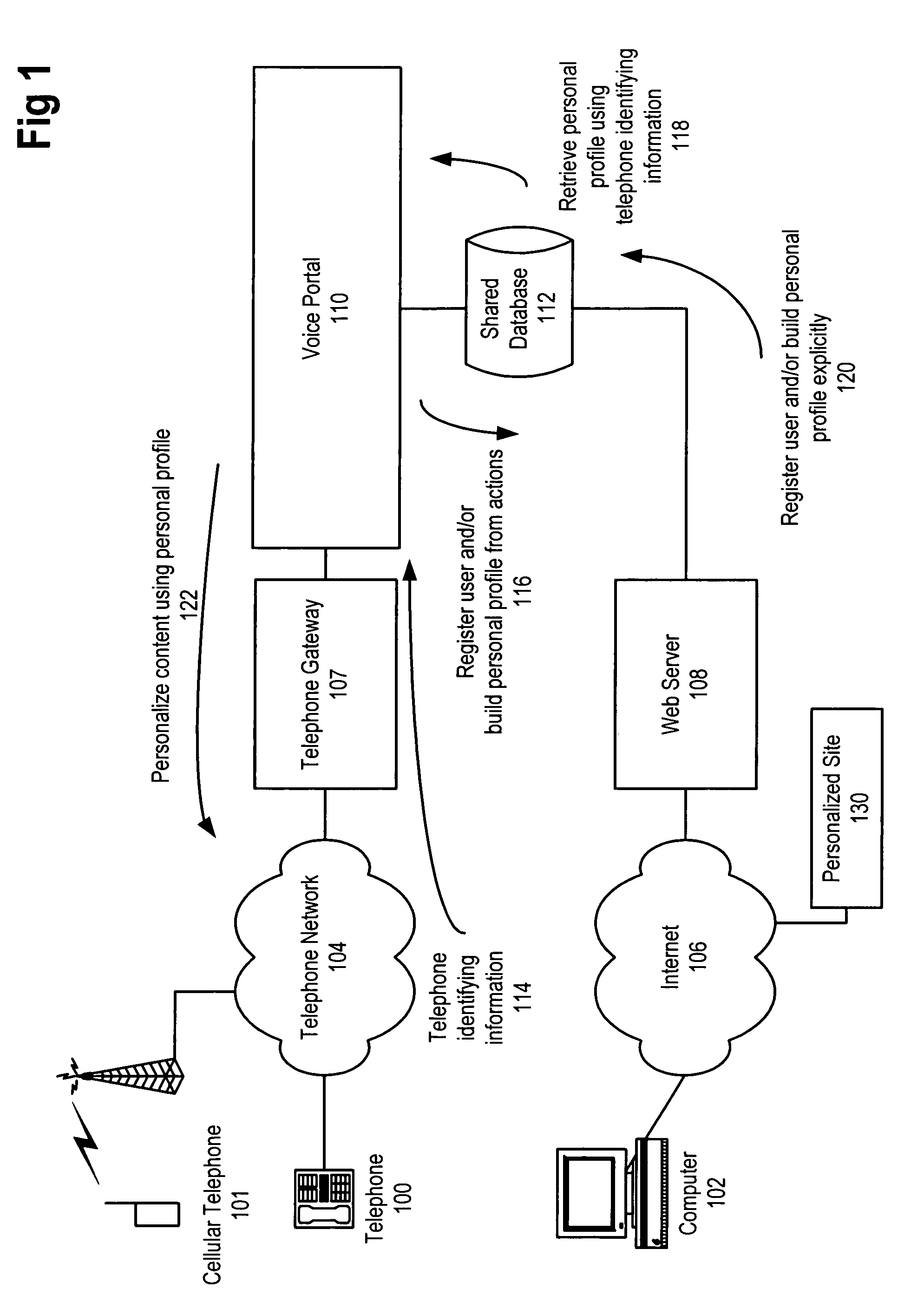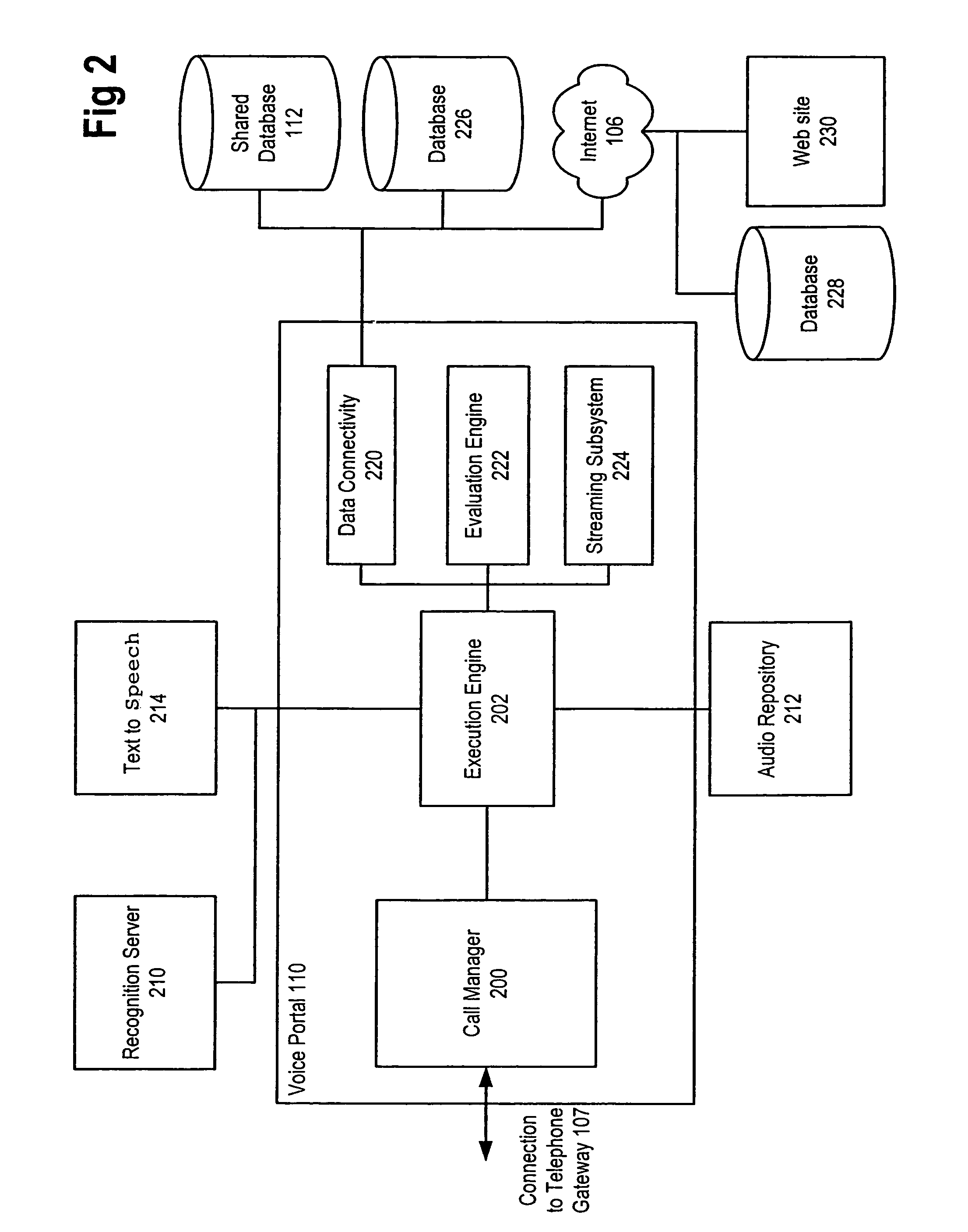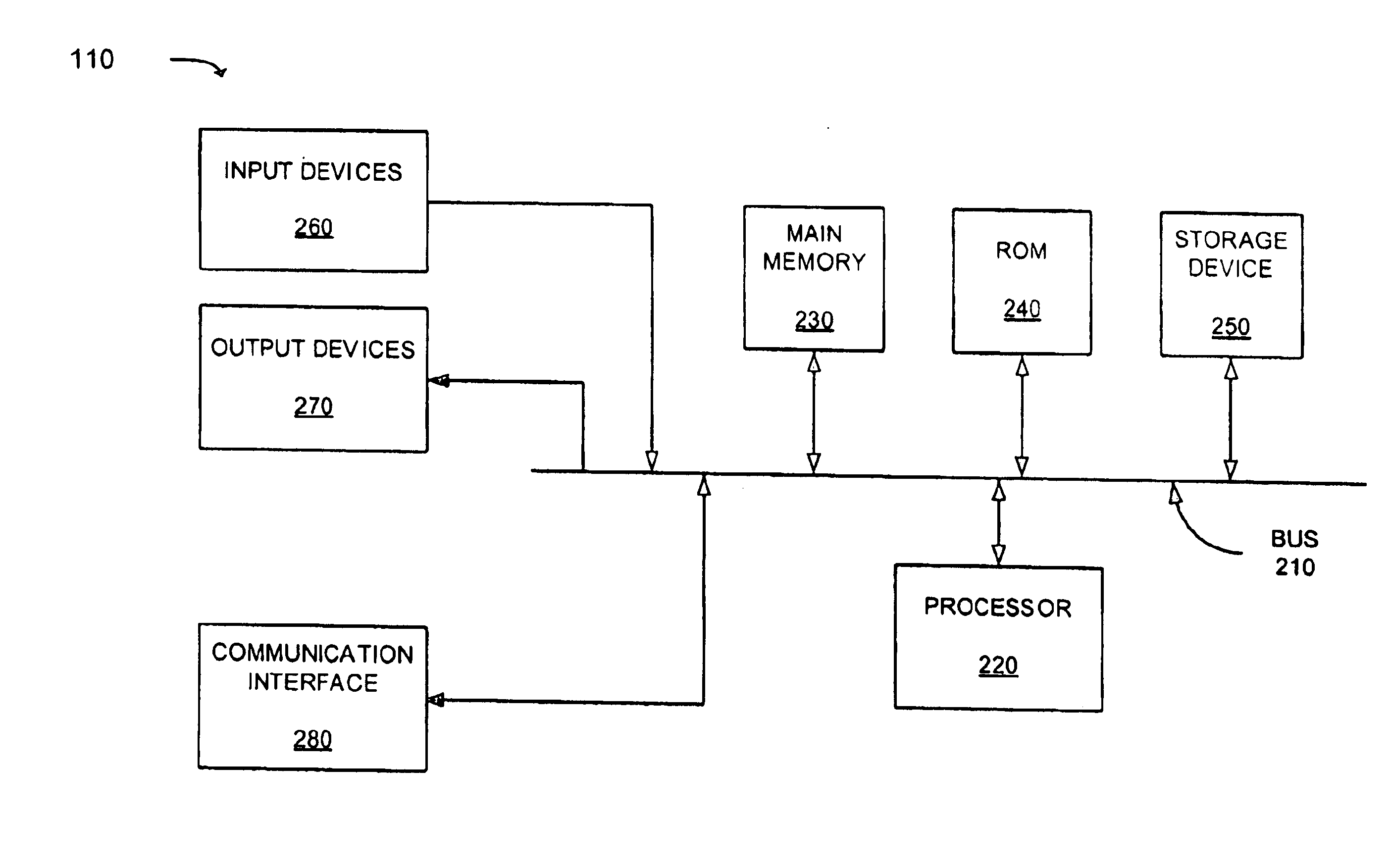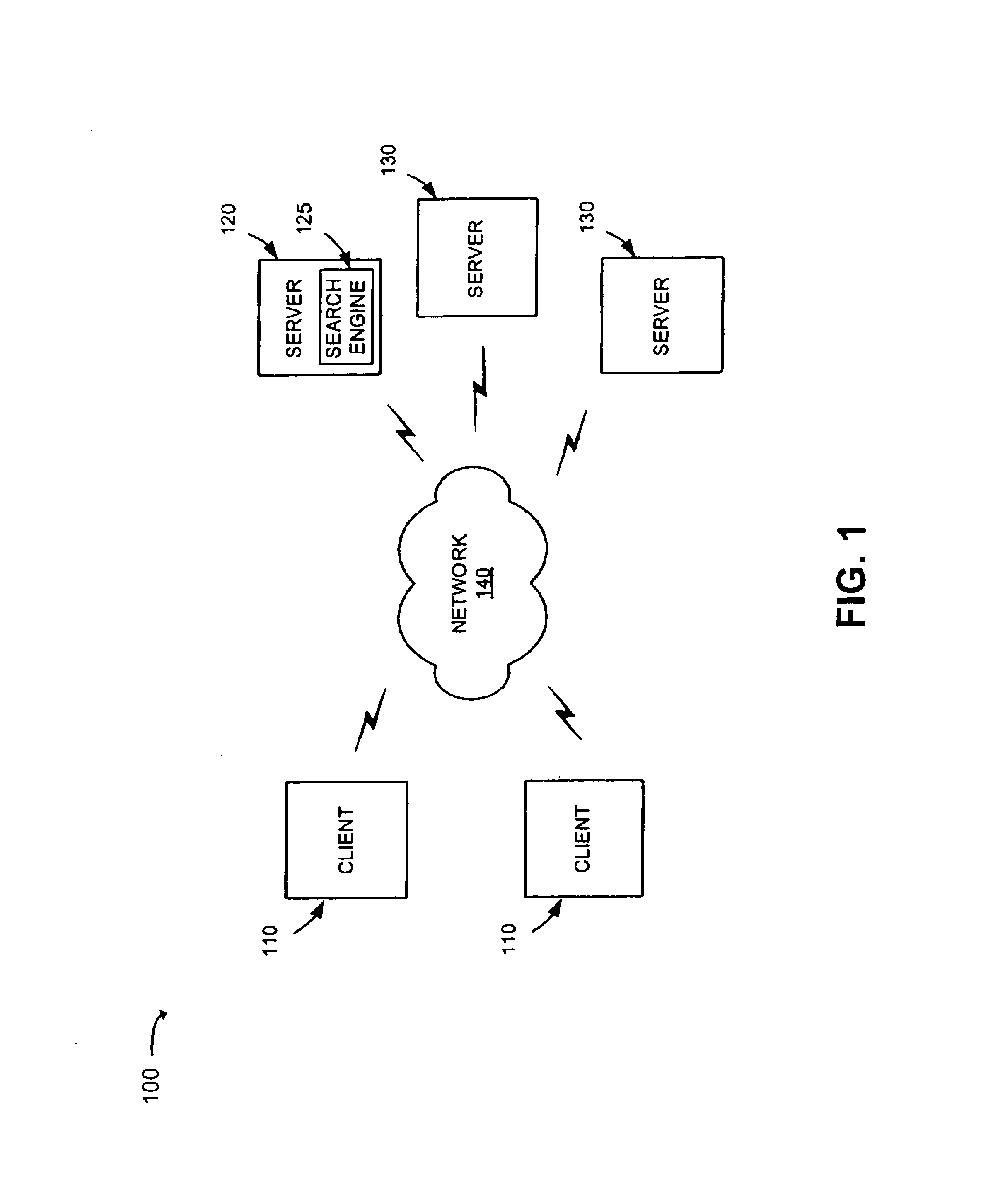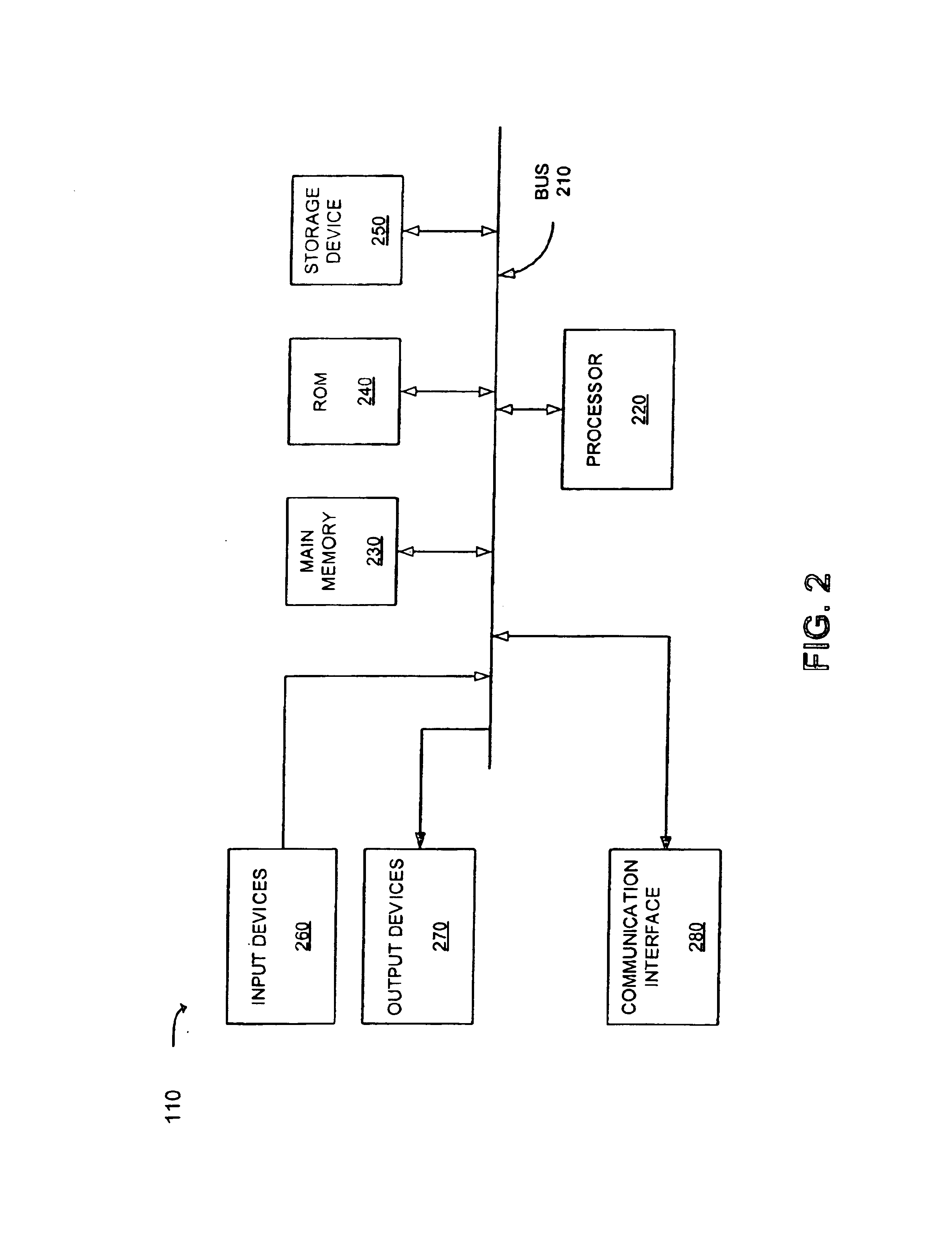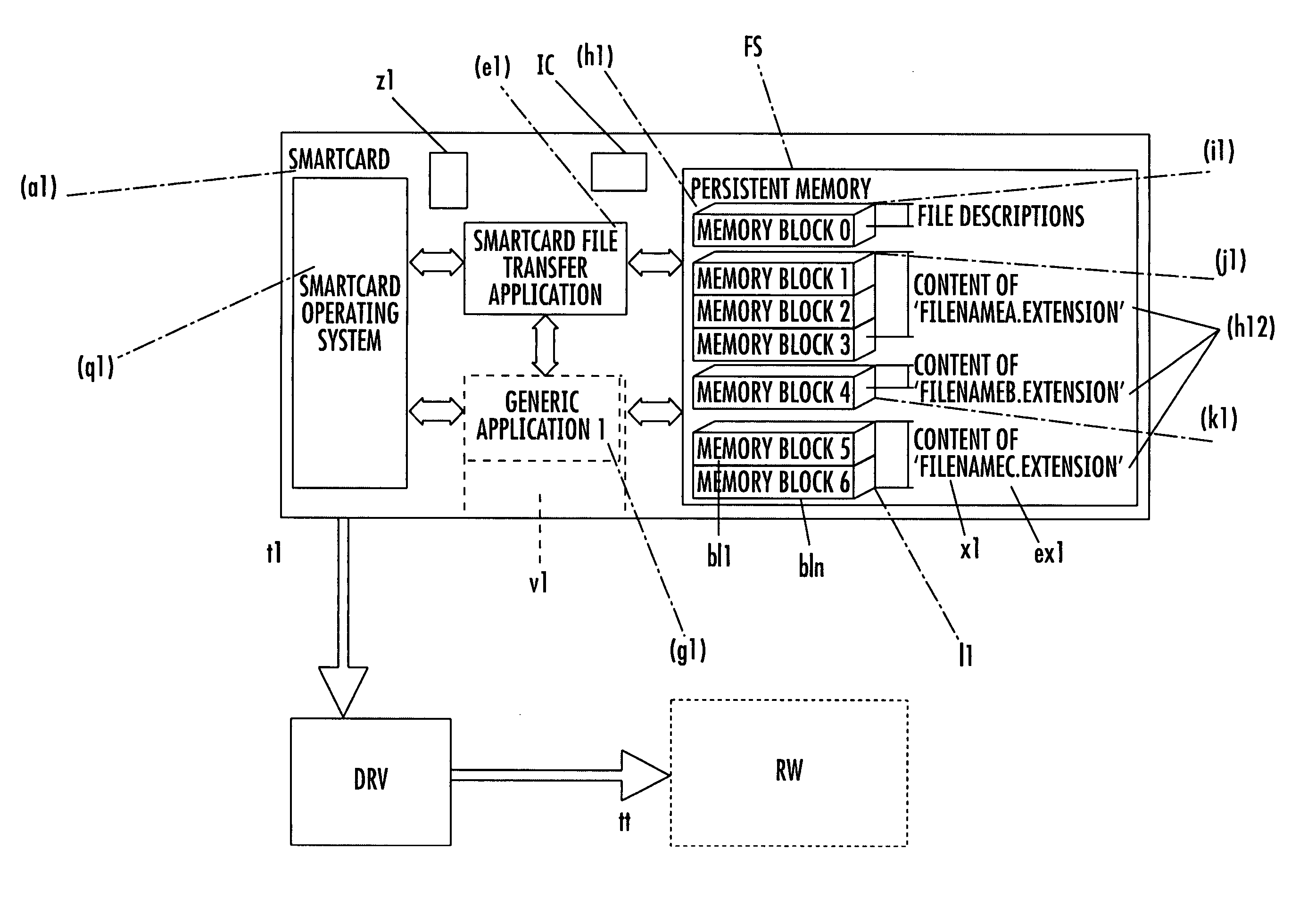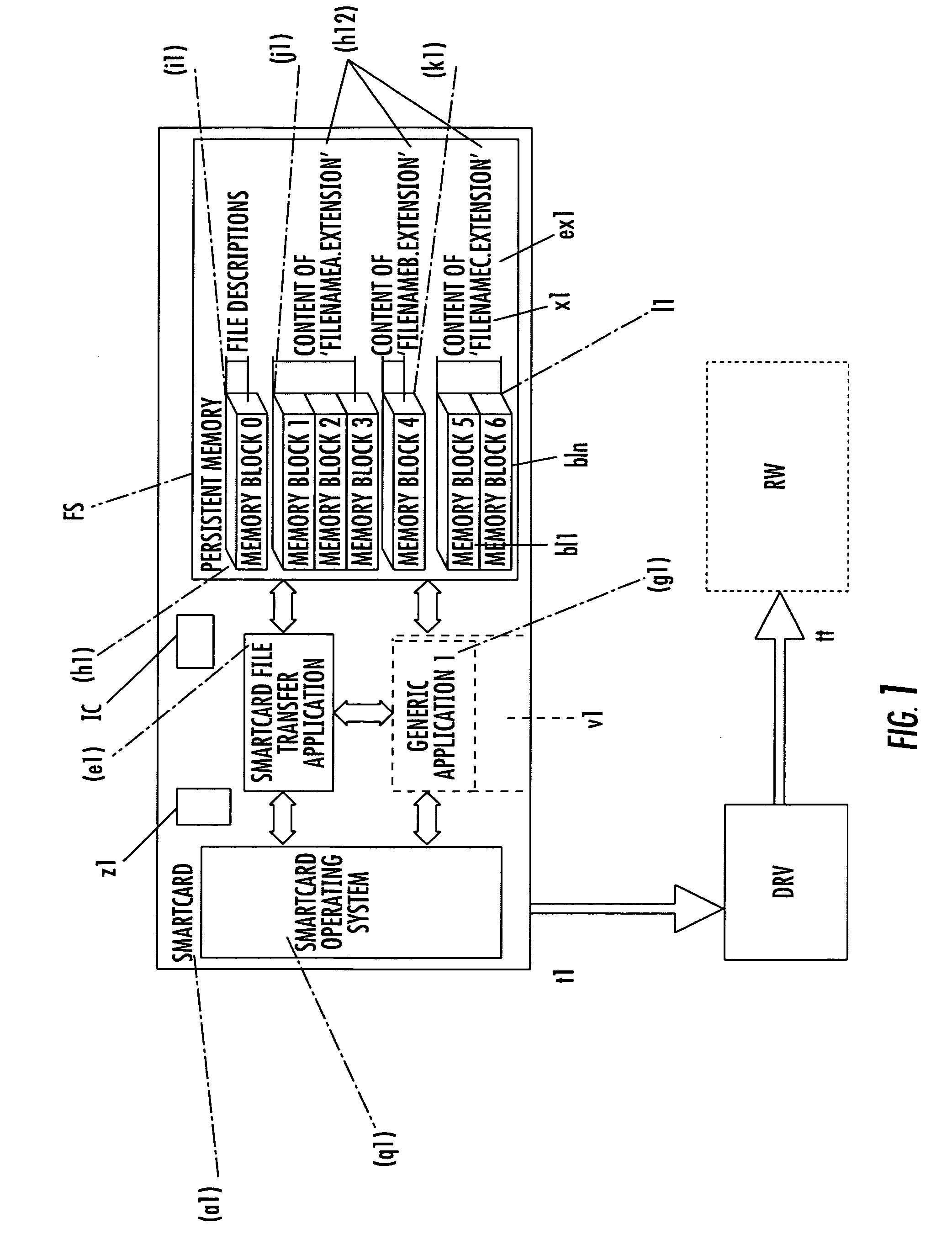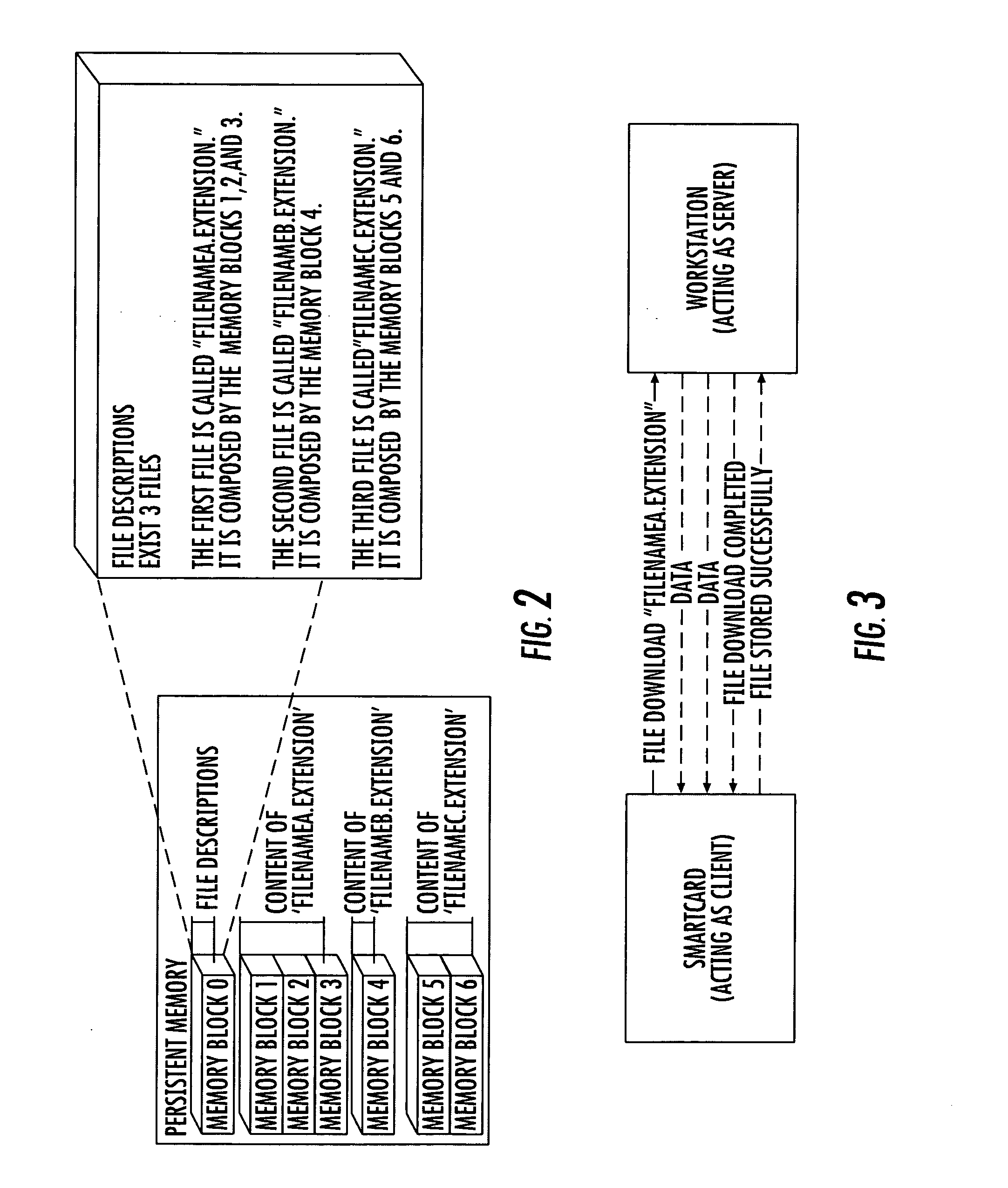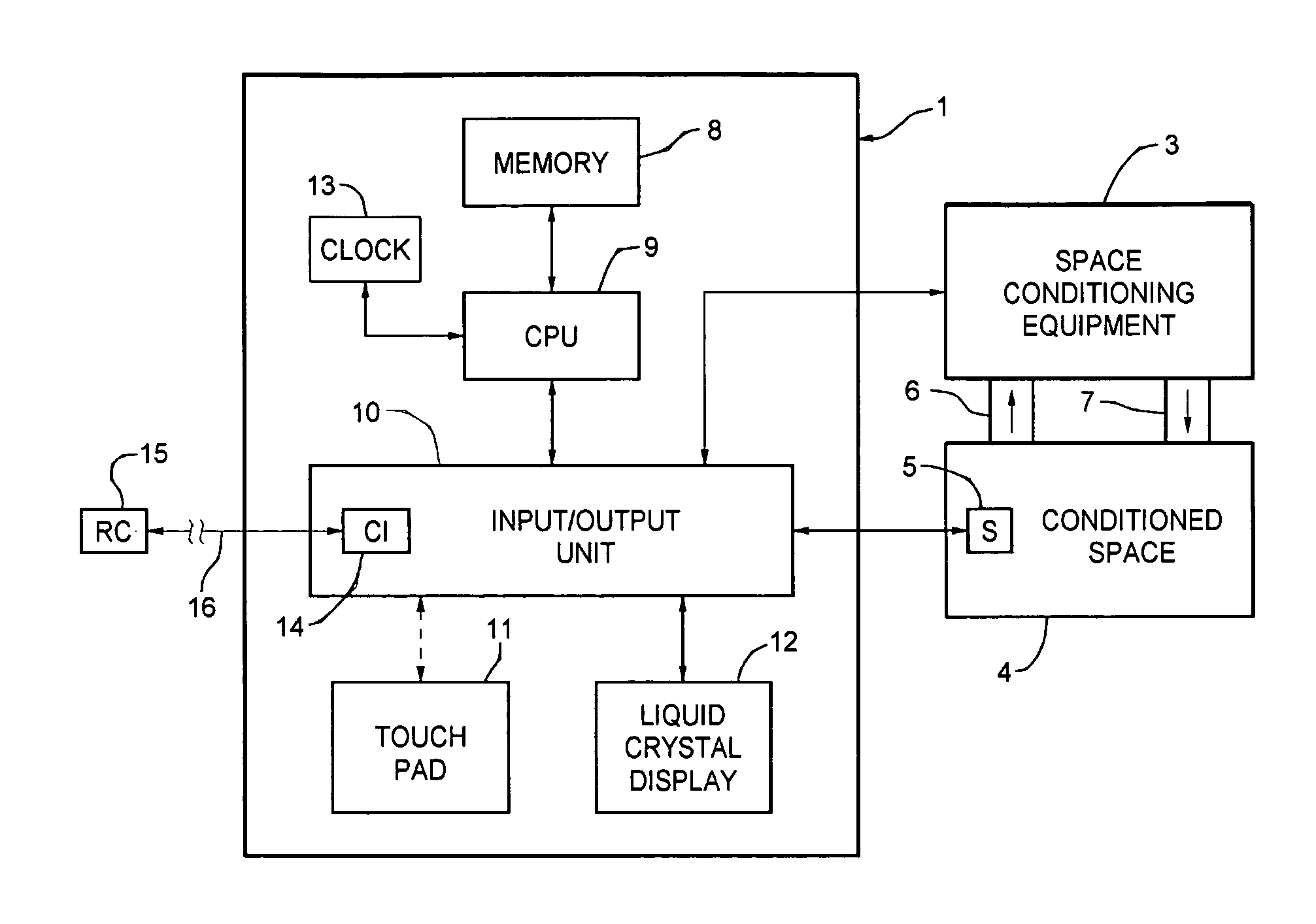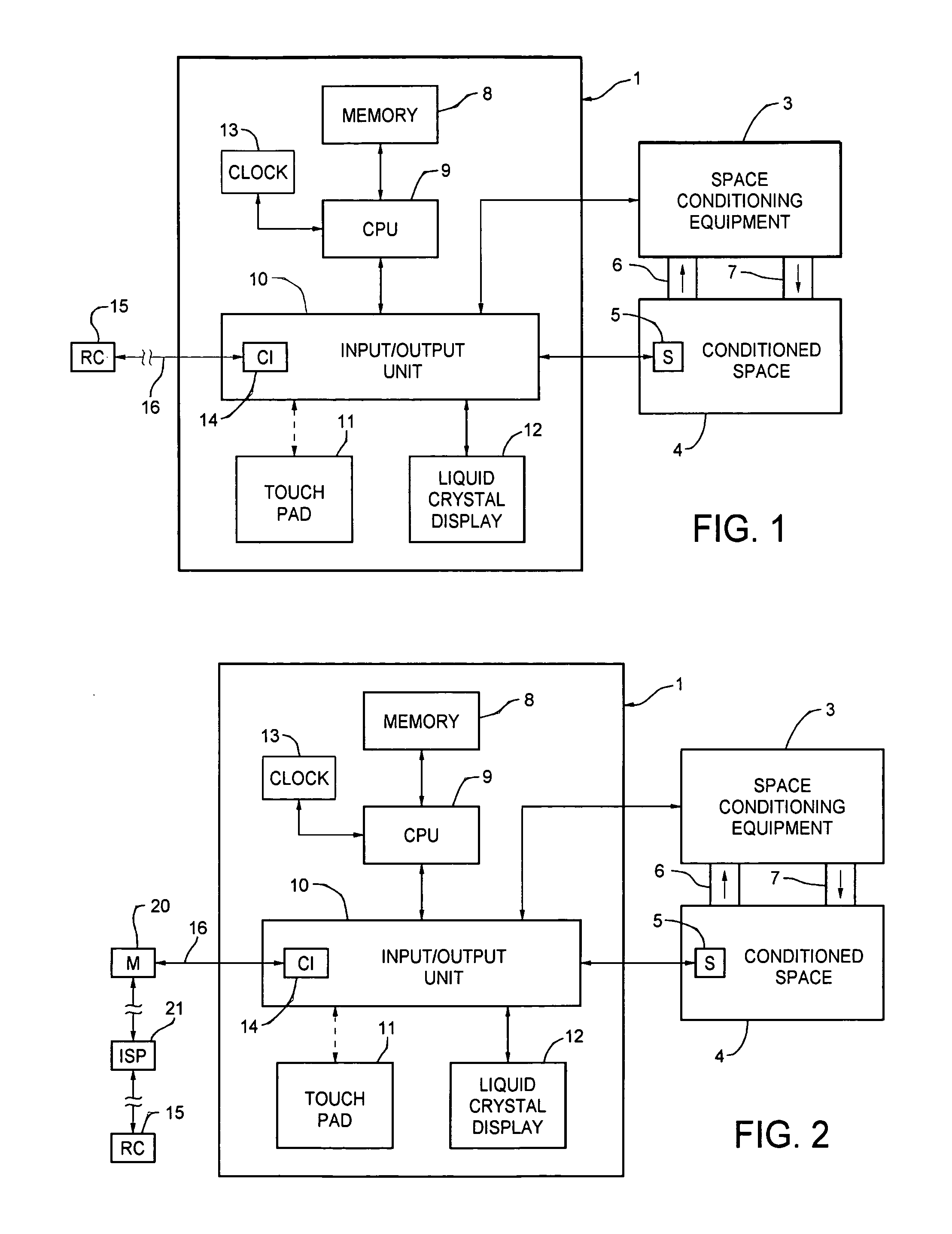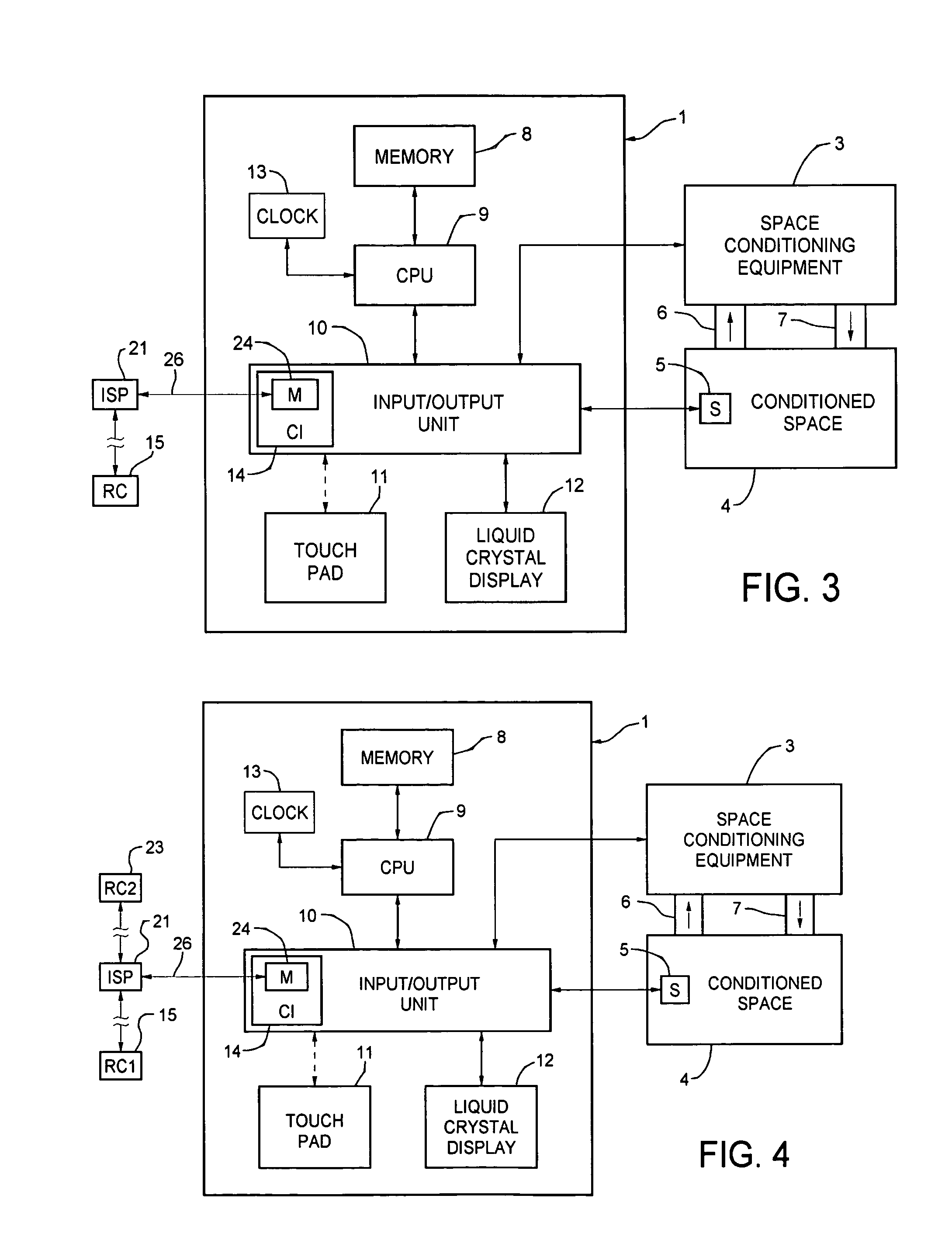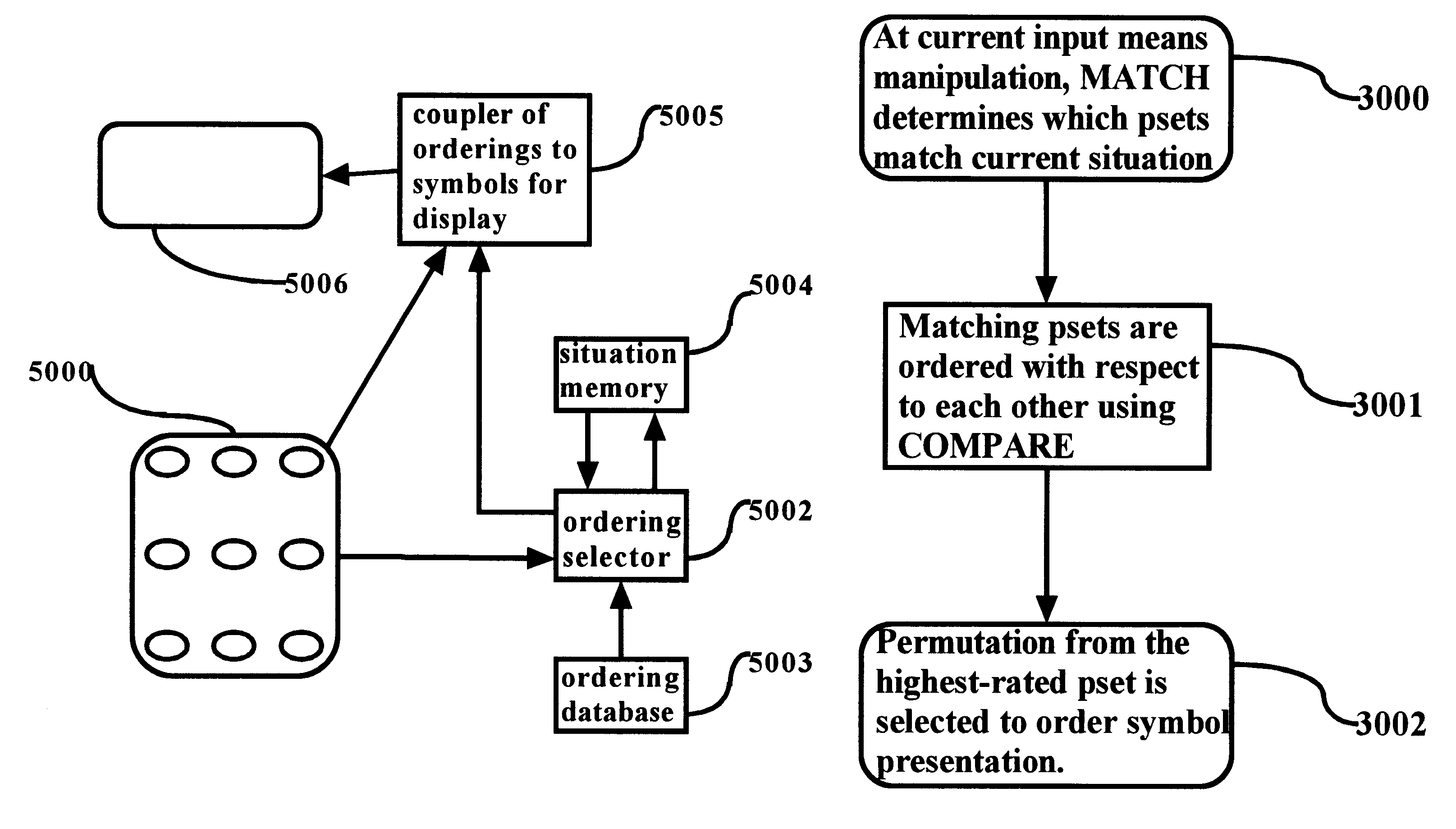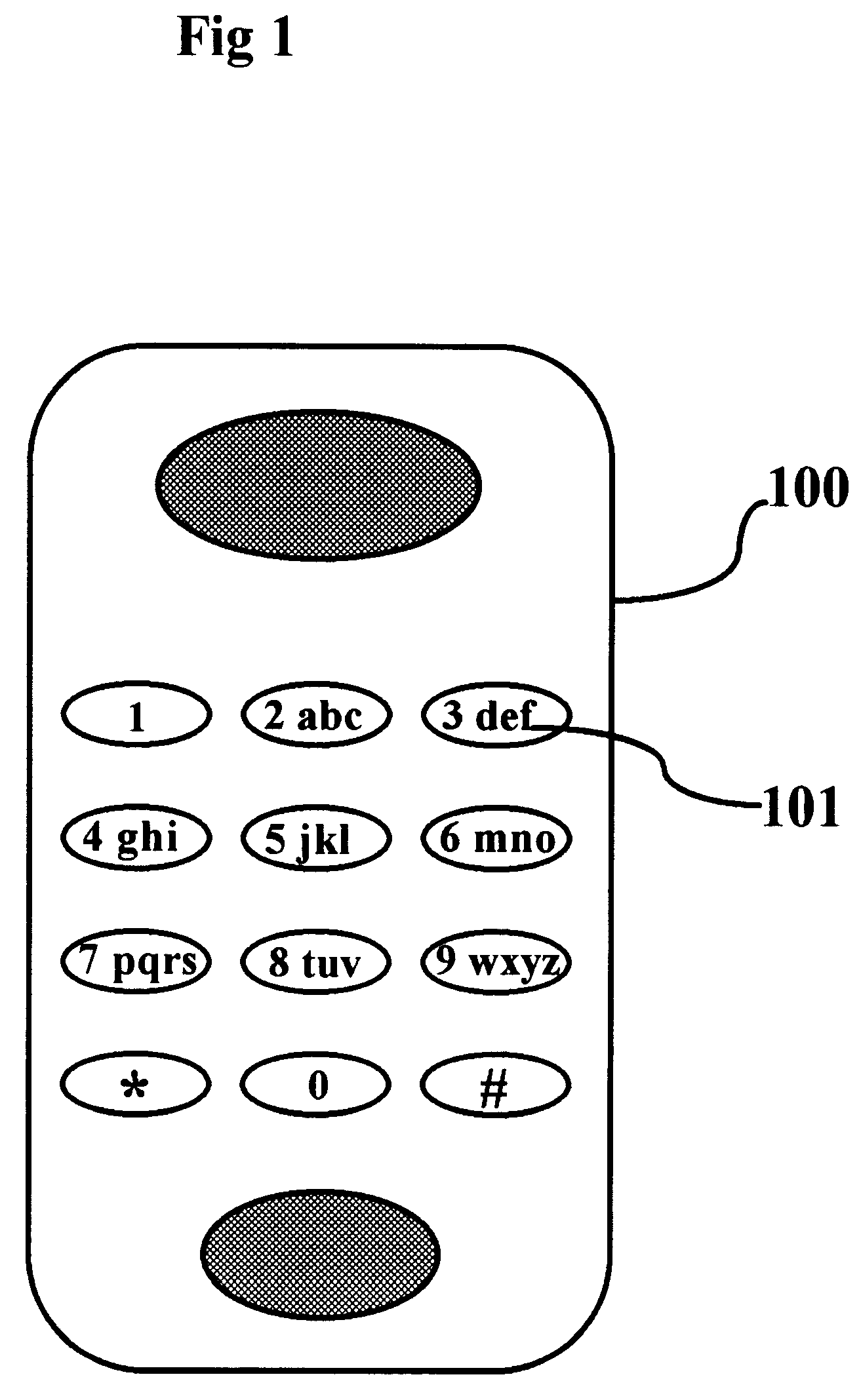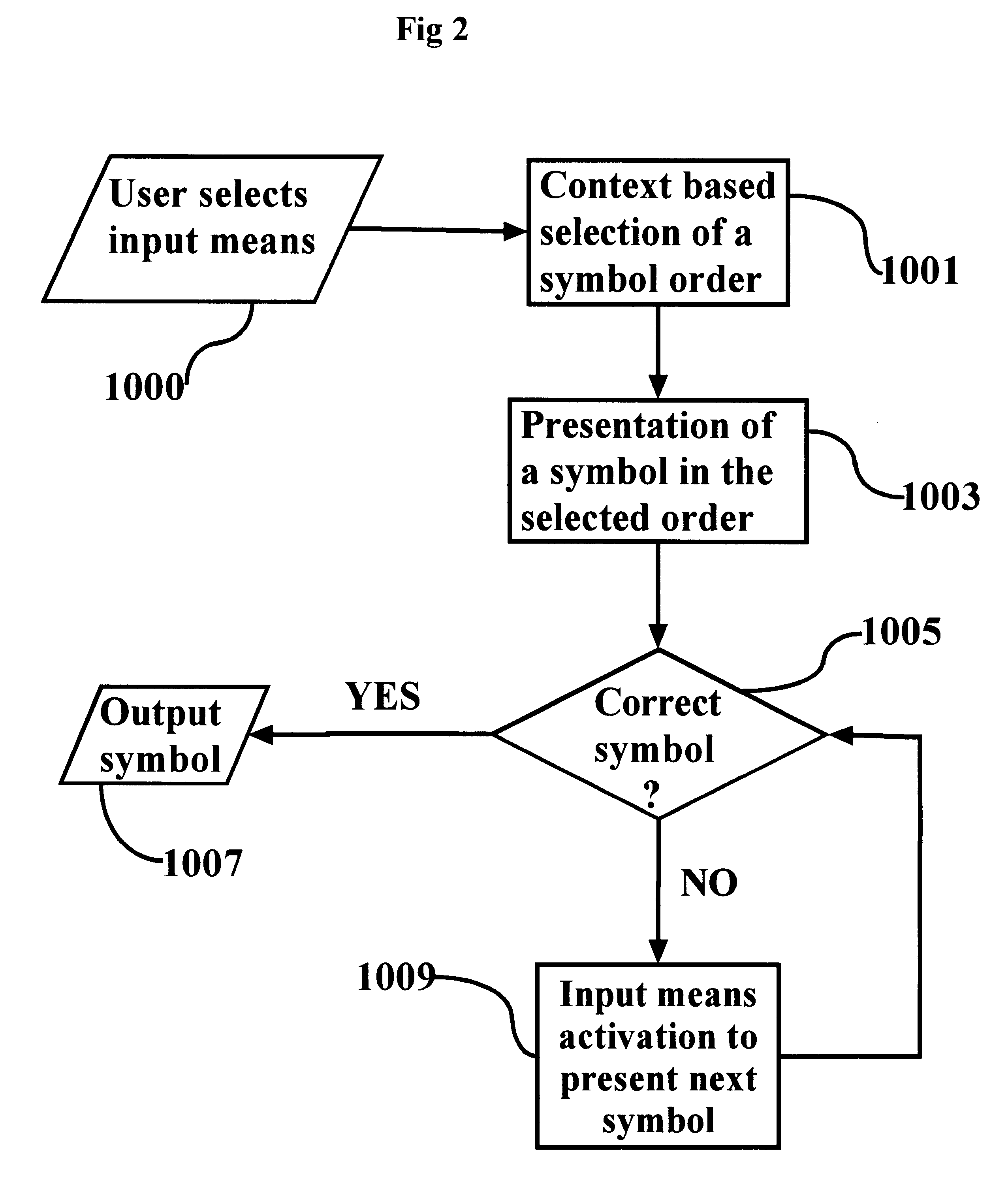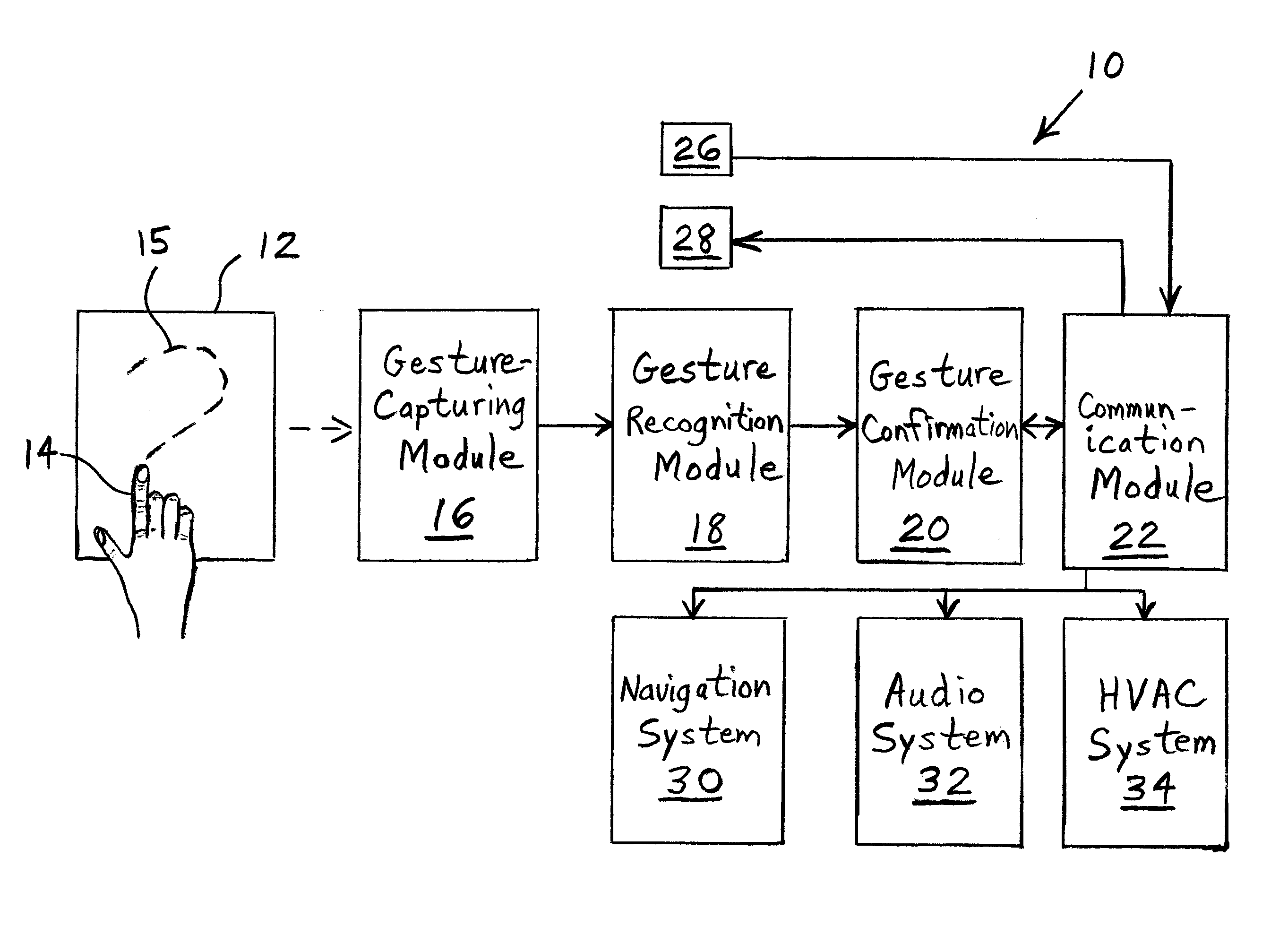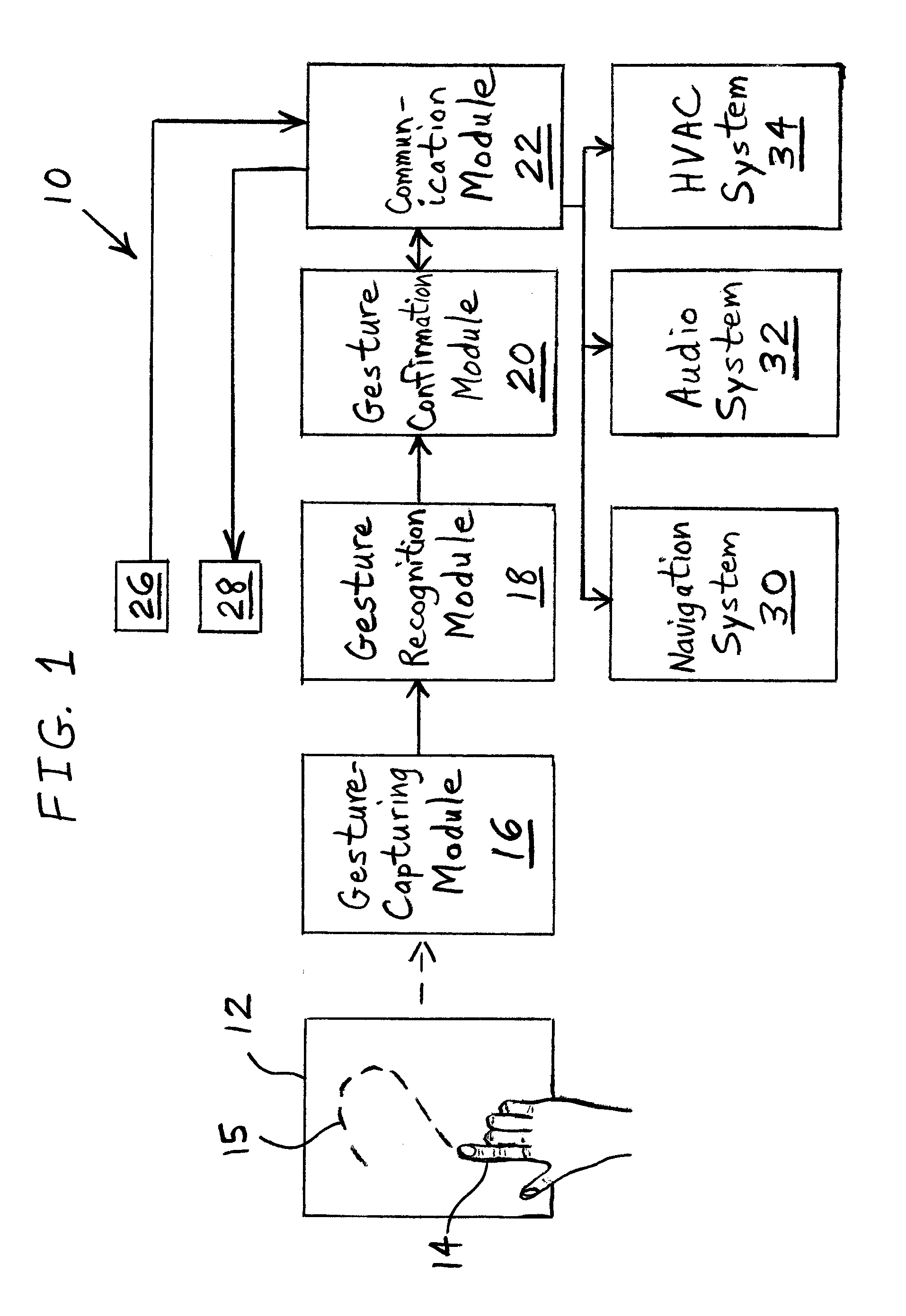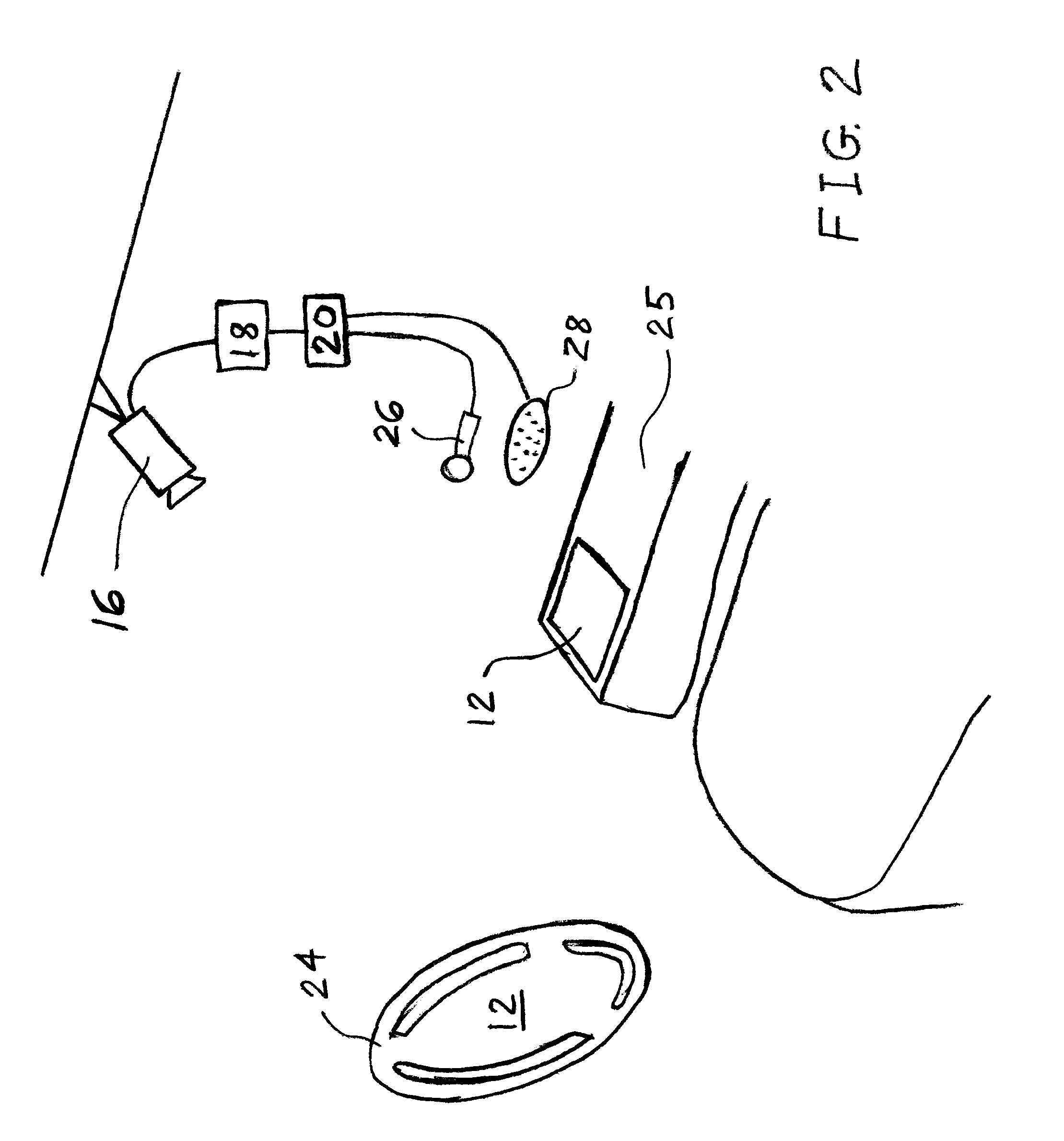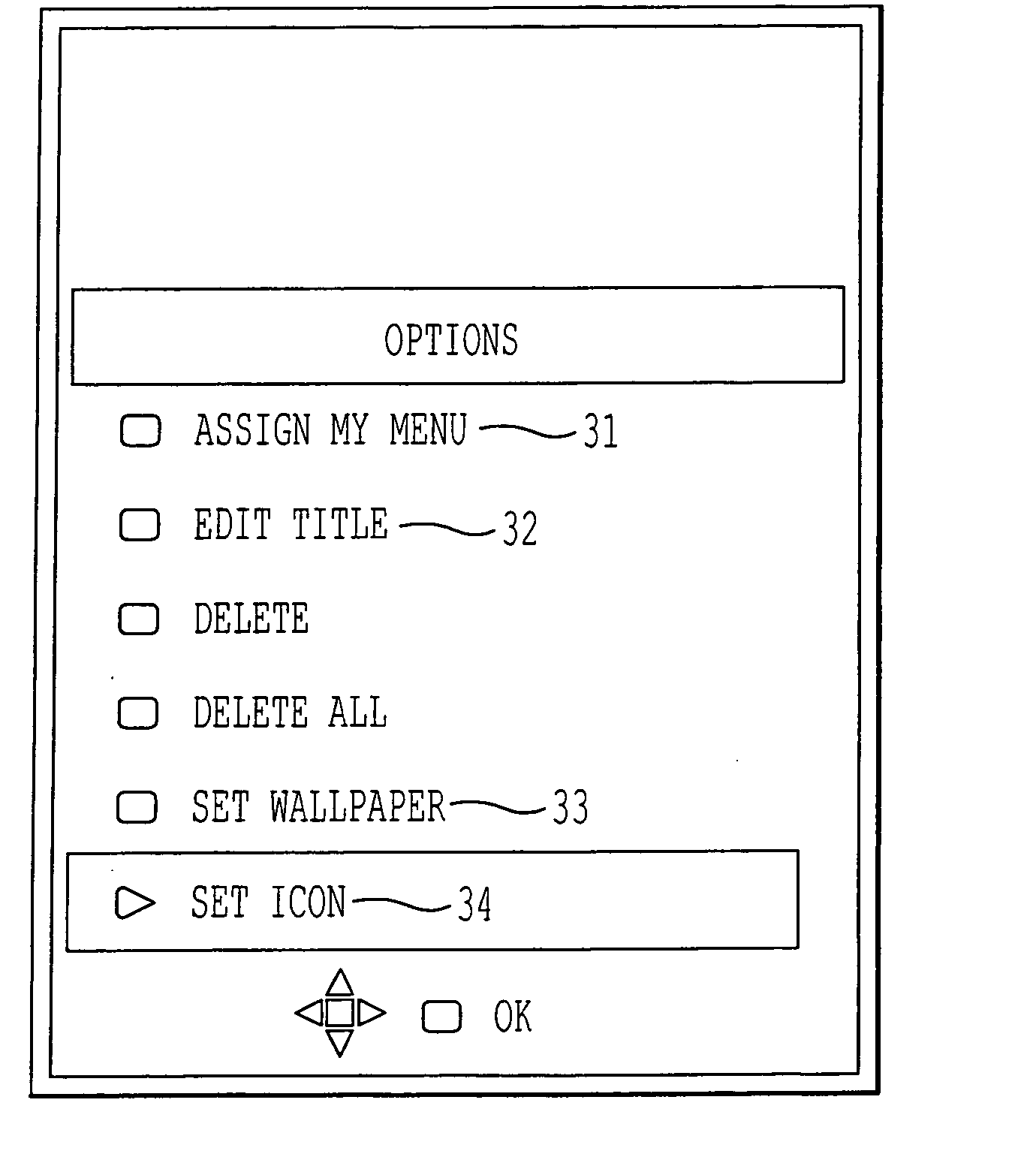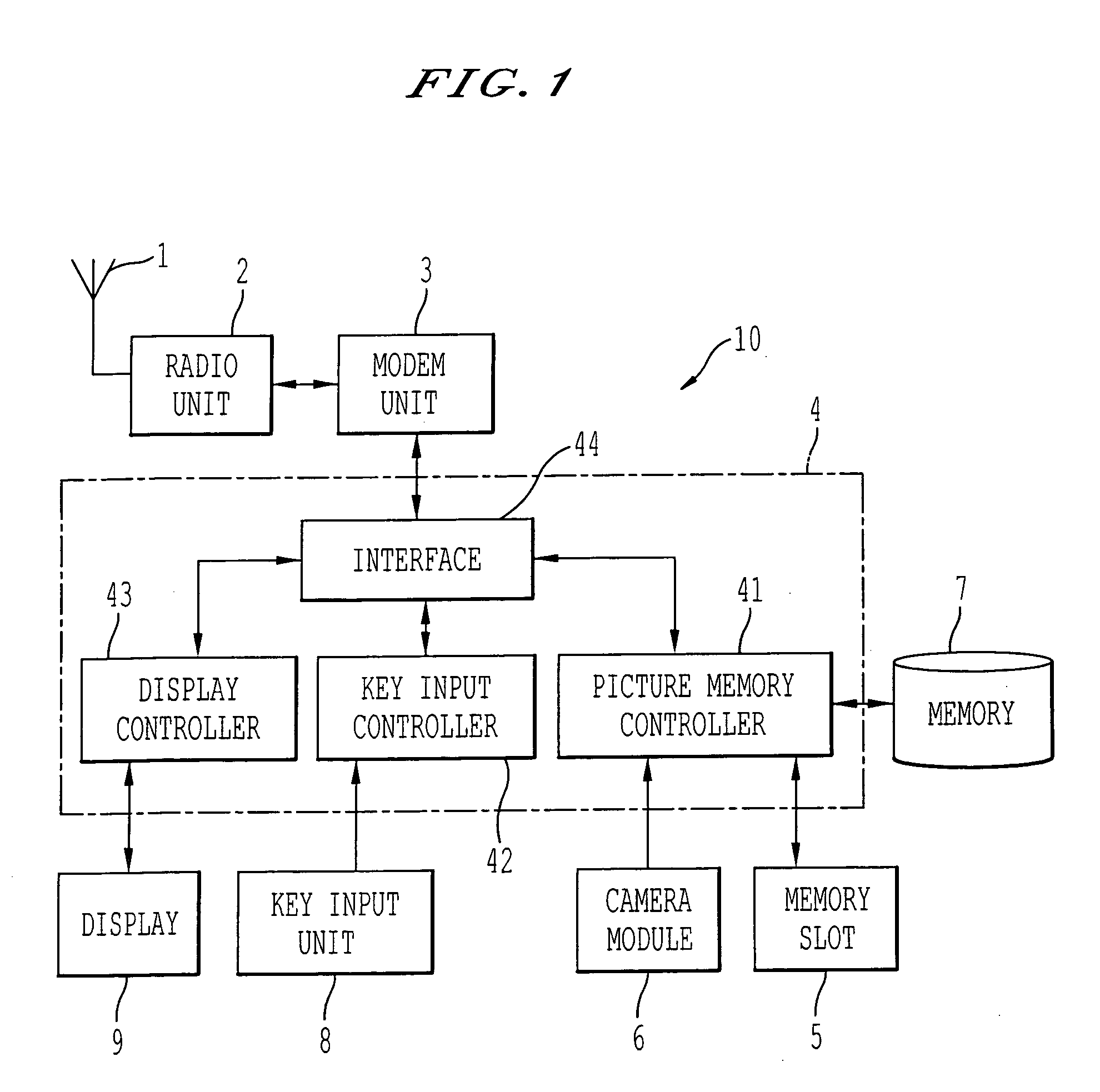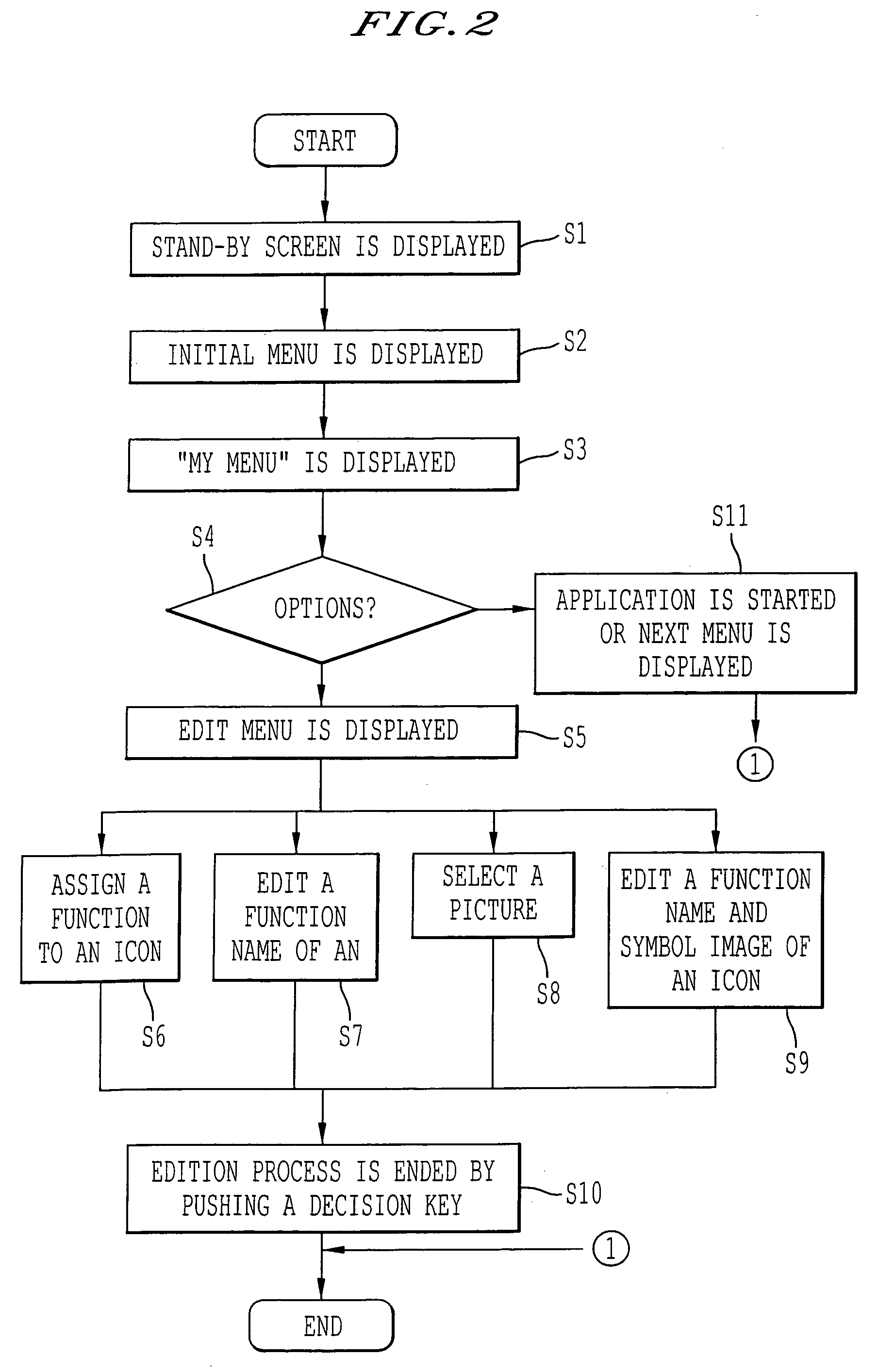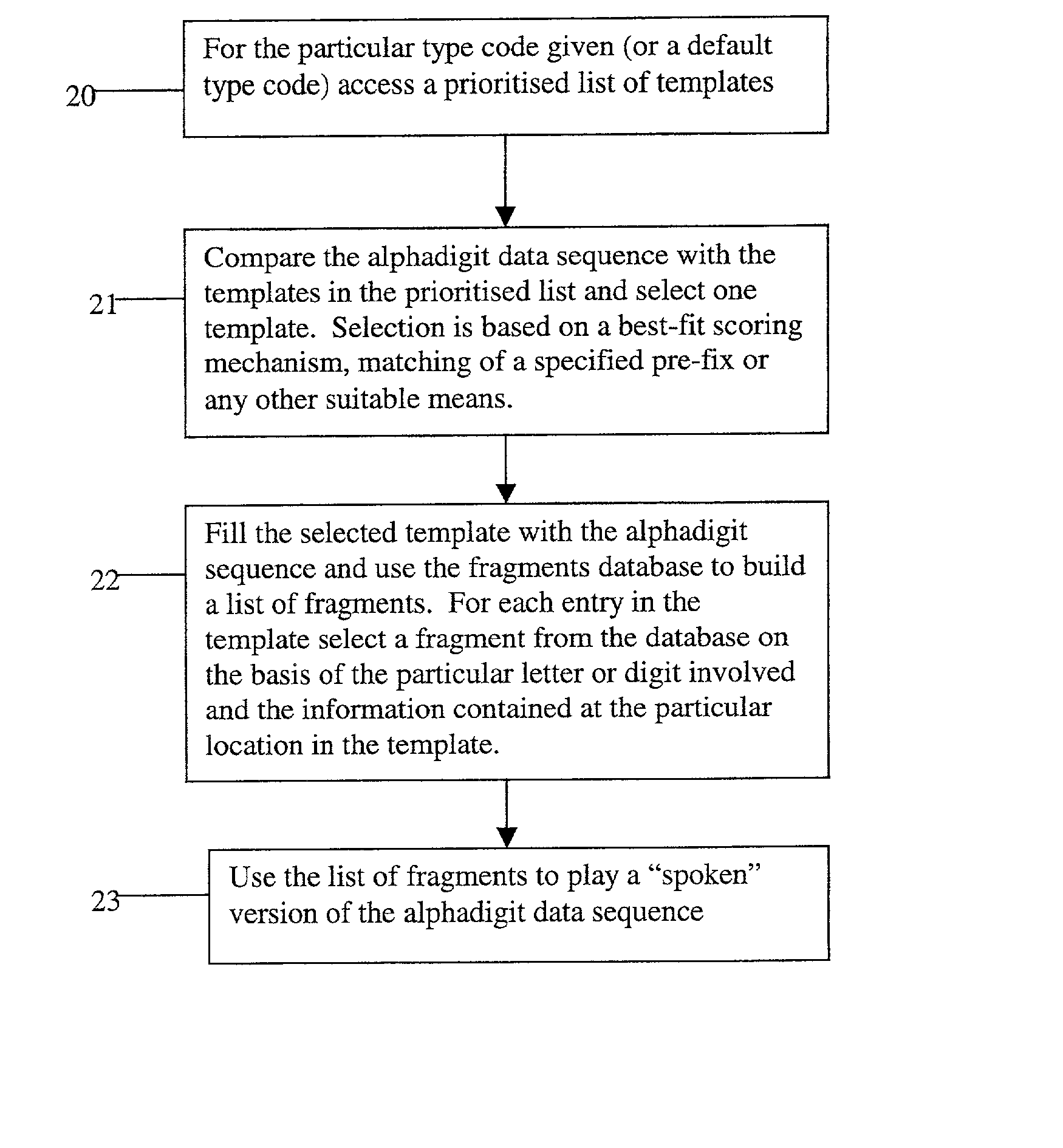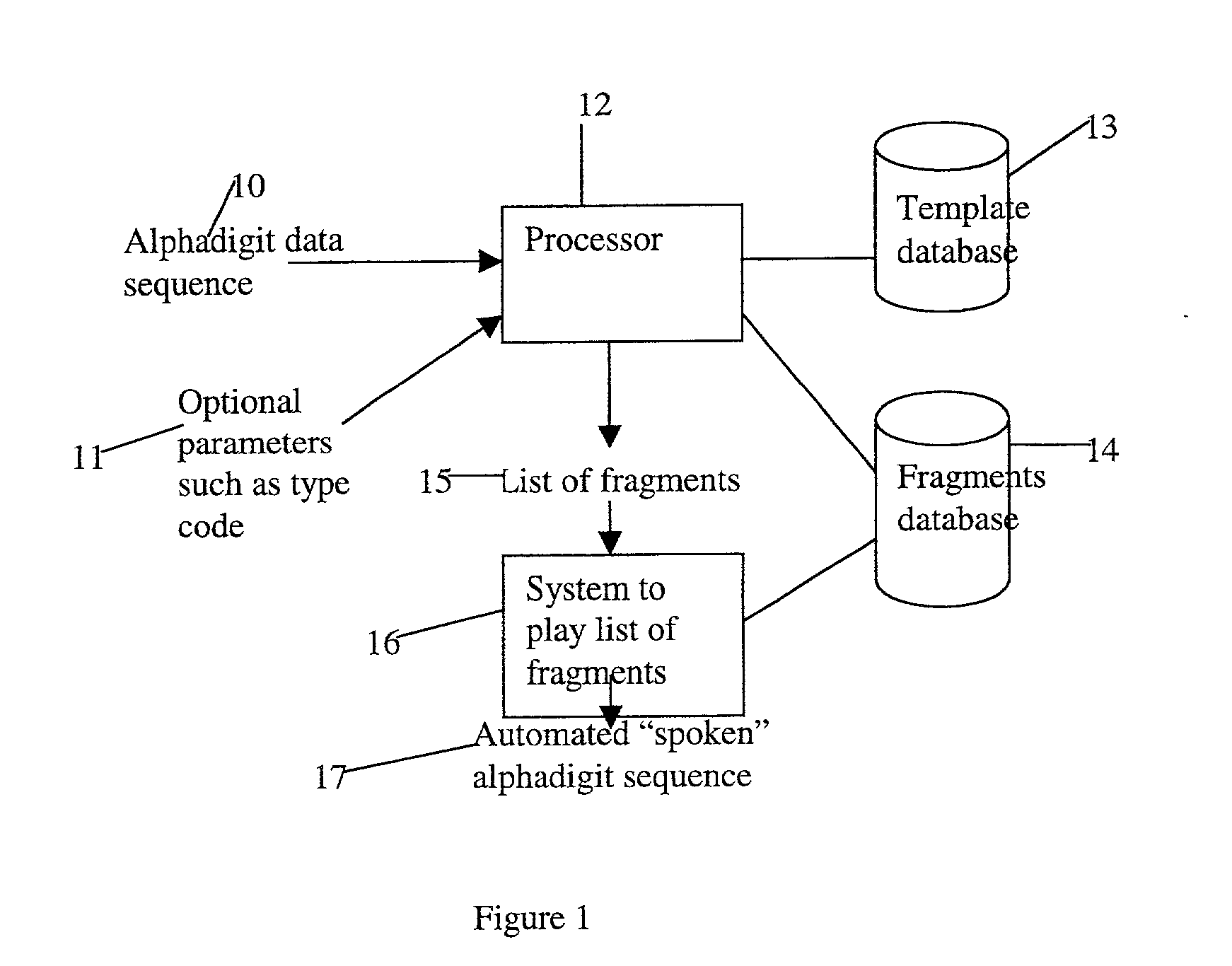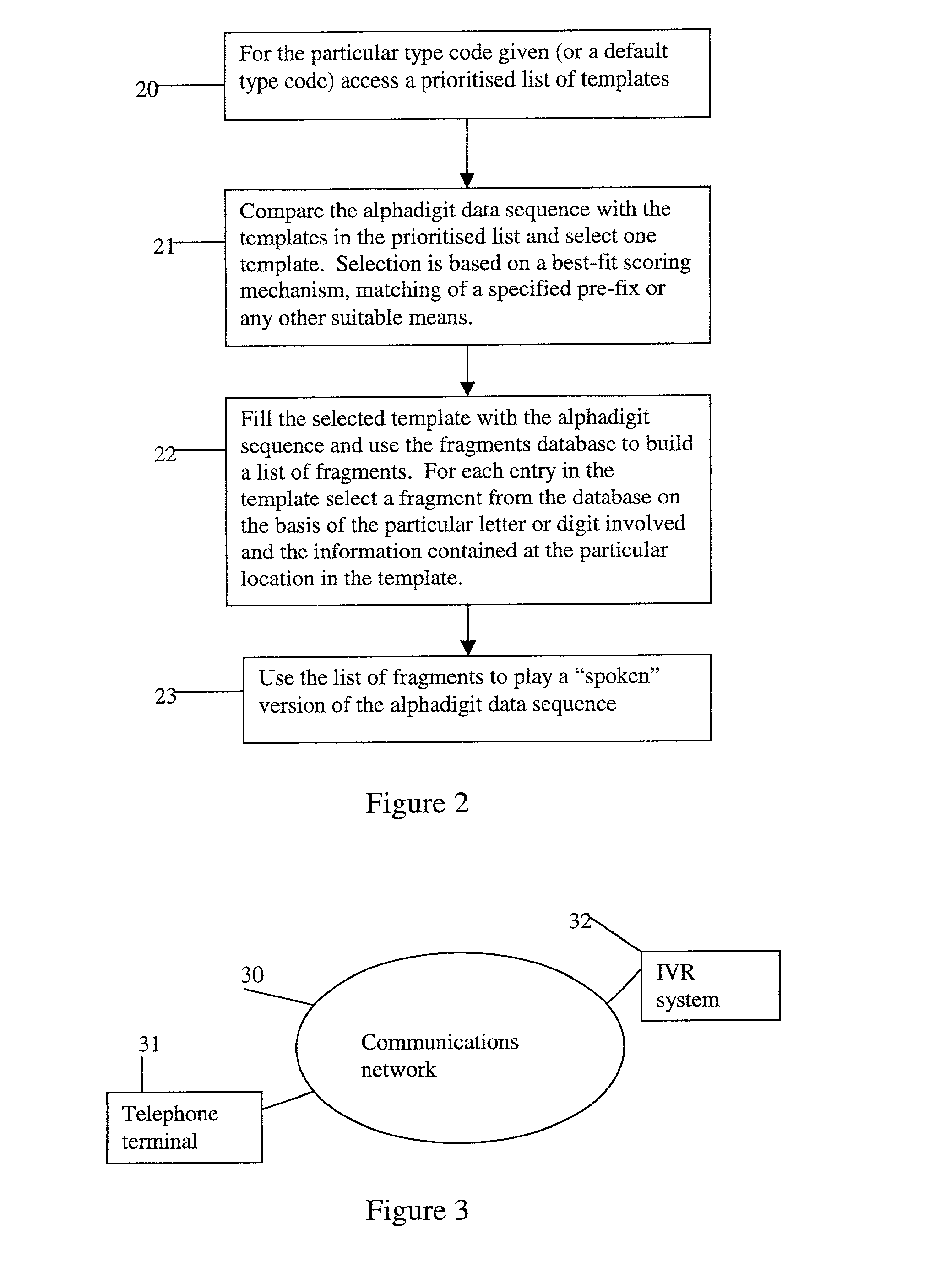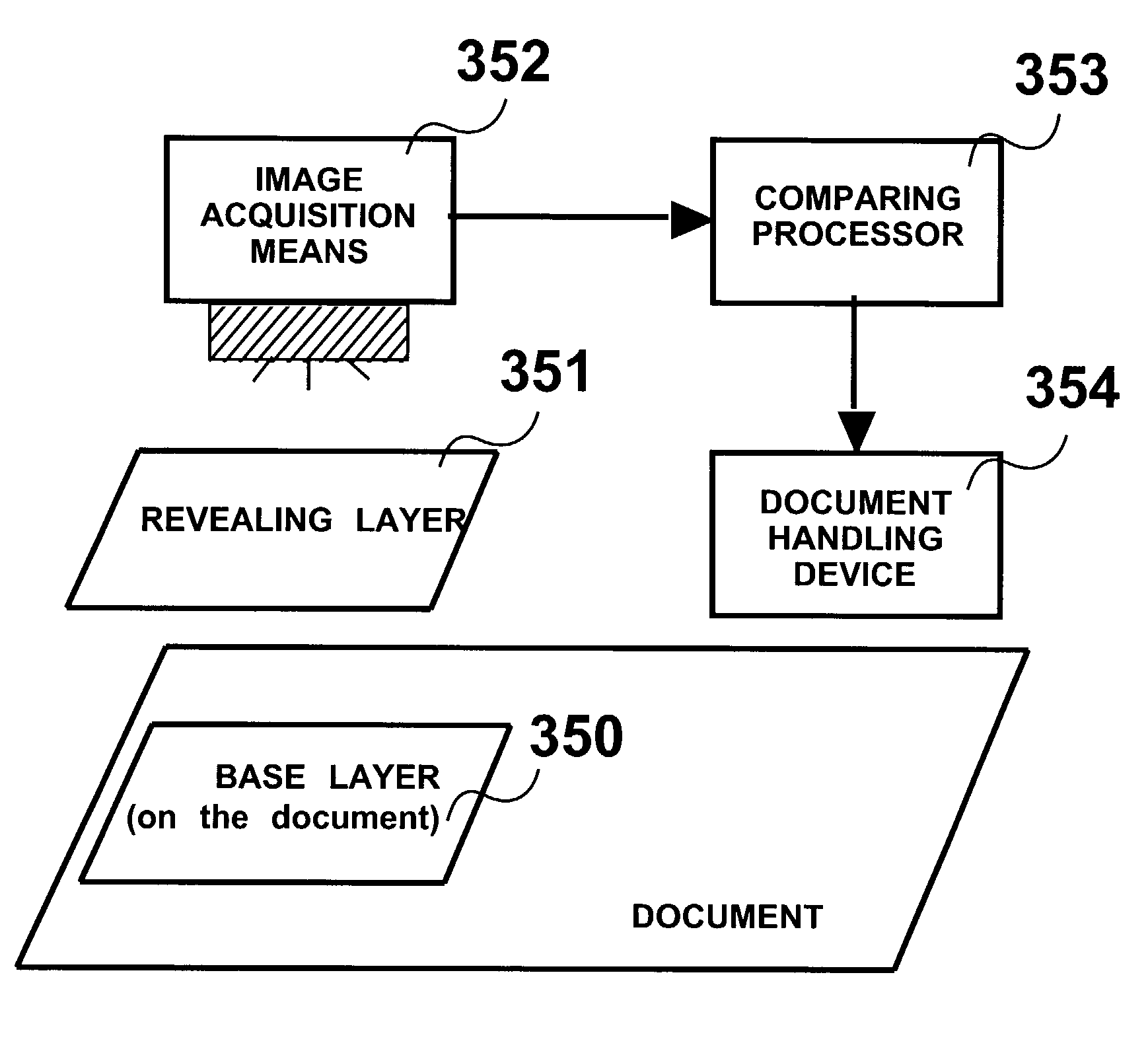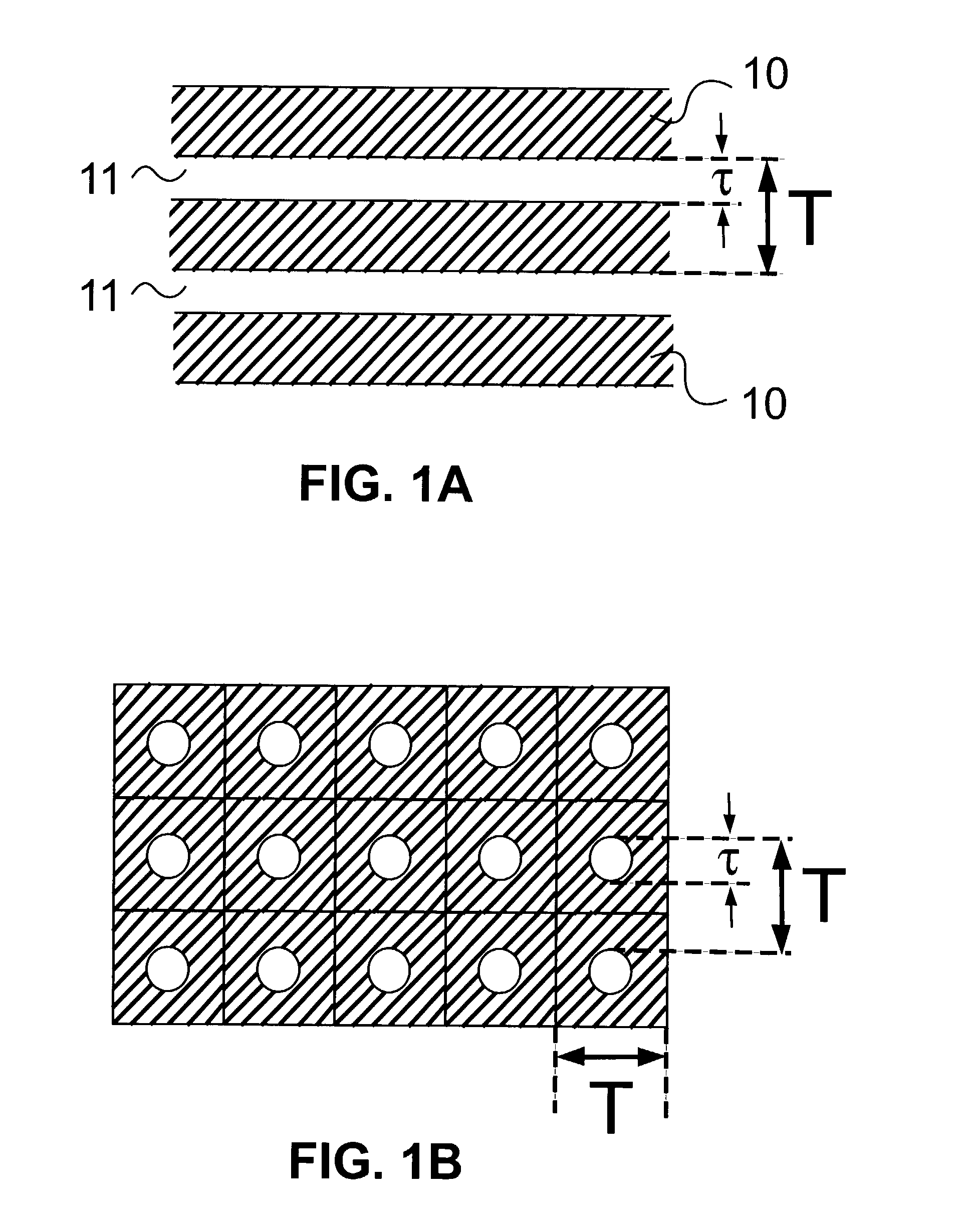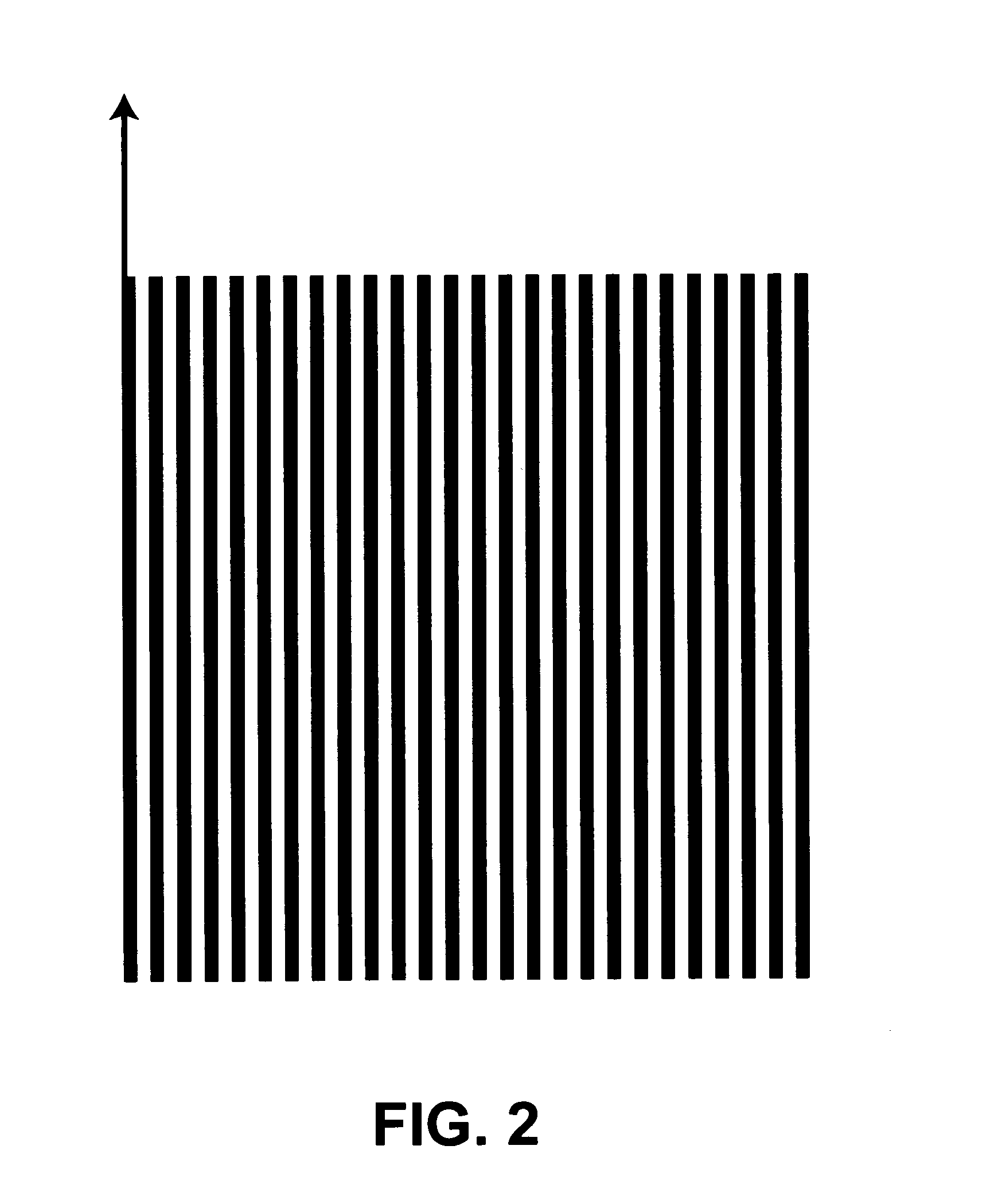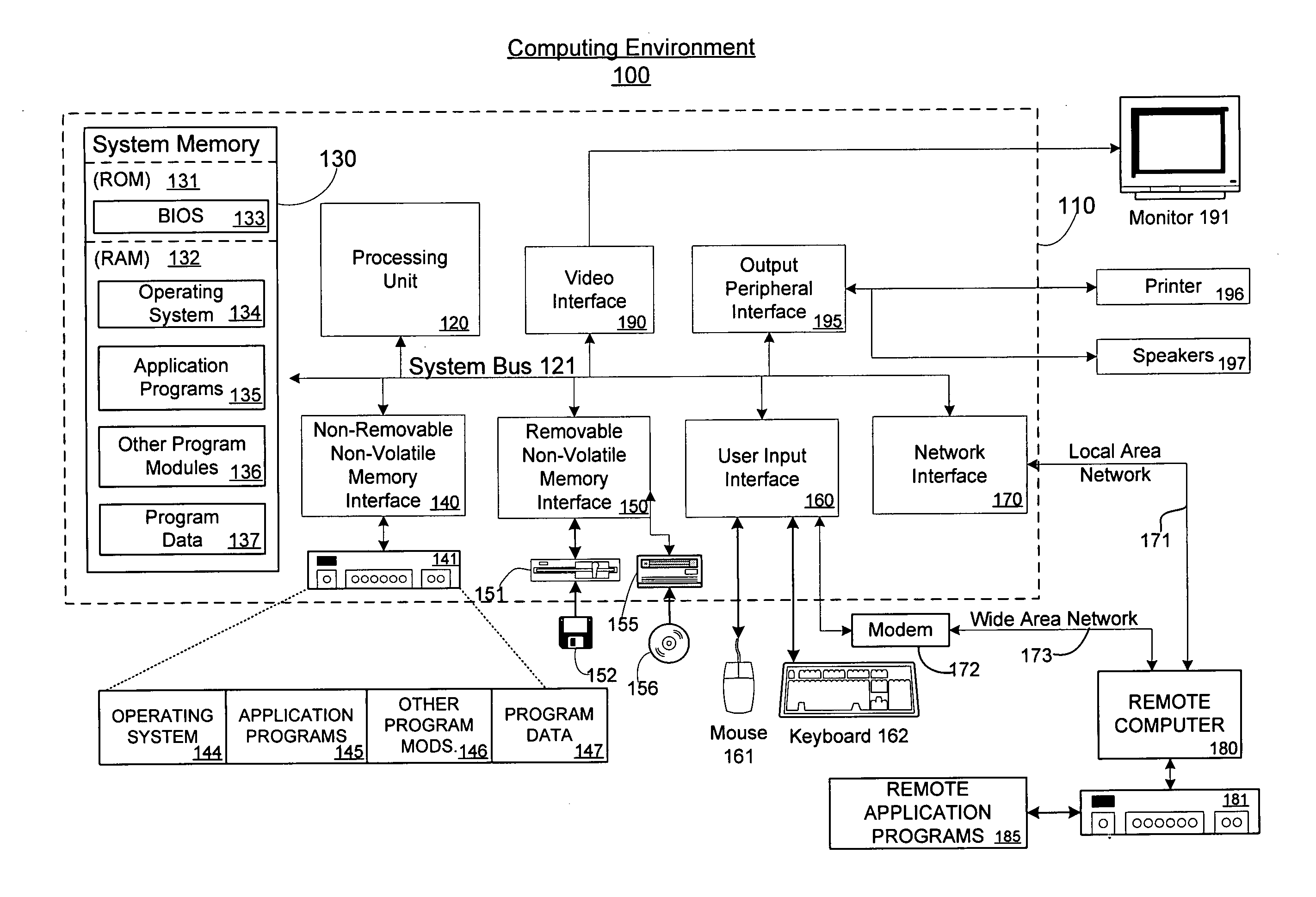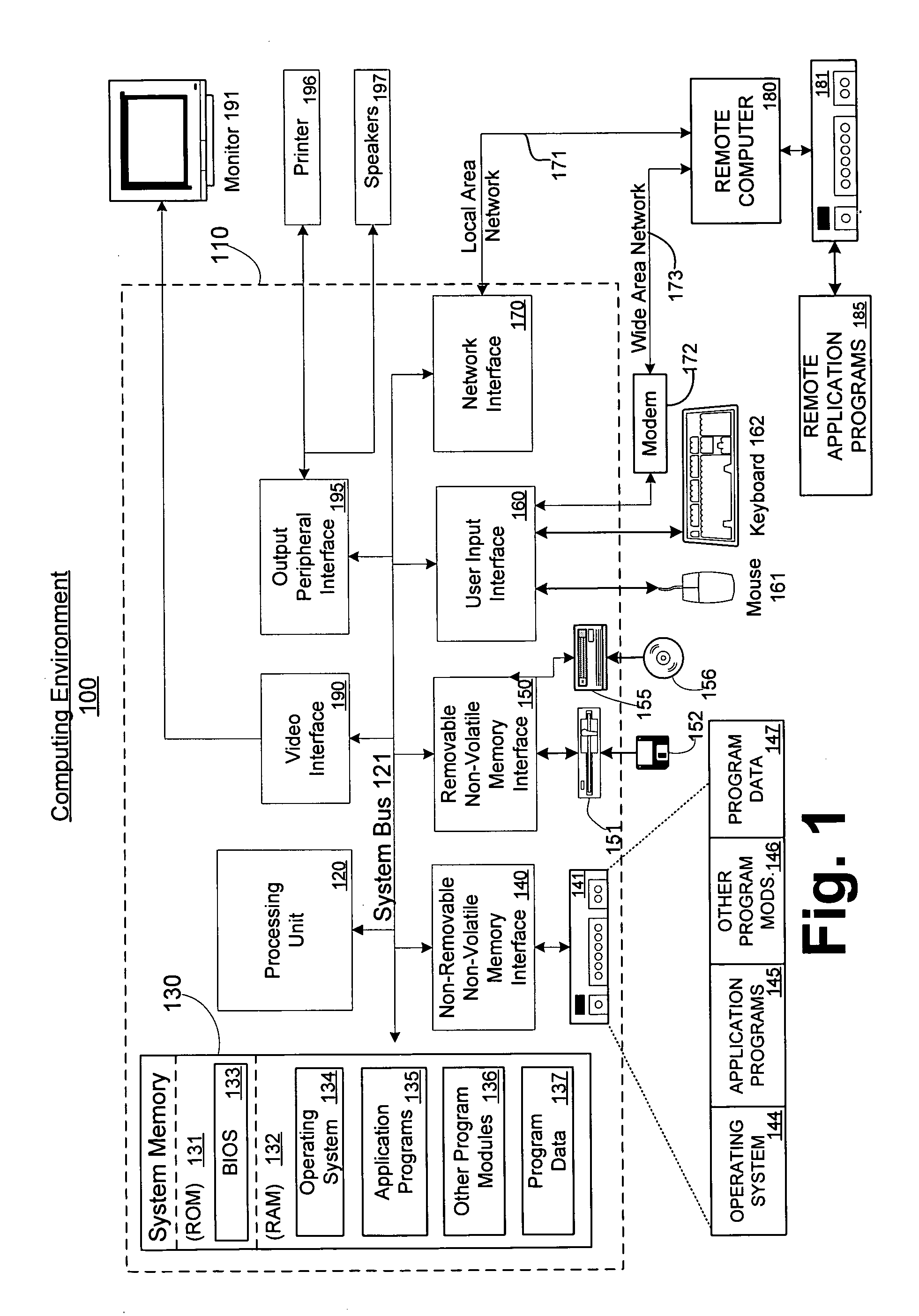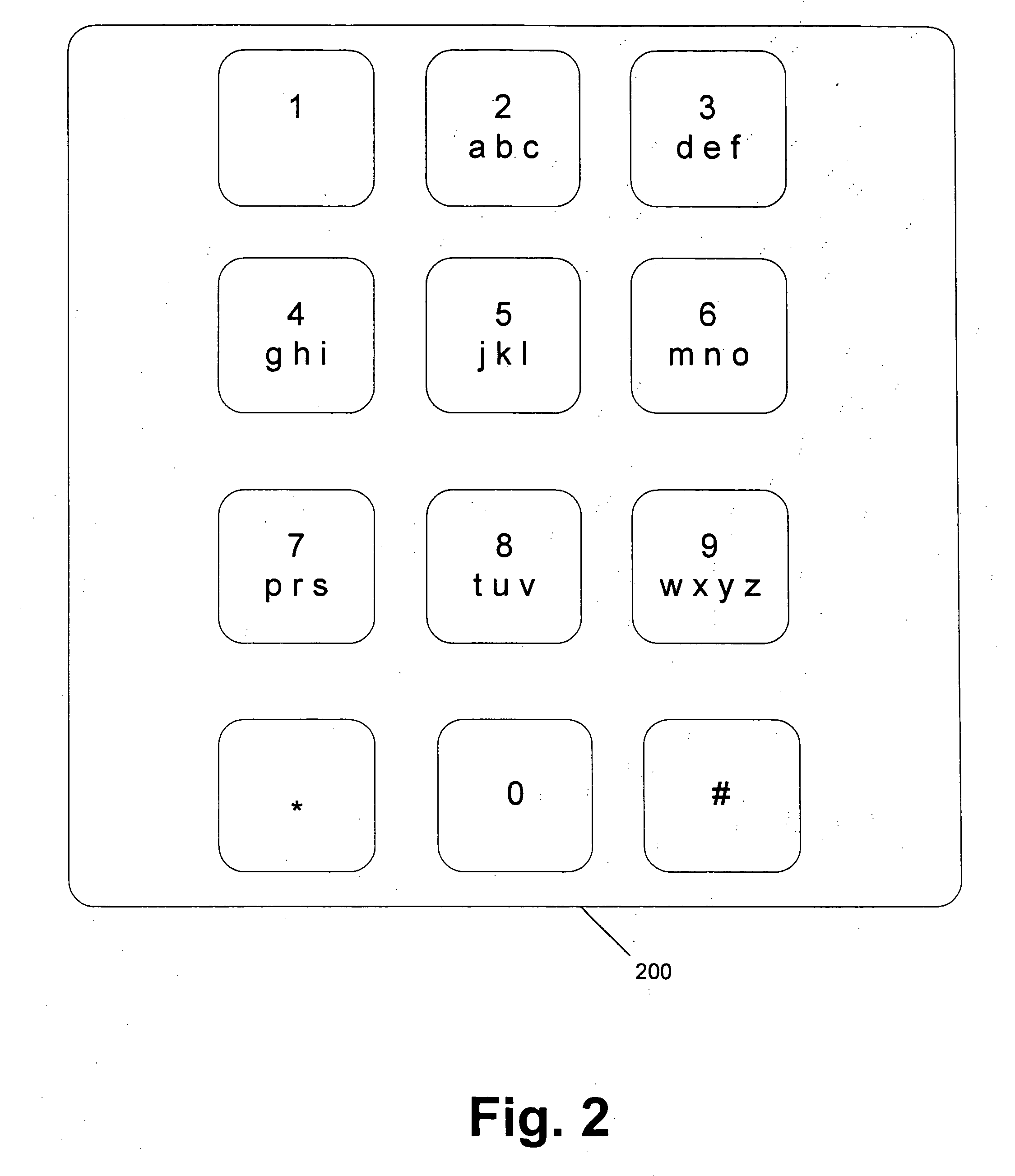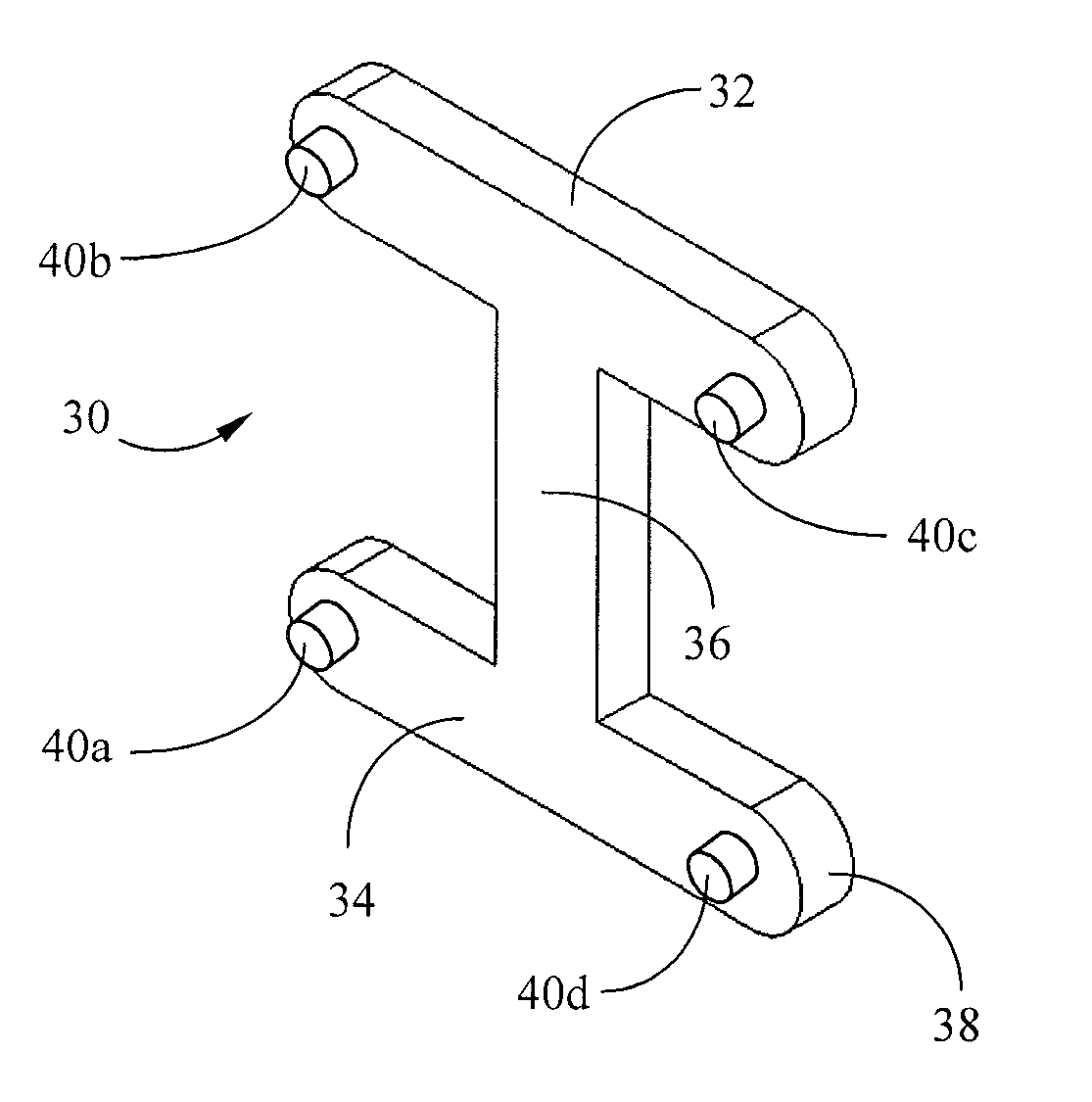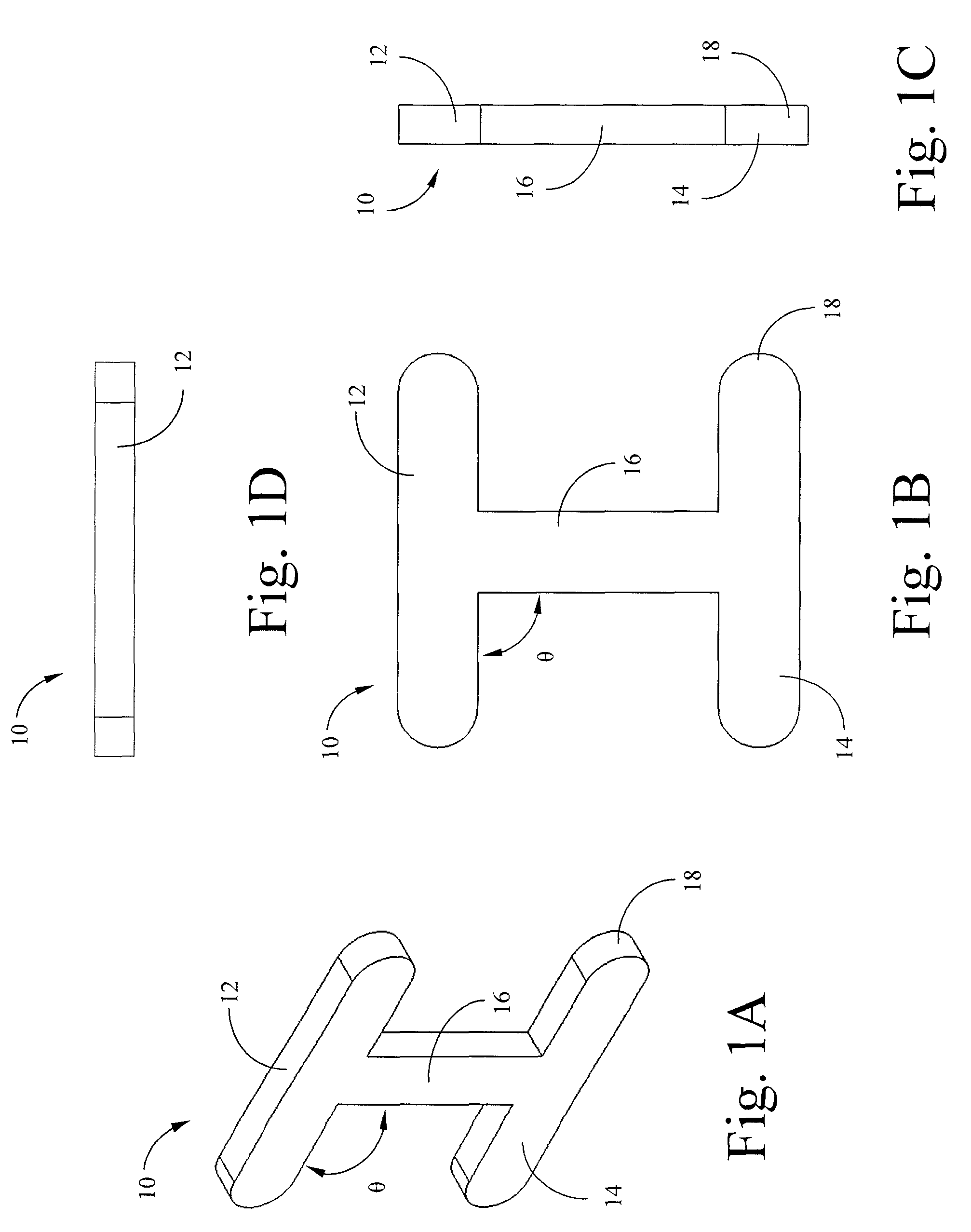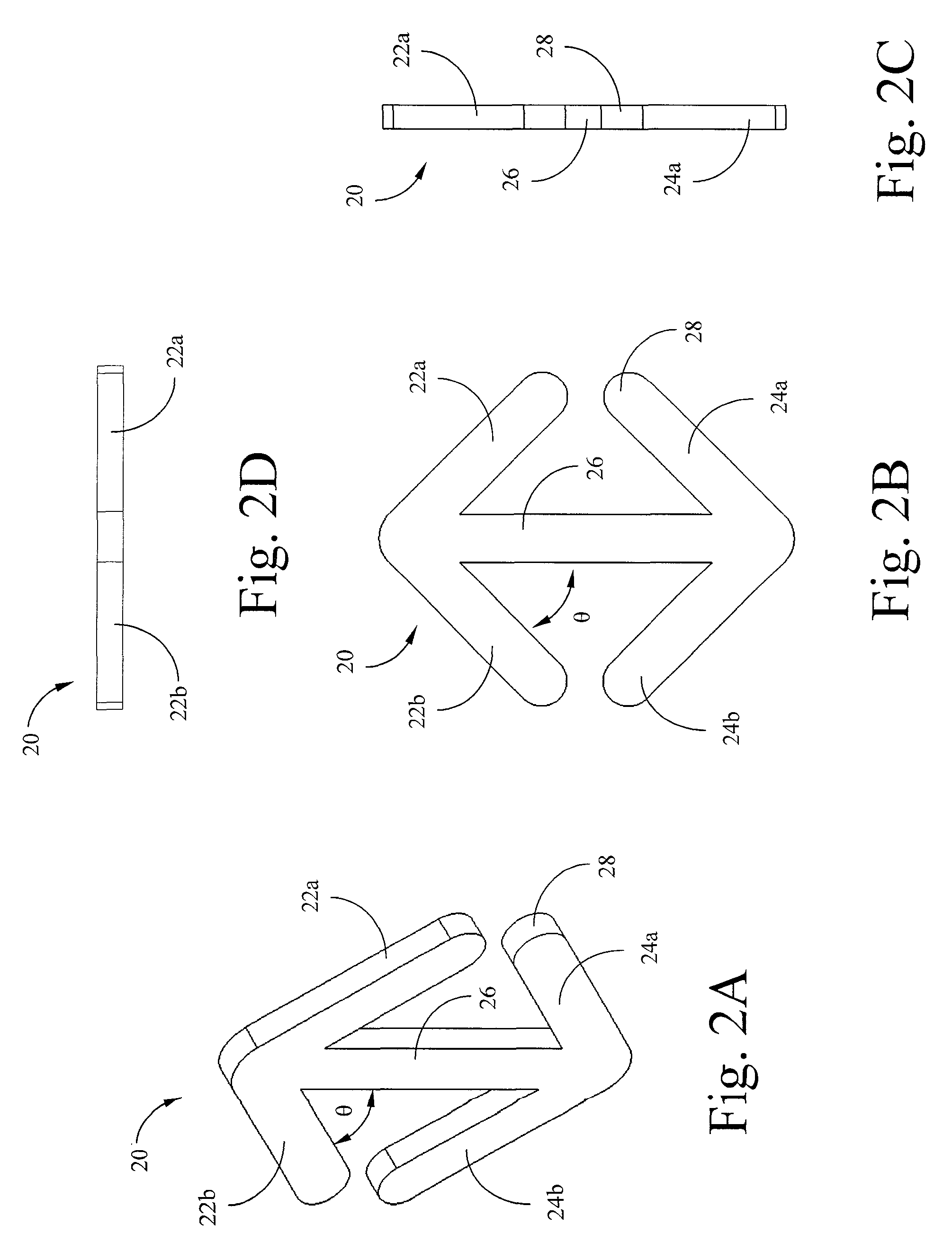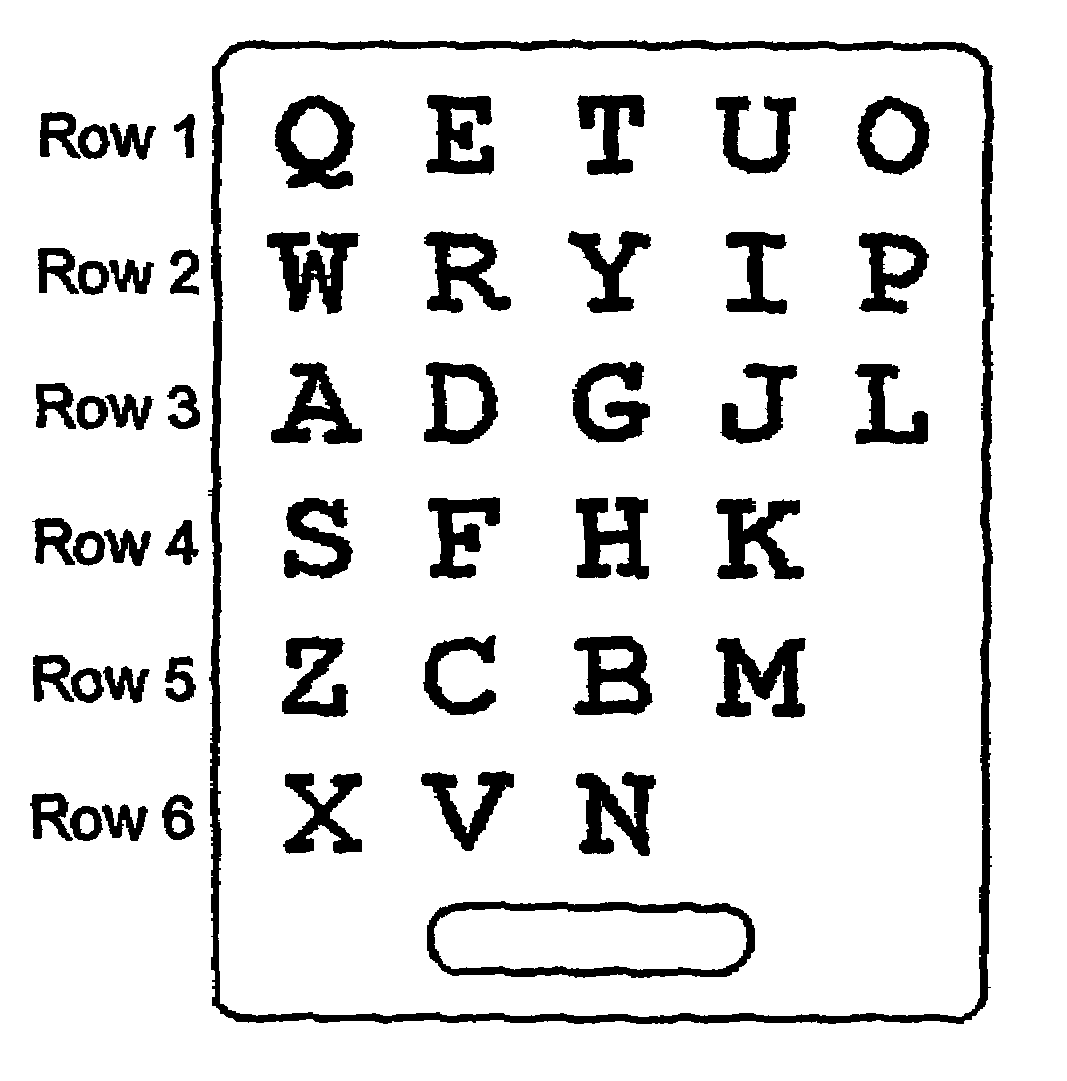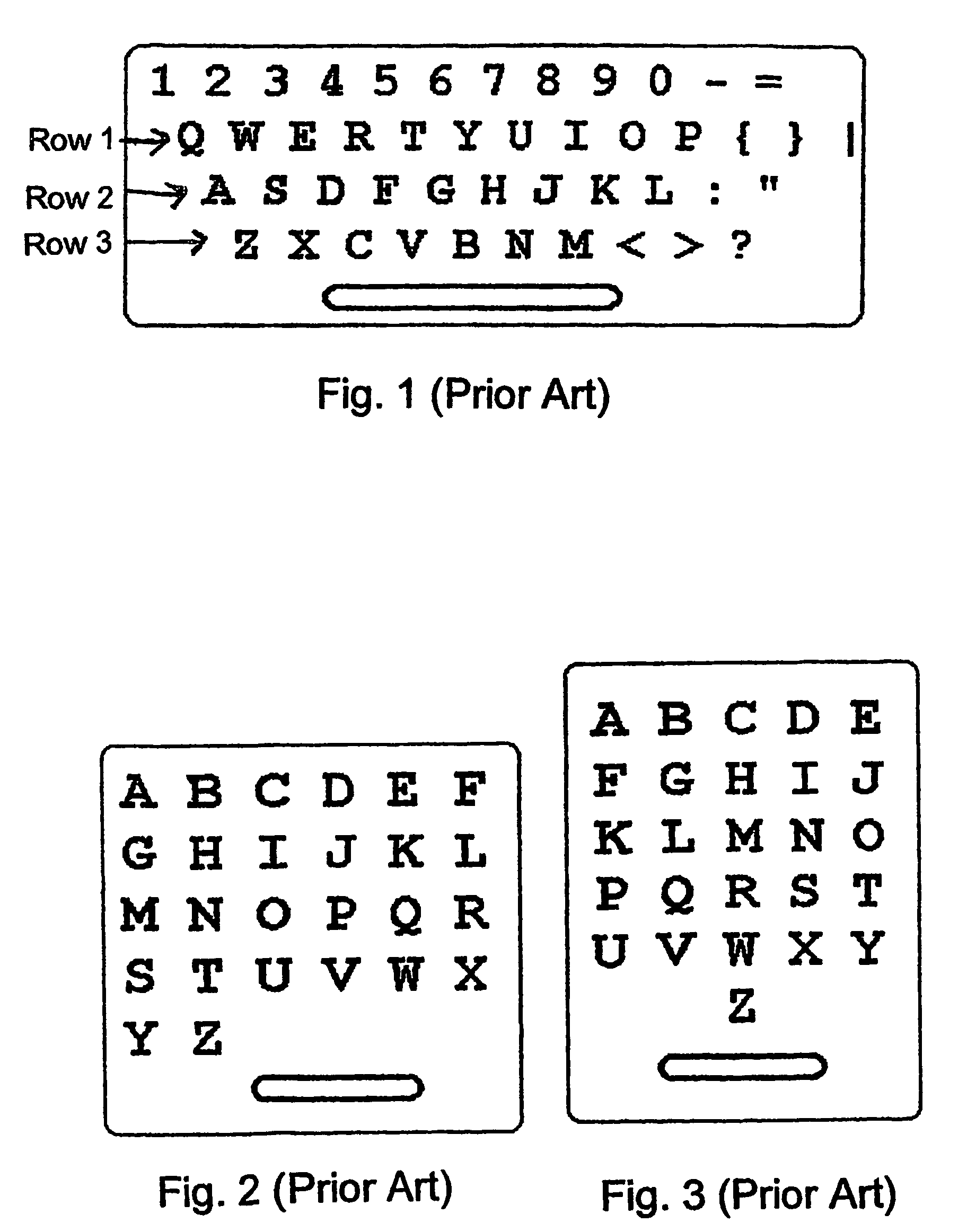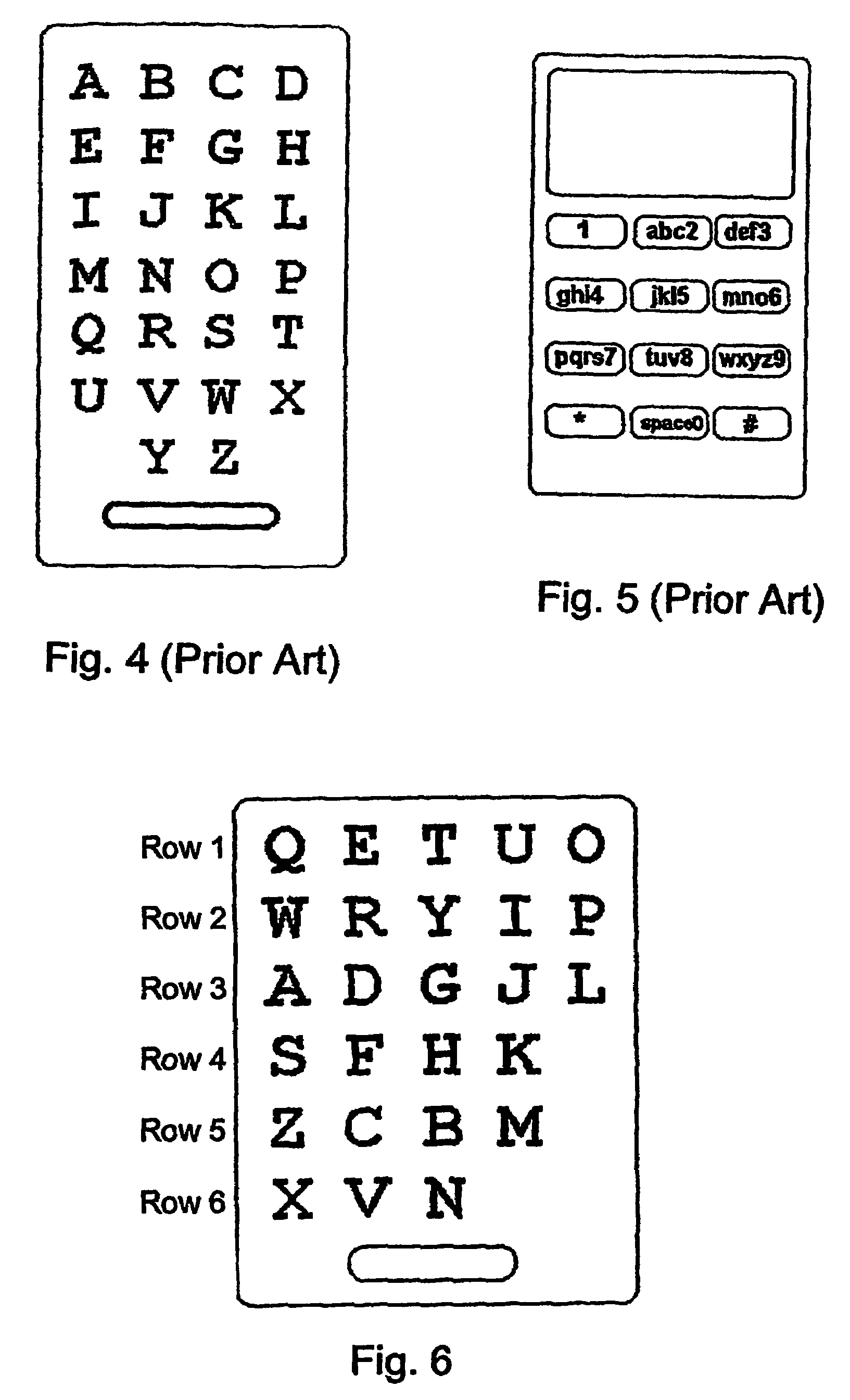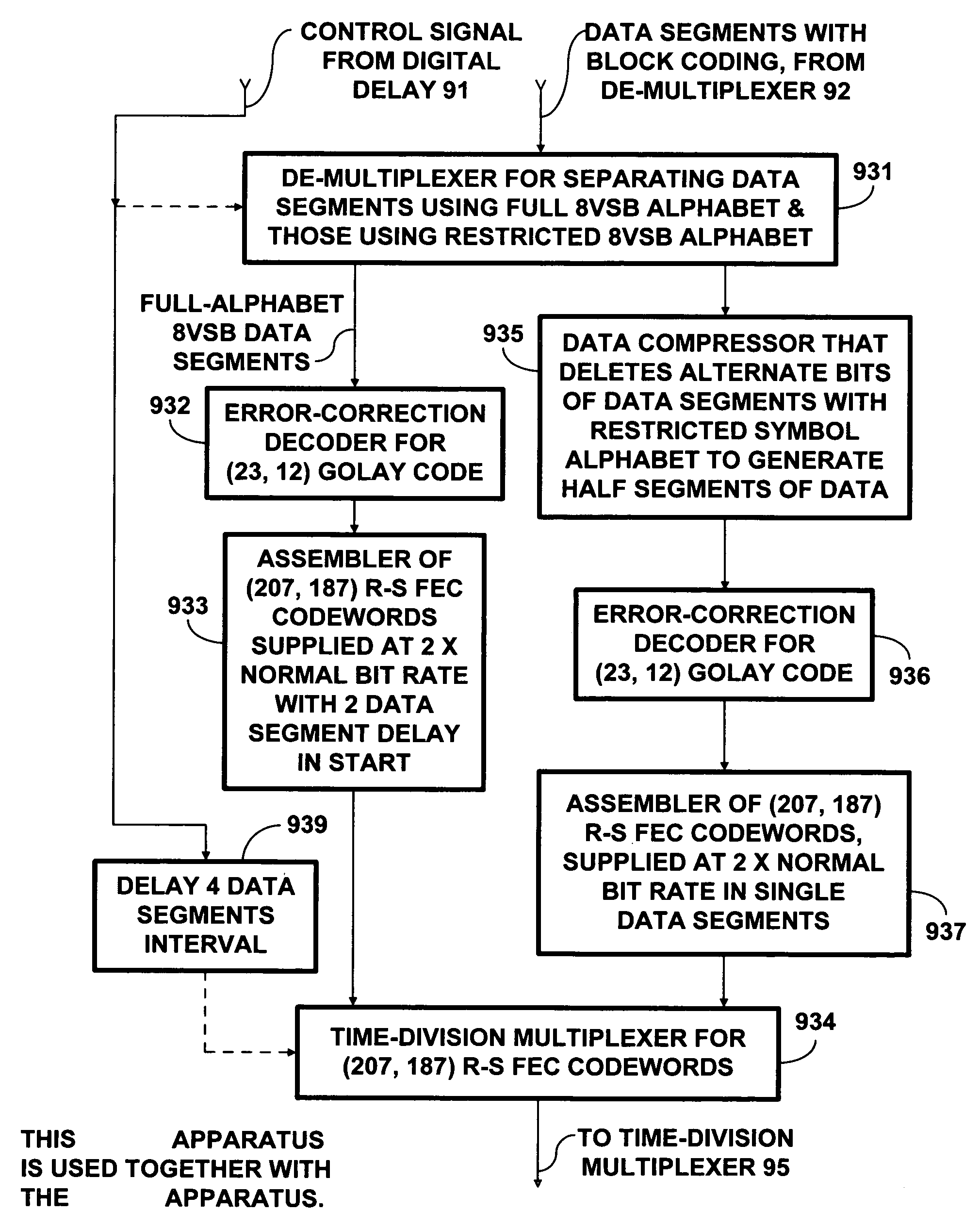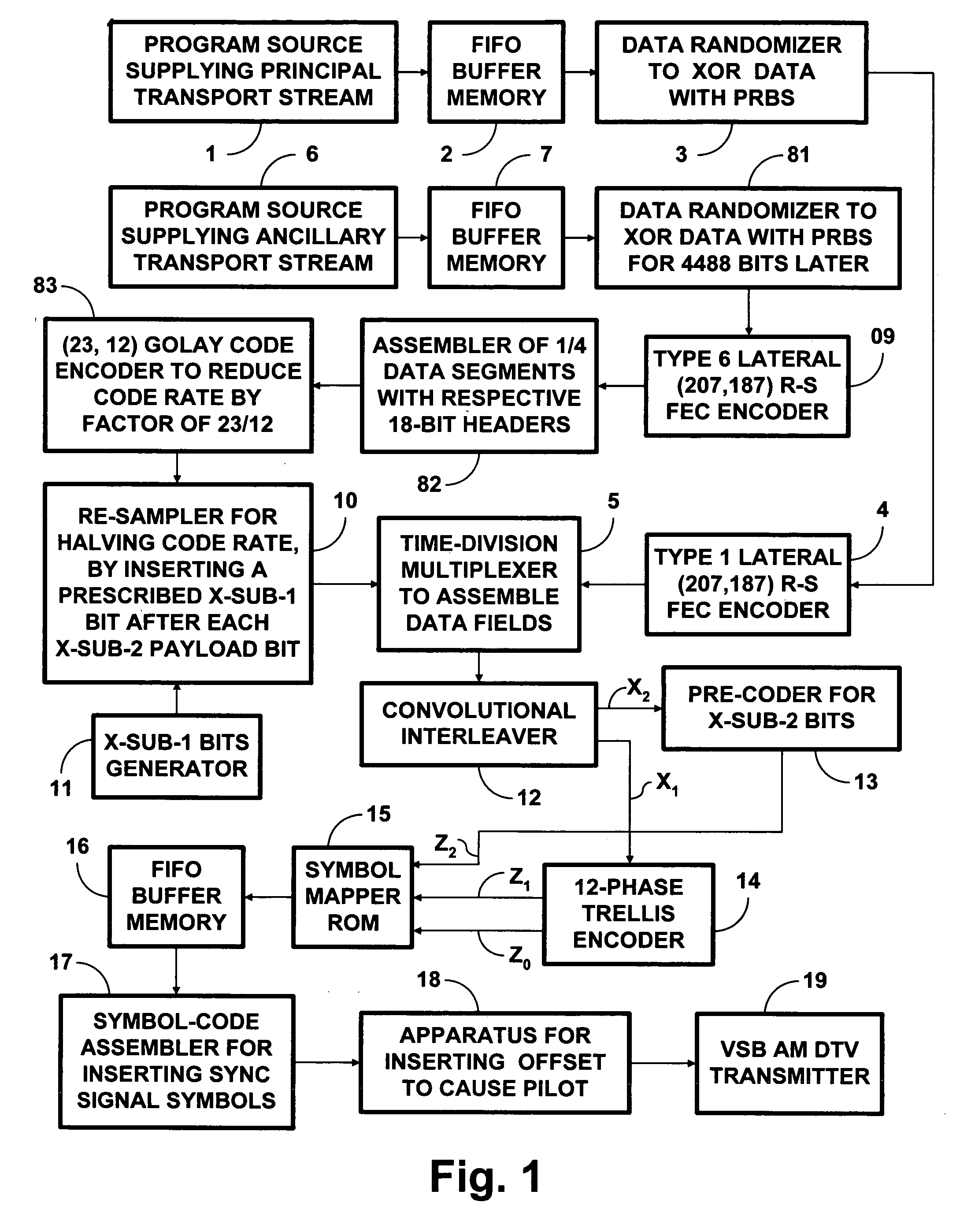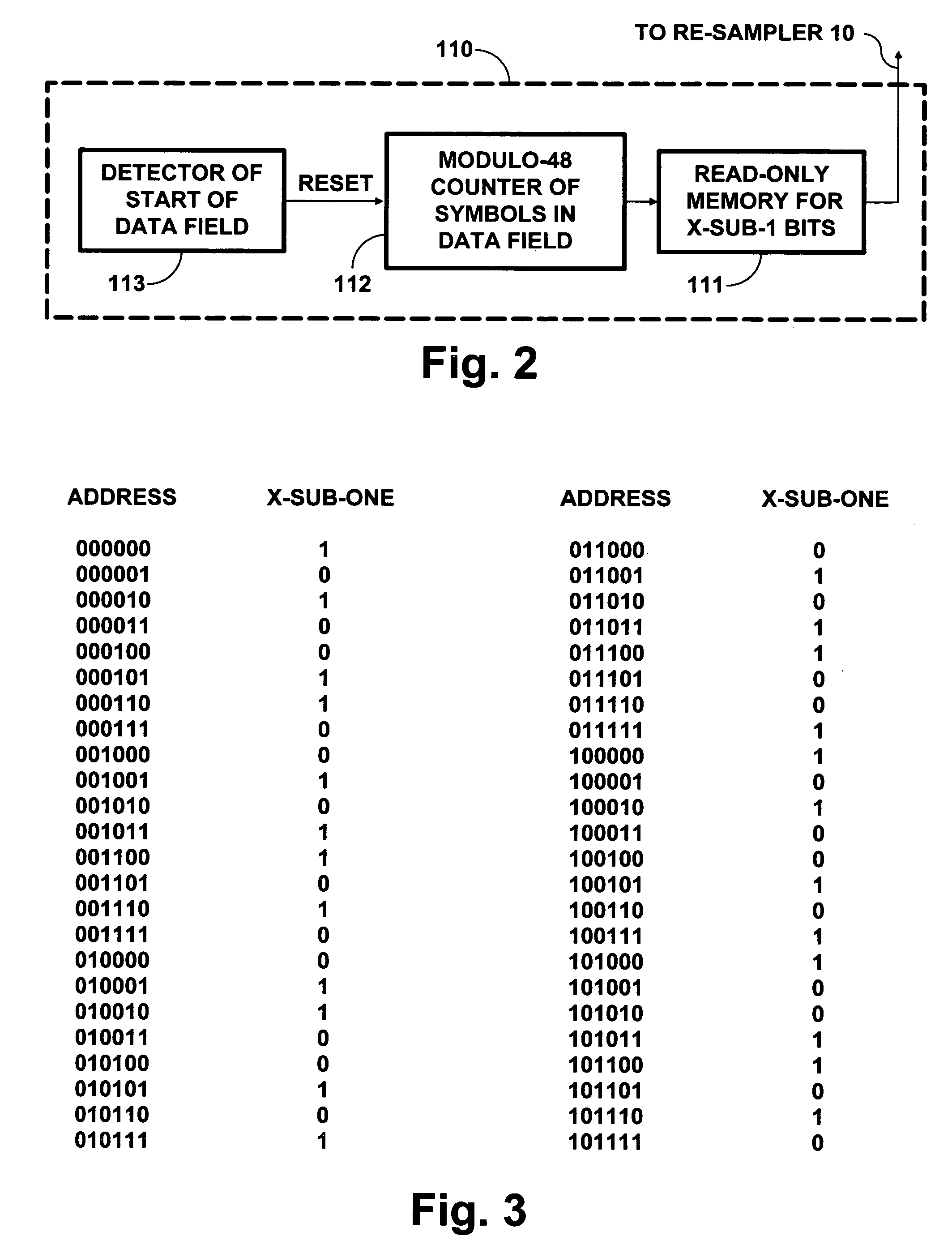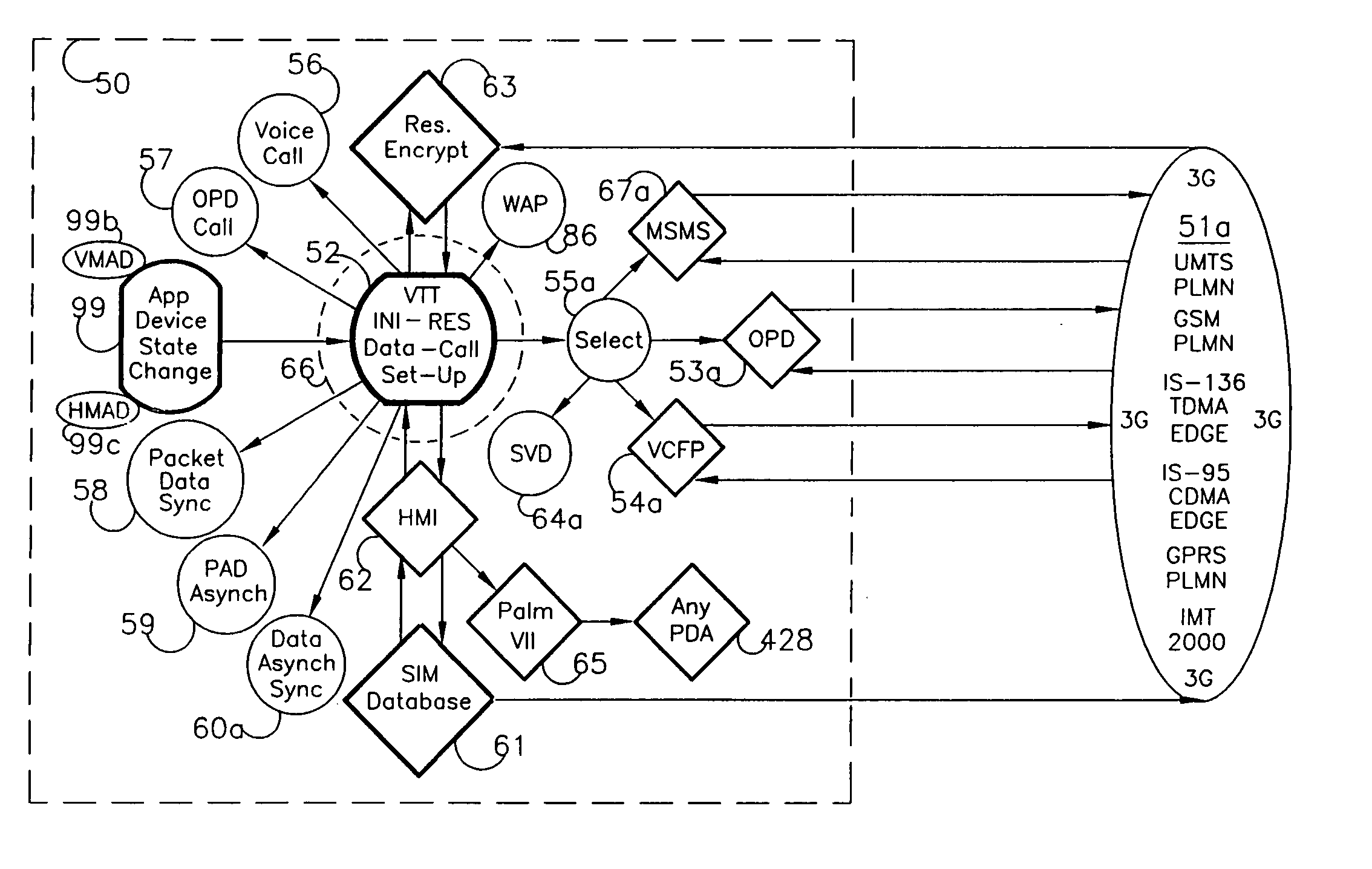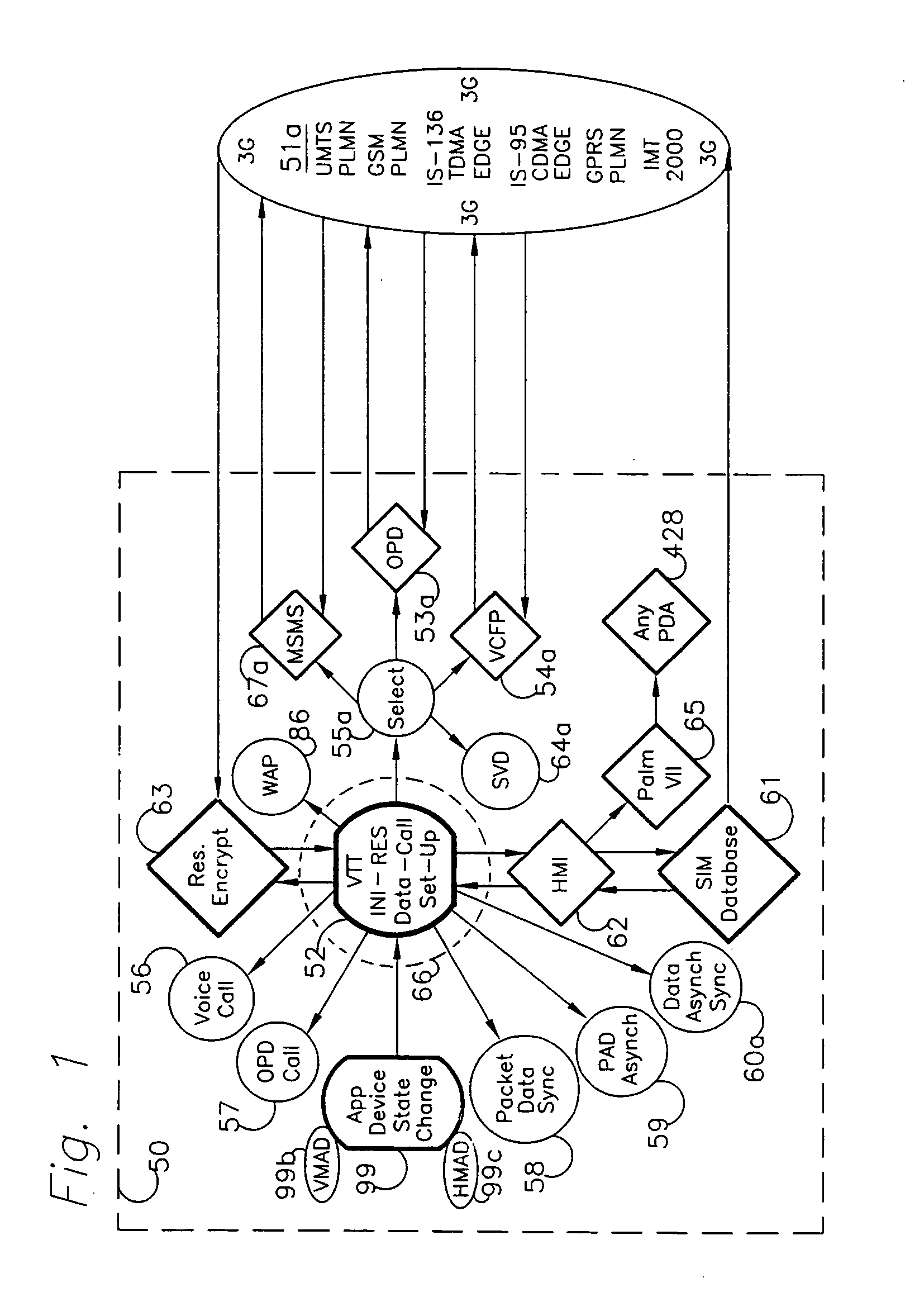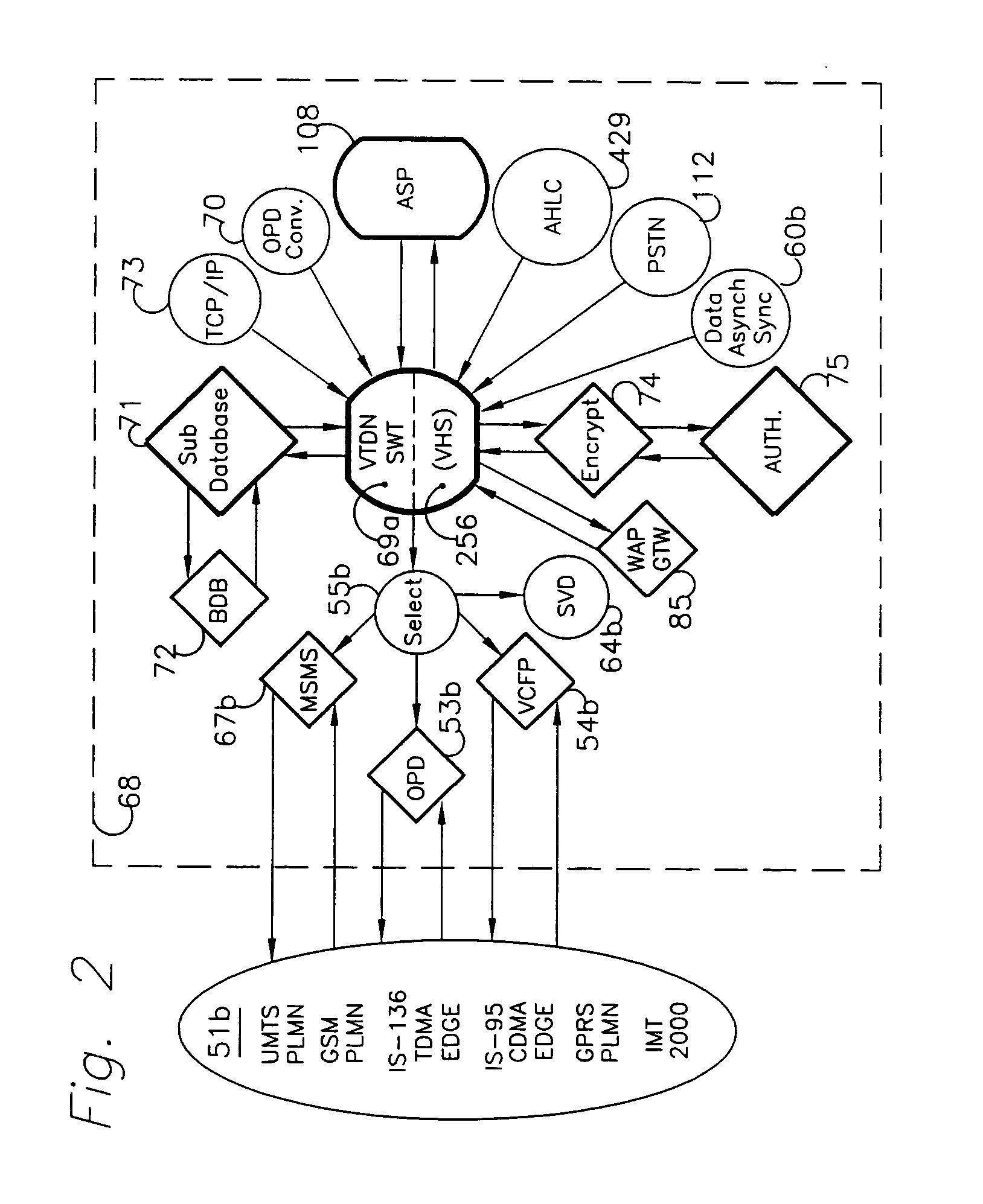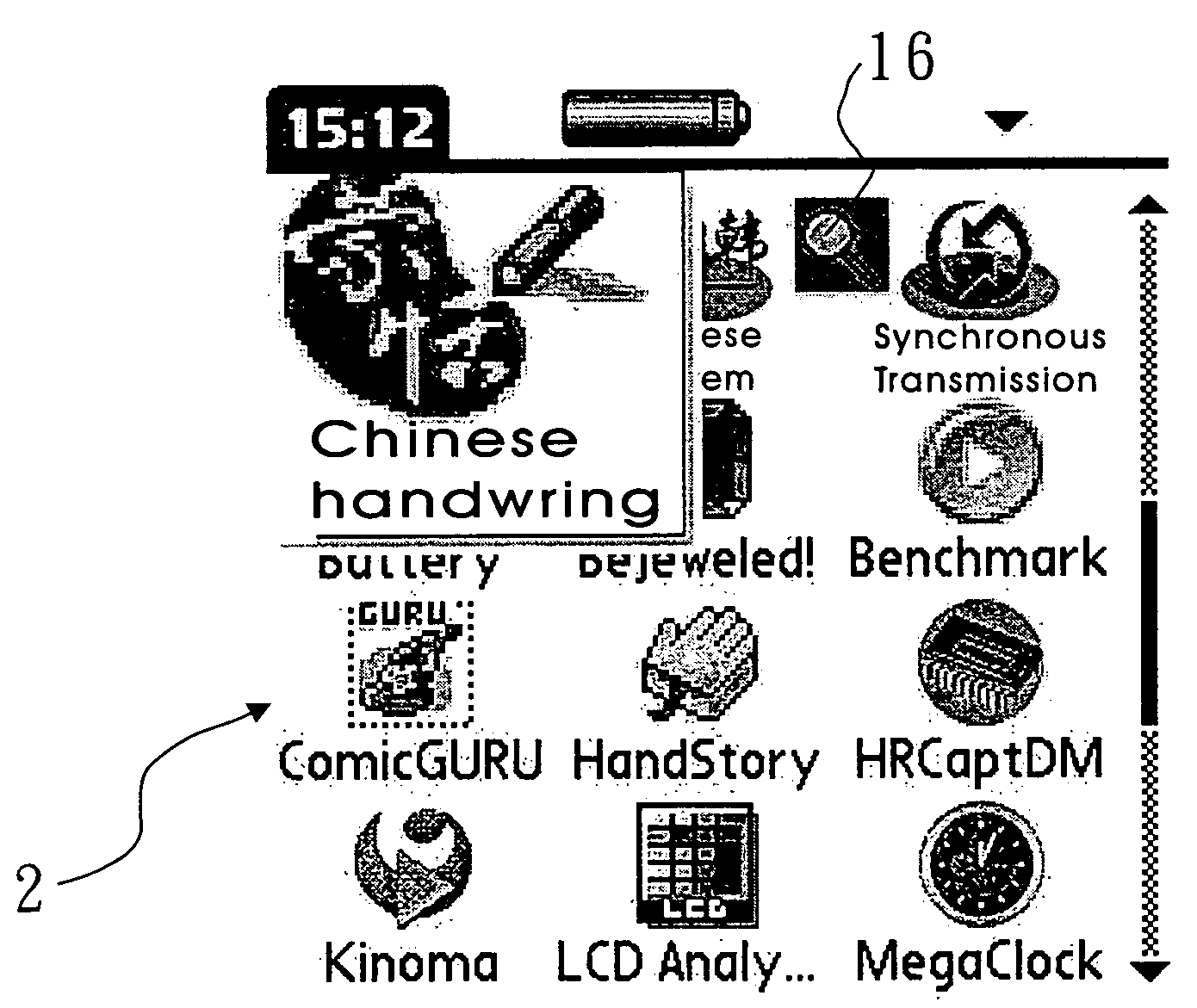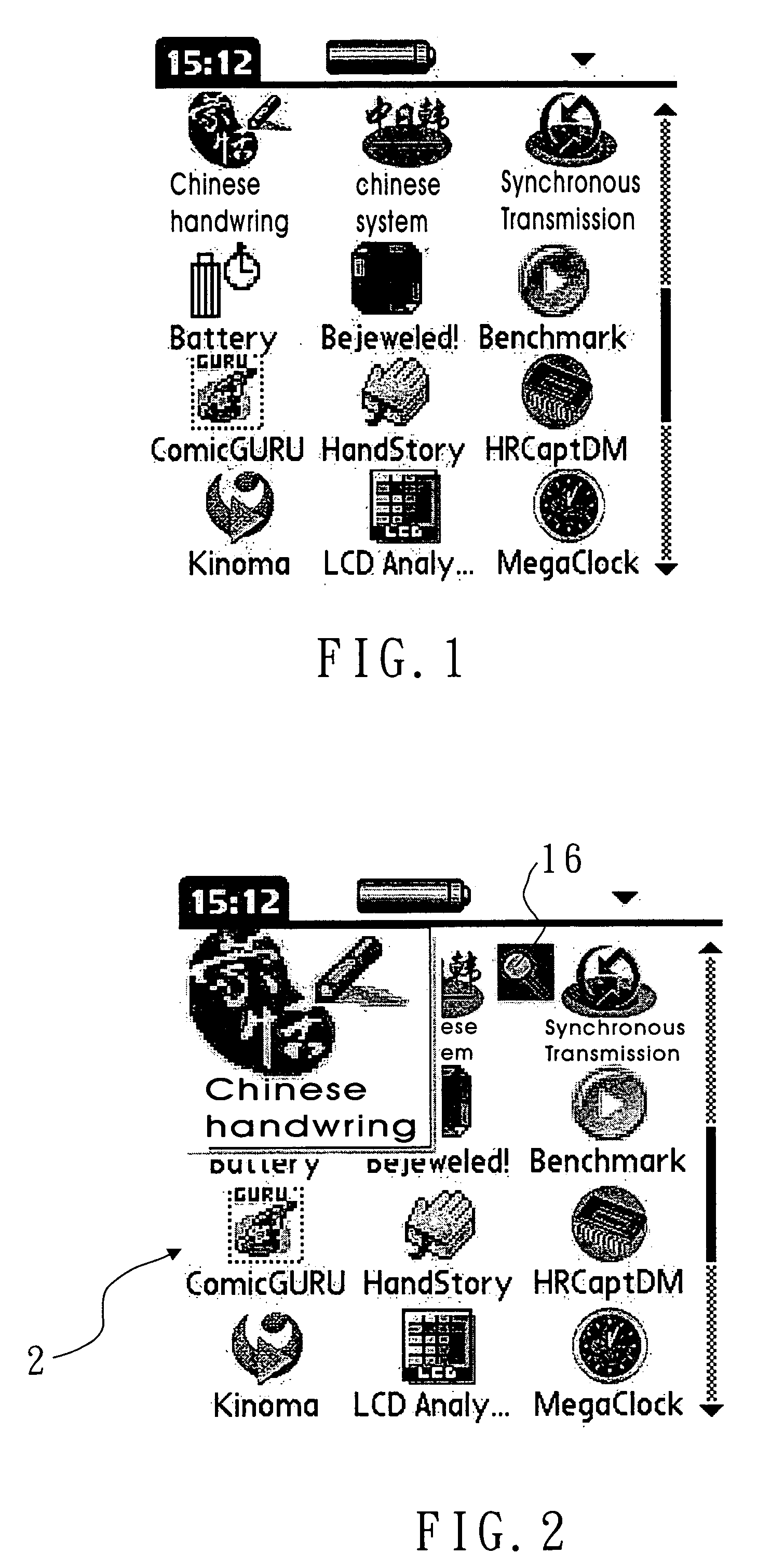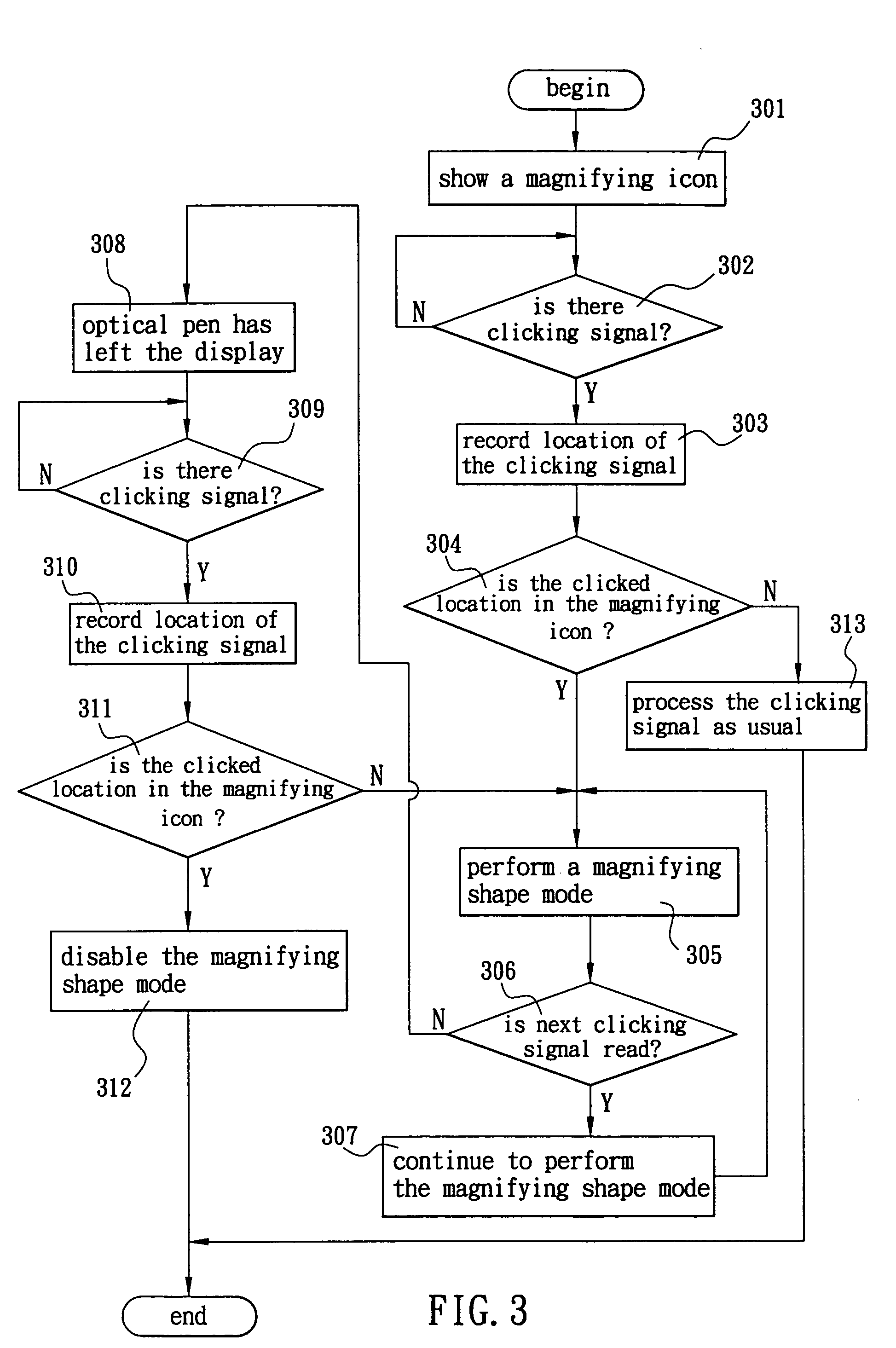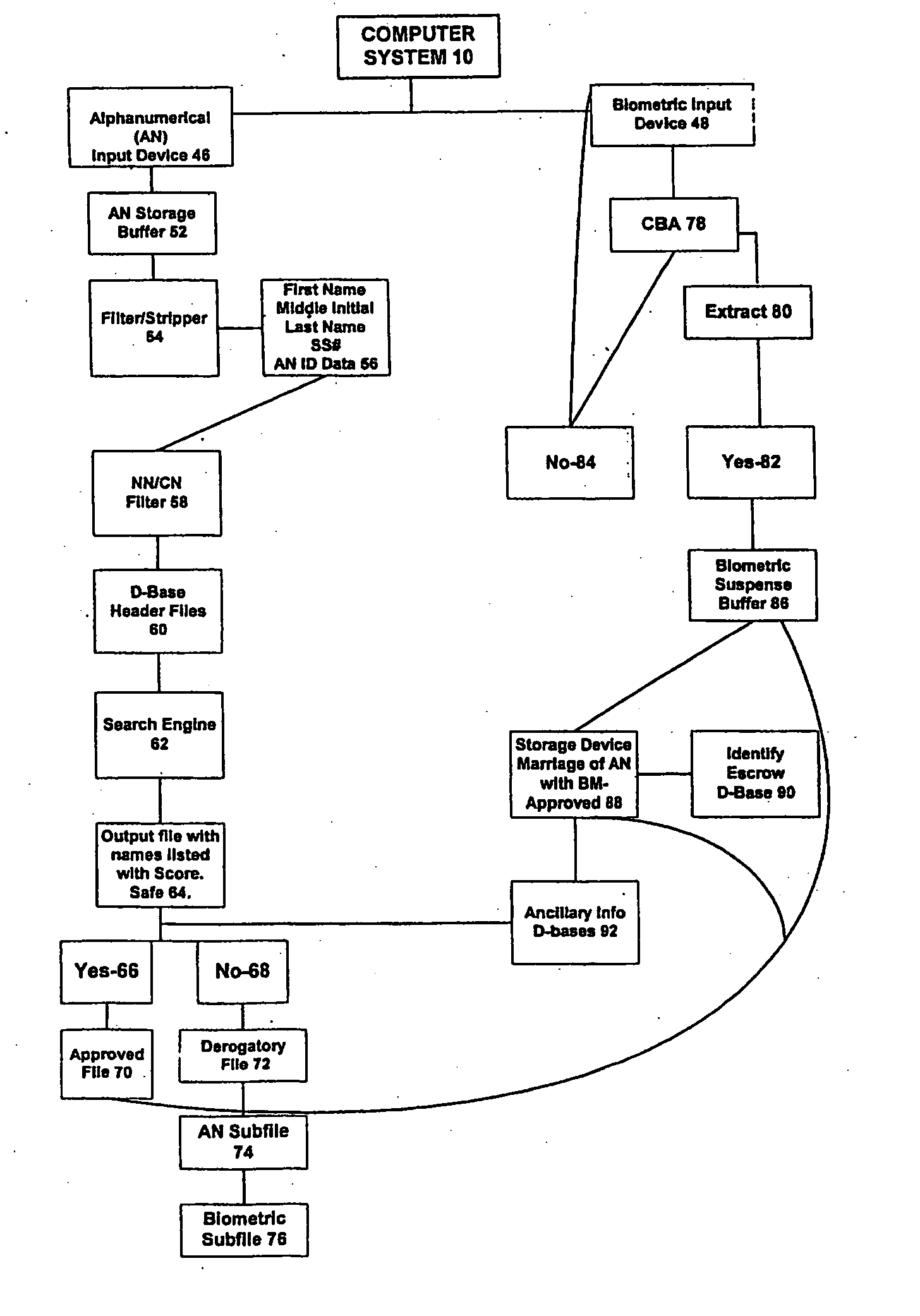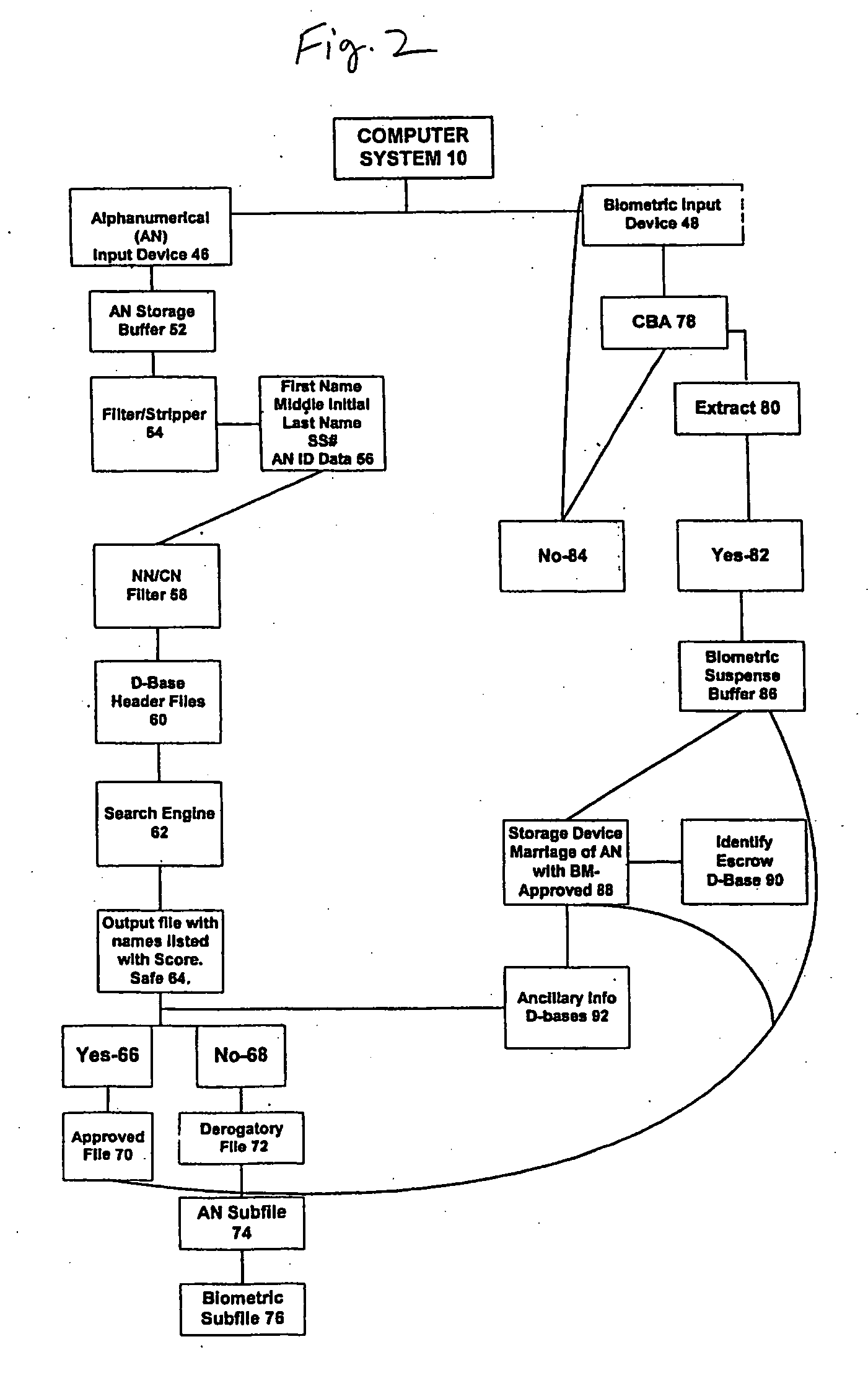Patents
Literature
Hiro is an intelligent assistant for R&D personnel, combined with Patent DNA, to facilitate innovative research.
2509 results about "Lettering" patented technology
Efficacy Topic
Property
Owner
Technical Advancement
Application Domain
Technology Topic
Technology Field Word
Patent Country/Region
Patent Type
Patent Status
Application Year
Inventor
In art, graphic design and typography, lettering refers to the creation of hand-drawn letters to apply to an object or surface. For car enthusiasts, lettering refers to decals attached to the outside paint or tires of their car.
System and method for continuous stroke word-based text input
InactiveUS7453439B1Reduce in quantityIncrease text entry speedInput/output for user-computer interactionCathode-ray tube indicatorsDistractionText entry
The disclosed System enables a small virtual keyboard on a touch-screen to be used to enter a word by contacting the keyboard on or near the key of the first letter, tracing through or near the key of each letter in sequence, and lifting the stylus from the keyboard in the vicinity of the key of the last letter. The input pattern is matched by scoring it against words in a database which includes an indication of relative frequency. A correctly spelled word is matched even when the input pattern corresponds to an incorrect spelling of a word. Words are ranked according to a score calculated from the weighted distances from each associated key to determined input path points, further weighted by the frequency of use and by other characteristics of the input path. Alternate word choices are presented to the user in a manner to minimize distraction.
Owner:CERENCE OPERATING CO
System and method for continuous stroke word-based text input
ActiveUS7098896B2Reduce in quantityIncrease text entry speedInput/output for user-computer interactionCathode-ray tube indicatorsText entryLettering
A method and system of inputting alphabetic text having a virtual keyboard on a touch sensitive screen. The virtual keyboard includes a set of keys where an each letter of alphabet is associated with at least one key. The present invention allows someone to use the virtual keyboard with continuous contact of the touch sensitive screen. The user traces an input pattern for word by starting at or near the first letter in a decided word and then tracing through or near each letter in sequence. The present invention then generates a list of possible words associated with the entered part and presents it to user for selection.
Owner:CERENCE OPERATING CO
Onetime passwords for smart chip cards
ActiveUS8095113B2Unauthorised/fraudulent call preventionEavesdropping prevention circuitsDisplay deviceFinancial transaction
A financial transaction card is provided according to various embodiments described herein. The financial transaction card includes a card body with at least a front surface and a back surface. The financial transaction card may also include a near field communications transponder and / or a magnetic stripe, as well as a digital display configured to display alphanumeric characters on the front surface of the card body. The financial transaction card may also include a processor that is communicatively coupled with the near field communications transponder or magnetic stripe and the digital display. The processor may be configured to calculate one-time passwords and communicate the one-time passwords to both the near filed communications transponder or magnetic stripe and the digital display.
Owner:FIRST DATA
Training and using pronunciation guessers in speech recognition
InactiveUS7467087B1Reduce frequencyReliable phonetic spellingSpeech recognitionSpeech synthesisWord modelSpeech identification
The error rate of a pronunciation guesser that guesses the phonetic spelling of words used in speech recognition is improved by causing its training to weigh letter-to-phoneme mappings used as data in such training as a function of the frequency of the words in which such mappings occur. Preferably the ratio of the weight to word frequency increases as word frequencies decreases. Acoustic phoneme models for use in speech recognition with phonetic spellings generated by a pronunciation guesser that makes errors are trained against word models whose phonetic spellings have been generated by a pronunciation guesser that makes similar errors. As a result, the acoustic models represent blends of phoneme sounds that reflect the spelling errors made by the pronunciation guessers. Speech recognition enabled systems are made by storing in them both a pronunciation guesser and a corresponding set of such blended acoustic models.
Owner:CERENCE OPERATING CO
Finger activated reduced keyboard and a method for performing text input
InactiveUS7508324B2Fast and comfortable text inputSmall sizeInput/output for user-computer interactionElectronic switchingText entryArea density
A reduced keyboard apparatus and method for use with small-sized communications and computing devices. Input via the keyboard is performed using fingers or thumbs. The keyboard is characterized by having no discrete boundaries between the included character spaces. The direction and the destination area of a keystroke do not have to be accurate and may correspond to a plurality of included character spaces. Each of the possible characters is provided with a probability value, continuously redefined according to the specific keyboard area activated by the keystroke. The input of a word is defined by a sequence of keystrokes corresponding to the letters of the word. Subsequent to the completion of a keystroke sequence, the apparatus and method determine the identity of the word through a disambiguation process based on area density distribution. The apparatus and method enable fast, natural, and intuitive tapping on small keyboards having character areas much smaller than the user's fingers while at the same time provide highly efficient word determination.
Owner:CERENCE OPERATING CO
Form factor and input method for language input
InactiveUS7508373B2Input/output for user-computer interactionCathode-ray tube indicatorsFree rotationMobile device
Owner:MICROSOFT TECH LICENSING LLC
System and method for voice recognition
Systems and methods are operable to associate each of a plurality of stored audio patterns with at least one of a plurality of digital tokens, identify a user based on user identification input, access a plurality of stored audio patterns associated with a user based on the user identification input, receive from a user at least one audio input from a custom language made up of custom language elements wherein the elements include at least one monosyllabic representation of a number, letter or word, select one of the plurality of stored audio patterns associated with the identified user, in the case that the audio input received from the identified user corresponds with one of the plurality of stored audio patterns, determine the digital token associated with the selected one of the plurality of stored audio patterns, and generate the output signal for use in a device based on the determined digital token.
Owner:ANGOTT PAUL
Method for transliterating and suggesting arabic replacement for a given user input
InactiveUS20090012775A1Natural language translationSpecial data processing applicationsProgramming languageUser input
A method for suggesting transliteration for user inputs, comprising: receiving an original user input composed of alpha-numeric characters; identifying the possibility of transliterating the input; determining at least one potential transliteration by performing at least one of the following (1) replacing a sequence of characters in the original input to a possible sequence of Arabic characters (2) determining the probabilities of the potential transliterated alternatives to the user input; and electing the most likely transliteration according to some predetermined criteria (3) verifying the suggested output against a validation repository, the validation repository having a large corpus of Arabic words.
Owner:SHERIKAT LINK LETATWEER ELBARMAGUEYAT E
Method and apparatus for automated training of language learning skills
A computer program for execution on a computing device is provided to cross-train students in language development skills such as letter-word correspondence, word recognition, vocabulary, and sentence and paragraph comprehension. A set of programs provide an adaptive methodology for training a student in decoding (semantic, syntactic, phonological, and morphological relationships), knowledge of rhymes, synonyms, antonyms, and homophones, spelling, letter-word correspondences, sentence comprehension, grammatical comprehension, working memory, vocabulary, paragraph comprehension, and improved reading comprehension. In each program, students are presented with an animated scene that poses a question, and a set of answers. The set of answers contain a correct response, and a number of incorrect responses or foils. The student advances to more complex levels by satisfying predetermined correct thresholds. Through repetition and intensity, the student's language skills are developed.
Owner:SCI LEARNING
Method for producing a speech rendition of text from diphone sounds
A text-to-speech system utilizes a method for producing a speech rendition of text based on dividing some or all words of a sentence into component diphones. A phonetic dictionary is aligned so that each letter within each word has a single corresponding phoneme. The aligned dictionary is analyzed to determine the most common phoneme representation of the letter in the context of a string of letters before and after it. The results for each letter are stored in phoneme rule matrix. A diphone database is created using a way editor to cut 2,000 distinct diphones out of specially selected words. A computer algorithm selects a phoneme for each letter. Then, two phonemes are used to create a diphone. Words are then read aloud by concatenating sounds from the diphone database. In one embodiment, diphones are used only when a word is not one of a list of pre-recorded words.
Owner:ASAPP INC
Method and apparatus for analyzing domain name registrations
InactiveUS6745248B1Data processing applicationsMultiple digital computer combinationsDomain nameData file
Downloading an authoritative zone file and performing searches within the zone file can identify all of the domain names registered to an entity. A method of identifying all of the domain names registered to an entity may including downloading a root zone file from a registry or from a root server and storing the root zone file as a text file with alphanumeric character strings associating each domain name with a registrar and at least one domain name server. A search characteristic is established corresponding to a character string comprising a significant part of one of the entity's domain names. A string search is performed in the download root zone file for the search characteristic to identify one or more domain names matching the search characteristic, as well as a registrar corresponding to the matching domain name and at least one domain name server associated with the matching domain name in the downloaded root zone file. Each matching domain name is stored in a data file, so that the data file associates each extracted domain name with the corresponding registrar and the at least one domain name server. The method continues by repeating, at least once, the successive processes of establishing a second search characteristic, extracting from the registry at least one additional domain name on the basis of the second search characteristic and storing each additional matching domain name in the data file.
Owner:WEB COM GRP
Mobile station and network having hierarchical index for cell broadcast service
InactiveUS6201974B1Easy to useEmergency connection handlingTime-division multiplexBroadcast domainMobile station
This invention provides for the use of an index message in a Cell Broadcast Service. An index message is considered to be a special type of Cell Broadcast message which contains general information about actual broadcast messages. The index message is transmitted in a predetermined logical S-BCCH subchannel, and contains information elements such as (a) message overviews or summaries for each cell broadcast message, (b) information concerning emergency messages, (c) information concerning the language used in different broadcast messages, (d) an alphanumeric broadcast domain operator name and a specific operator greeting, (e) information concerning changes in broadcast messages, and (f) information concerning subchannels.
Owner:NOKIA TECHNOLOGLES OY
Voice and telephone keypad based data entry for interacting with voice information services
InactiveUS7447299B1Digital data information retrievalAutomatic call-answering/message-recording/conversation-recordingSpeech soundLettering
This invention relates in general to methods for receiving and interpreting an alphanumeric input string entered on a telephone keypad using one keystroke per input string character. The set of matching objects in a database are selected and sorted and presented to the user as an ordered list from which the user may select the desired item on the list through a further numeric keystroke entry or through a spoken selection that is matched against a restricted voice recognition grammar for improved recognition accuracy. In an alternative embodiment, the matching objects in the database are selected and sorted and the response associated with each matched object is presented in sorted sequence.
Owner:MICROSOFT TECH LICENSING LLC
Methods and apparatus for using a modified index to provide search results in response to an ambiguous search query
InactiveUS6865575B1Data processing applicationsDigital data processing detailsAmbiguityDocumentation
A system allows a user to submit an ambiguous search query and to receive potentially disambiguated search results. In one implementation, a search engine's conventional alphanumeric index is translated into a second index that is ambiguated in the same manner as which the user's input is ambiguated. The user's ambiguous search query is compared to this ambiguated index, and the corresponding documents are provided to the user as search results.
Owner:GOOGLE LLC
IC card file system
InactiveUS20070152070A1AccessibilityAcutation objectsDigital data information retrievalIntel HEXApplication software
File system for IC CARD comprising an integrated circuit IC, non volatile memories ROM and / or E2PROM and at least a volatile memory RAM, for organizing files storage inside the non volatile memories and defining, through a logical structure, their accessibility by an IC Card application, stored inside one of said non volatile memories or IC or loaded in the volatile memory and in communication with an external read-write device; an interchange application, stored inside one of said non volatile memories, drives the organization of files in an additional tag-length logic structures of arbitrary length, allowing the identification of files through alphanumeric identifiers of arbitrary length and extension, and their accessibility by an external read-write device, eventually non IC card purpose, like a workstation a personal computer or a PDA interconnected to the IC Card by means of standard communication interface. The file system organizes said tag-length logic structure as individually memory blocks, each identified by an hexadecimal identification number and a block size and one of these memory blocks, more particularly one per non volatile memory, describes the content of the non volatile memory, comprising the number of files stored, their file name and extension and, for each file, the location of memory blocks composing its content.
Owner:STMICROELECTRONICS INT NV
Thermostat system with touchscreen with user interfaces or operational algorithms via a remote correspondent
ActiveUS7232075B1Facilitate intuitive programmingStatic indicating devicesTemperatue controlGraphicsCommunication interface
A thermostat system includes a temperature sensor, an LCD for selectively displaying alphanumeric and graphic devices on a touchscreen with virtual buttons, a processor having a memory for storing program and data information, and means for establishing communication with a remote correspondent. In one embodiment, the communication from the remote correspondent includes functional programming adding functions or virtual buttons to the thermostat not previously available to it. A communications interface connects the processor and a remote correspondent which is a source of functional programming.
Owner:ROSEN TECH LLC
Opaque, one-size-fits-all computer keyboard cover which covers only the three or four alpha-numeric rows
InactiveUS6050825ACost-effectiveMaximizing computer operating system keyboard preference optionInput/output for user-computer interactionEmergency casingsOperational systemLettering
An improved opaque computer keyboard cover (10) which covers only the three- or four alpha-numeric rows of the keyboard (12). Function and format keys (12) are not covered which provides a one-size-fits-all design. This configuration eliminates the need to order from 3000 various keyboard cover sizes. This cover is for use in keyboarding instruction and prevents peeking to accelerate user memorization. This cover can also be imprinted with a language option layout or Dvorak keyboard layout thus fully conforming the keyboard layout to one of the 60 or so languages available in the computer operating system keyboard preference options.
Owner:SPEEDSKIN
Method and apparatus for improved multi-tap text input
InactiveUS6219731B1Reduce in quantityReduce storageInput/output for user-computer interactionData processing applicationsData compressionText entry
The defacto standard for text entry on standard telephone keypads, such as fixed phones, cell phones, fax machines, and the like is a multi-tap method where one of several letters associated to a input means is selected by pressing the input means a number of times equal to the position of the desired letter in the ordering of letters associated to the input means. Typically, for the standard alphabetic ordering, a large number of presses are required to obtain any given letter. The present invention uses prefix information to dynamically reorder the choices so that the average number of input means manipulations is reduced. This method is applicable to any language composed of strings of symbols for which the probability of any given symbol appearing in a string at a given position is correlated with the probability of another symbol appearing in the string. Using adapted data compression techniques, the amount of information which needs to be stored for excellent results on any given language can be kept small.
Owner:EATONI ERGONOMICS INC
Gesture-based information and command entry for motor vehicle
ActiveUS20110050589A1Safer and easy to learnEasy to learnDashboard fitting arrangementsInstrument arrangements/adaptationsHuman–computer interactionVisual perception
A method of receiving input from a user includes providing a surface within reach of a hand of the user. A plurality of locations on the surface that are touched by the user are sensed. An alphanumeric character having a shape most similar to the plurality of touched locations on the surface is determined. The user is audibly or visually informed of the alphanumeric character and / or a word in which the alphanumeric character is included. Feedback is received from the user regarding whether the alphanumeric character and / or word is an alphanumeric character and / or word that the user intended to be determined in the determining step.
Owner:ROBERT BOSCH GMBH
Menu displaying method and communication apparatus
InactiveUS20050071771A1Keep visibilityCathode-ray tube indicatorsSubstation equipmentComputer graphics (images)Display device
A communication apparatus, for instance a cellular phone, has menu, a memory for storing a picture and a display for displaying alphanumeric and a picture. If a user selects the picture stored in the memory, the selected picture is displayed on the display as wallpaper. When the picture is set as wallpaper and menu comprised of icons is displayed by operation, the icons are displayed in the form of a function name and outline.
Owner:KK TOSHIBA
Method and apparatus for playing recordings of spoken alphanumeric characters
InactiveUS20030101045A1Simple configurationSpeech recognitionSpecial data processing applicationsSpoken languageLettering
Automated systems for "speaking" telephone numbers, zip codes and the like typically produce unrealistic results that do not sound like an actual human speaking the telephone number or zip code. By using templates together with four or more types of fragment for each alphanumeric character this problem is addressed. A fragment is a recording of a spoken alphanumeric character as spoken at a particular location within an utterance. A template is a sequence of fields, each field representing part of a sequence of alphanumeric characters. Templates comprise information about the manner in which a sequence of alphanumeric characters is to be played, such as which fragments to use and when to use pauses. Using this method alphanumeric character sequences such as telephone numbers, zip codes and the like are played with human-like intonation in real time.
Owner:NORTEL NETWORKS LTD
Rotating cube computer video games
A rotating cube game or puzzle which is displayed on a computer display screen in three dimensions and is manipulated in three dimensions to expose the respective faces during play of the game or solving of the puzzle. The game or puzzle is preferably implemented on the cube in such a manner that there is continuity among the respective edges. For example, individual crossword puzzle entries are designed to wrap around the edges as desired. The letters for the sides of the cube facing the user are drawn by reading the letters stored in the appropriate three of six total two-dimensional arrays (one array for each face of the cube), and the arrays are manipulated as the cube rotates so that the right and top sides of the cube facing the user will be displayed correctly. Entries in the arrays may be spun 90 or 180 degrees, as appropriate, and then drawn in each block at the correct perspective angle. The cube is rotated by selecting arrows on an on-screen icon, and the letters are entered by the user by selecting the block and then entering the desired letter using the keyboard or selecting, using a mouse, a letter from a keyboard displayed on the video display. The desired letter is entered into the appropriate array for that side and displayed. If a letter is entered in a block shared with another side, the letter is copied into the appropriate array entry for the other side as well. Other games such as Reversi TM , Othello TM , and Scrabble TM may be played in three dimensions using the techniques of the invention.
Owner:FOUR STAR SOFTWARE
Authentication of documents and articles by moiré patterns
ActiveUS7194105B2Improve lighting efficiencyHigh light efficiencyPaper-money testing devicesUser identity/authority verificationGratingCheque
The present invention relies on the moiré patterns generated when superposing a base layer made of base band patterns and a revealing line grating (revealing layer). The produced moiré patterns comprise an enlargement and a transformation of the individual patterns located within the base bands. Base bands and revealing line gratings may be rectilinear or curvilinear. When translating or rotating the revealing line grating on top of the base layer, the produced moiré patterns evolve smoothly, i.e. they may be smoothly shifted, sheared, and possibly be subject to further transformations. Base band patterns may incorporate any combination of shapes, intensities and colors, such as letter, digits, text, symbols, ornaments, logos, country emblems, etc. . . . . They therefore offer great possibilities for creating security documents and valuable articles taking advantage of the higher imaging capabilities of original imaging and printing systems, compared with the possibilities of the reproduction systems available to potential counterfeiters. Since the revealing line grating reflects a relatively high percentage of the incident light, the moiré patterns are easily apparent in reflective mode and under normal illumination conditions. They may be used for the authentication of any kinds of documents (banknotes, identity documents, checks, diploma, travel documents, tickets) and valuable articles (optical disks, CDs, DVDs, CD-ROMs, packages for medical drugs, bottles, articles with affixed labels).
Owner:ECOLE POLYTECHNIQUE FEDERALE DE LAUSANNE (EPFL)
Efficient string searches using numeric keypad
InactiveUS20050114312A1Vehicle position/course/altitude controlInput/output processes for data processingTheoretical computer scienceContact Name
Contacts are stored in memory on a mobile device with a limited input device containing input points. Each input point corresponds to a subset of the alphabet. For each contact, a string comprising characters representing the input points that correspond to the letters of the alphabet contained in the name of the contact is generated and saved with the contact in the memory. When a user desires to retrieve a contact, the user presses the input point that corresponds to the subset of the alphabet containing the first letter in the name of that contact. A prefix search for the character representing that input point is performed on the saved generated strings. Any contacts containing a matching string are then presented to the user.
Owner:MICROSOFT TECH LICENSING LLC
Fastener device
InactiveUS7856698B2Prevent slippingFacilitate easySnap fastenersRopes and cables for vehicles/pulleyClosed loopEngineering
Owner:HAYS BARRETT
Modified-qwerty letter layout for rapid data entry
InactiveUS7216588B2Easy typingFacilitates rapid entry of dataInput/output for user-computer interactionAlphabetical characters enteringLetteringComputer science
A data entry pad arrangement includes twenty-six letters of the Roman alphabet arranged in a matrix including six rows of three to six letters per row. Ideally, no two adjacent letters in a row of the matrix are in alphabetical order. A method for designing a data-entry interface layout including letters of the Roman alphabet thereon involves the transposition of the letters of the Roman alphabet on a three-row QWERTY keyboard into six rows, wherein a letter (optimally every other letter) within a first, second, or third row of said three-row QWERTY keyboard is placed in an additional row substantially below an adjacent letter of said first, second, or third row.
Owner:SUESS DANA
Digital television signals using linear block coding
InactiveUS20060245505A1Color television with pulse code modulationColor television with bandwidth reductionData segmentBlock code
To increase the robustness of a broadcast DTV signal, complete (207, 187) Reed-Solomon forward-error-correction codewords are coded using binary linear block codes that reduce code rate by two or slightly less, enabling a DTV receiver to correct bit errors. Also, a DTV receiver can use a (15, 8), (16, 8) or (8, 4) block code to locate erroneous bytes for decoding (207, 187) Reed-Solomon code, so twice as many erroneous bytes can be corrected in a 187-byte data packet. The reduced code rate permits robust transmission of a 187-byte data packet in only two data segments and its super-robust transmission using a restricted symbol alphabet in only four data segments. This simplifies time-division multiplexing of data segments used for ordinary 8VSB transmissions with those used for robust and super-robust transmissions. Procedures to make legacy DTV receivers disregard data segments used for robust and super-robust transmission are disclosed.
Owner:LIMBERG ALLEN LEROY
Octave pulse data method & apparatus
InactiveUS20050147057A1Network traffic/resource managementTariff metering apparatusHuman–machine interfaceAir interface
A method for communicating octave pulse signature messages between a wireless virtual transaction terminal and a virtual host system over a wireless telecommunications network that includes a digital traffic channel that transports speech frames and subframes over selected air interface channels, a pulse code modulated circuits that conveys speech frames and subframes through public land mobile networks and publicly switched telecommunications networks. The method comprises compling a communicative message derived from stored conventional alpha numeric characters using conventional human machine interface apparatus, the apparatus may be comprised of personal digital assistant tablet tap screen; generating an octave pulse message at the wireless virtual transaction terminal, the message comprising a plurality of octave pulse resonant signature encoding constructs; and encoding each octave pulse resonant signature with complex harmonic waveforms associated with musical constructs interpreted as musical notation. The method comprises manipulating speech frames and subframes over air interface traffic channels and using pulse code modulated circuits to convey maniupulated speech frames and subframes. Then, a communicative message derived from stored alpha numeric characters is compiled for wireless voice and data communication.
Owner:SYMSTREAM TECH HLDG NO 2 PTY LTD
Method of magnifying a portion of display
InactiveUS20050285880A1Cathode-ray tube indicatorsInput/output processes for data processingDisplay deviceMagnification
The present invention discloses a method of magnifying a portion of a display of a portable communication device, which is implemented in the portable communication device including a magnification software being executed to perform the steps of taking a selected location of the display of the portable communication device as a magnifying point; selecting the portion of the display based on the magnifying point and the magnifying area; and obtaining a magnified portion by multiplying the selected portion of the display by the magnification. By utilizing the present invention, letters and icon within the magnified portion will be larger than letters and icons in other portions of the display.
Owner:INVENTEC APPLIANCES CORP
System and method for verification of identity
InactiveUS20050216953A1Secure deliverySafe handlingDigital data processing detailsCharacter and pattern recognitionThird partyBiometric data
A system for verifying identities comprising an enrollment system having: (i) at least one alphanumeric input device; (ii) at least one biometric input device; (iii) at least one header file database having a plurality of identities; (iv) at least one search engine, said search engine in communication with said header file database such that said search engine first receives an alphanumeric data signal which has been input into said alphanumeric input device by the user, and then searches said database for identities that match the alphanumeric data according to a predetermined first set of criteria; (v) a processor to score the set of identities matched by said search engine according to a predetermined second set of criteria, said processor capable of determining the acceptability or unacceptability of said user's input alphanumeric data based on said score; and (vi) an identity escrow database which is in communication with said processor and receives from said unit an approved identity data signal based on the acceptability of the score, said escrow database additionally in communication with said biometric input device capable of receiving at least one biometric identity data signal input by the user to said biometric input device, said escrow database further comprising means for coupling the approved identity data signal and the biometric identity data signal to create at least one subfile within the escrow database for each user comprising the approved identity data signal and the biometric data signal. The present invention further comprises a verification system for verifying the identity of said user after the user has enrolled in the enrollment system. The verification system has means for processing a second input biometric data signal input by the user to the biometric input device to match the user's preexisting biometric data in said escrow database according to a predetermined third set of criteria. The verification system has an output device for transmitting to a third party whether or not a match was located within said escrow database for said user. The present invention further relates to a method and system for providing a warranty against the theft of a user's identity.
Owner:ELLINGSON JOHN F
Features
- R&D
- Intellectual Property
- Life Sciences
- Materials
- Tech Scout
Why Patsnap Eureka
- Unparalleled Data Quality
- Higher Quality Content
- 60% Fewer Hallucinations
Social media
Patsnap Eureka Blog
Learn More Browse by: Latest US Patents, China's latest patents, Technical Efficacy Thesaurus, Application Domain, Technology Topic, Popular Technical Reports.
© 2025 PatSnap. All rights reserved.Legal|Privacy policy|Modern Slavery Act Transparency Statement|Sitemap|About US| Contact US: help@patsnap.com
